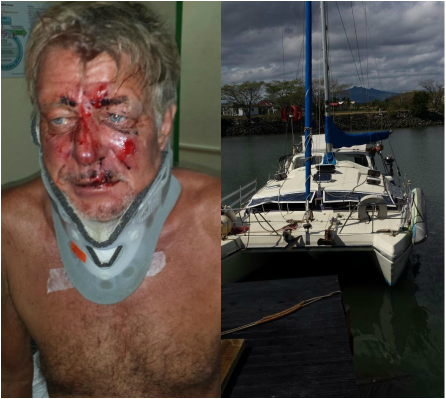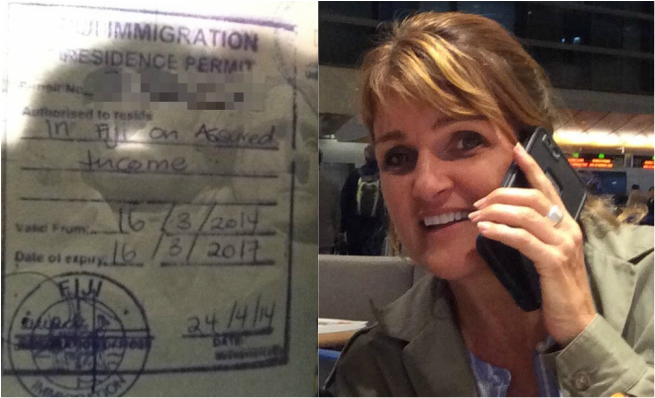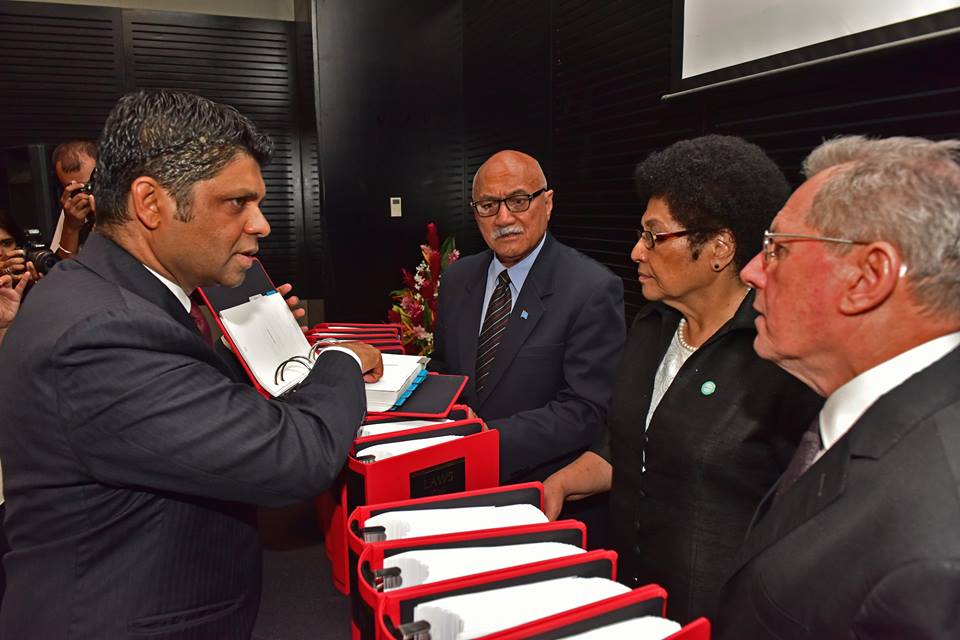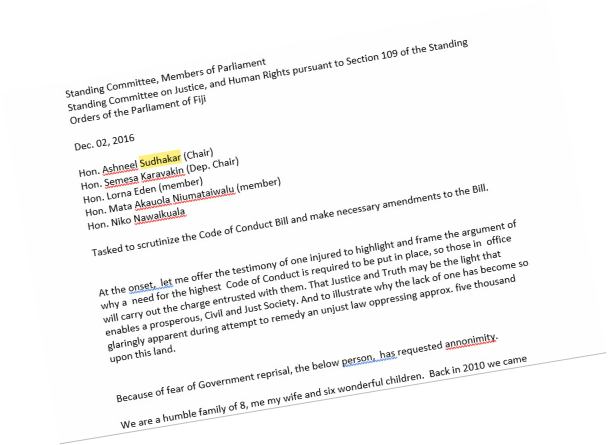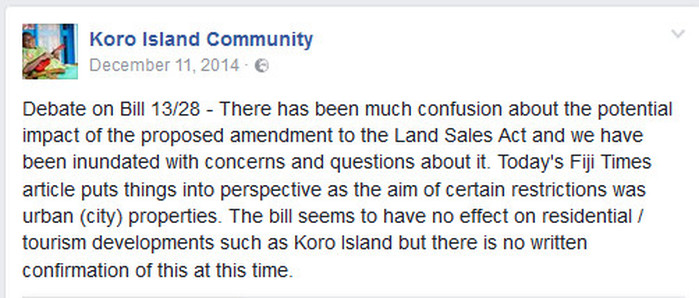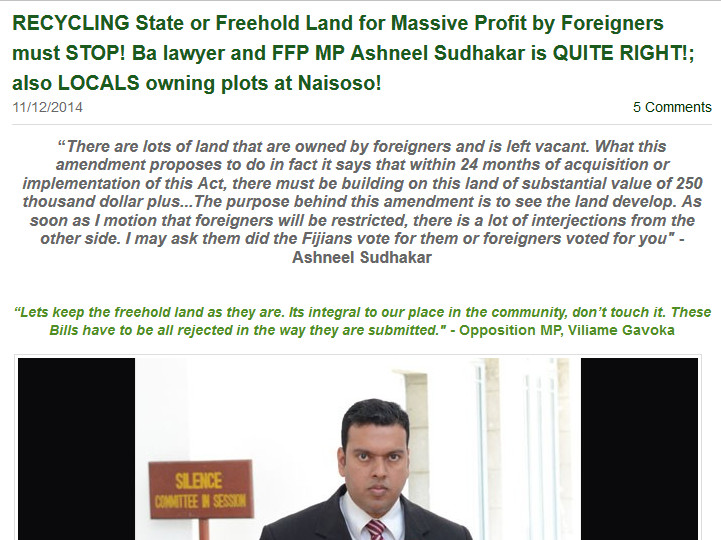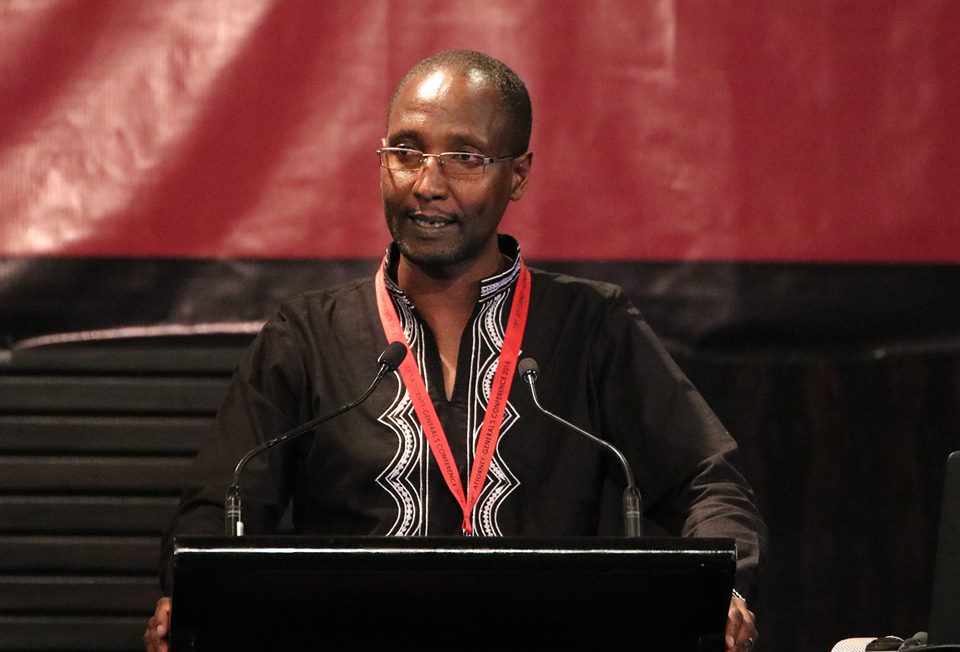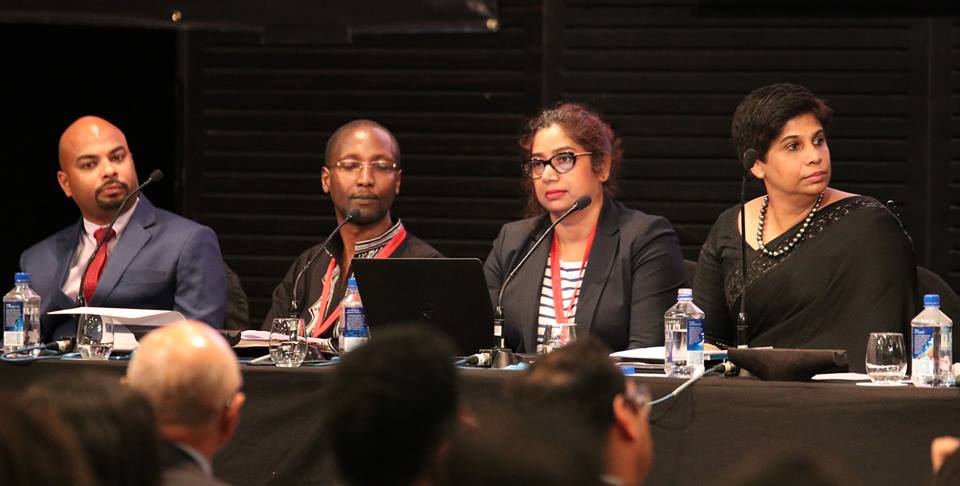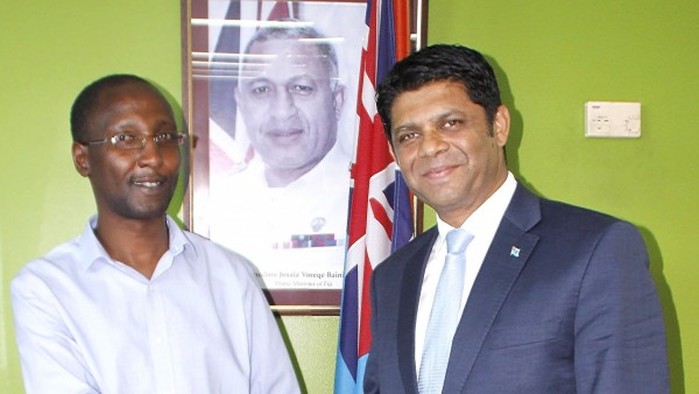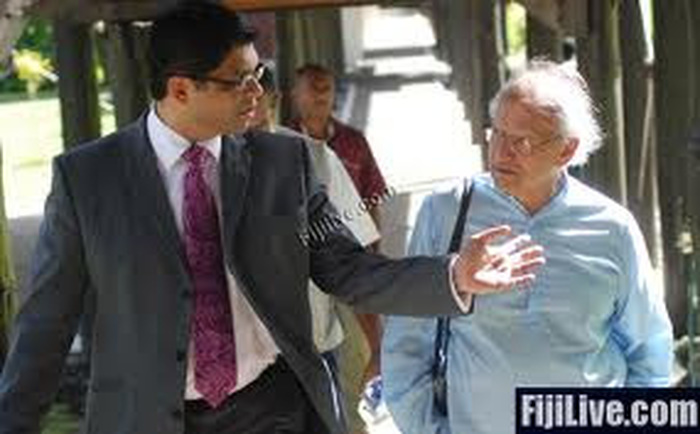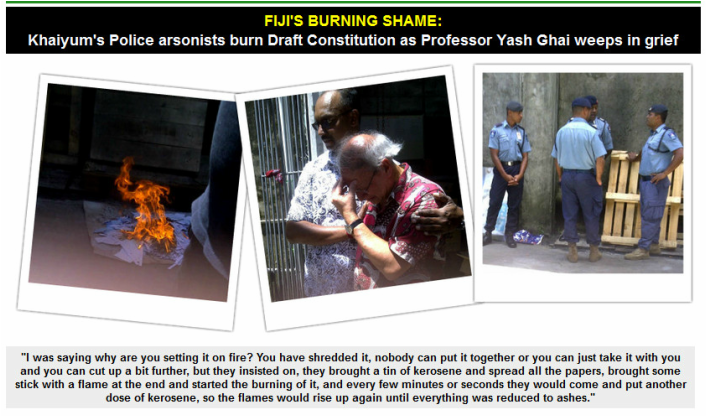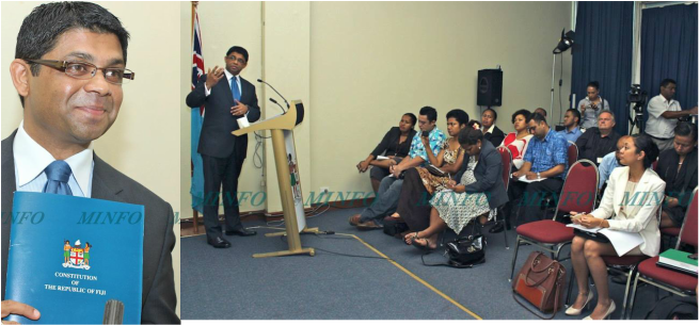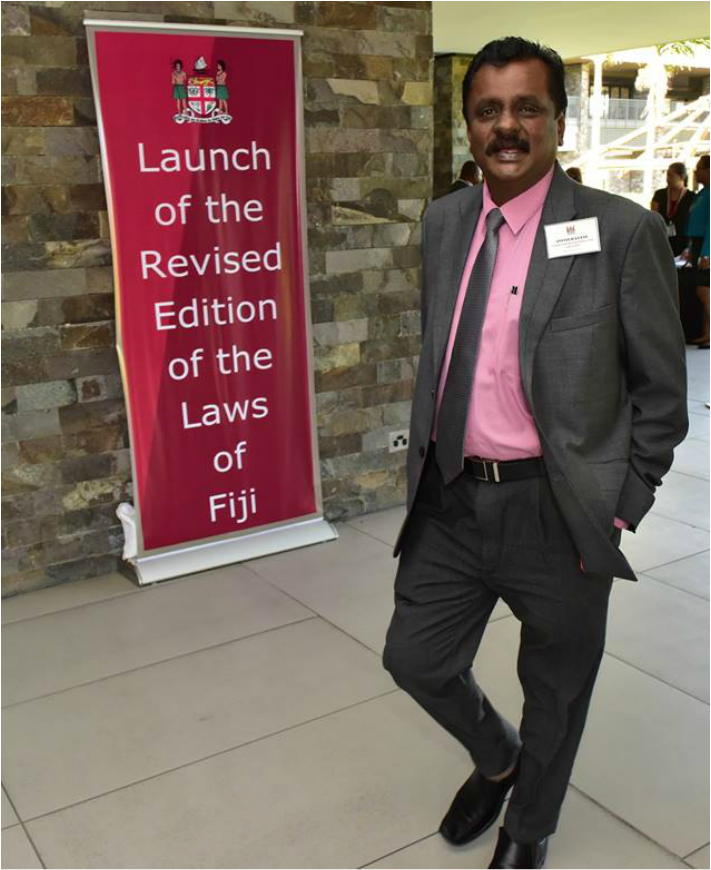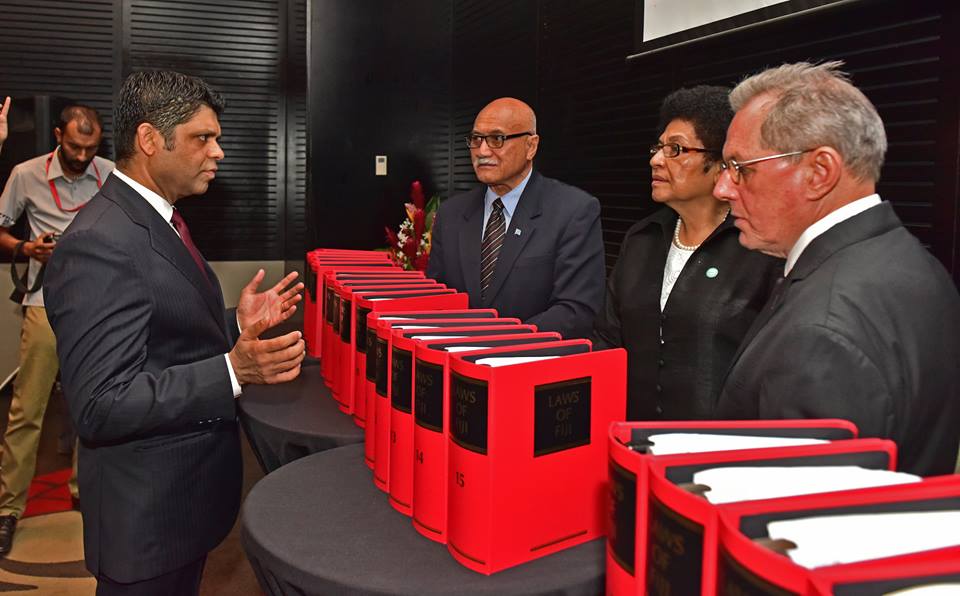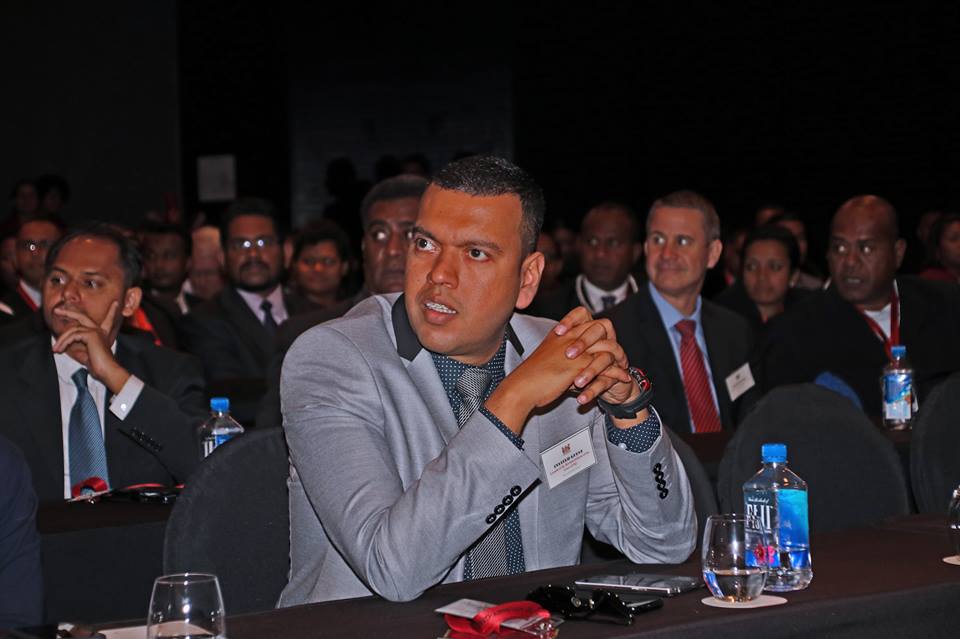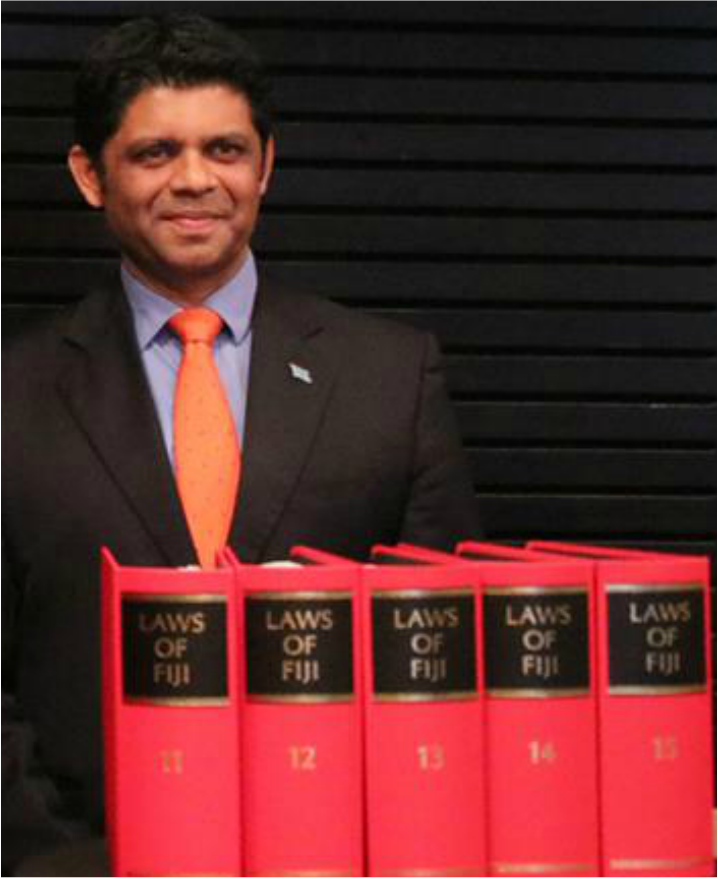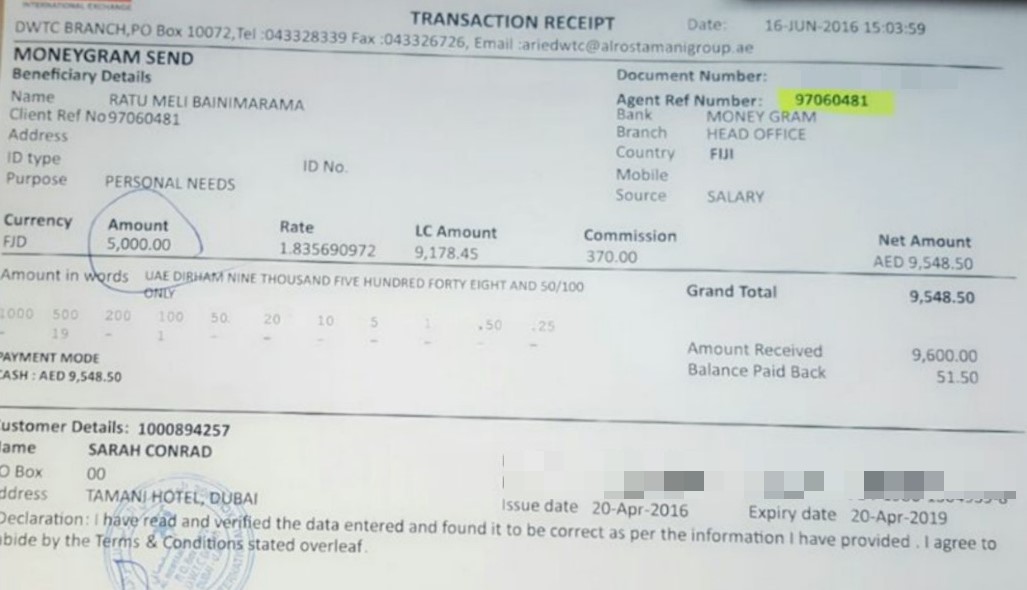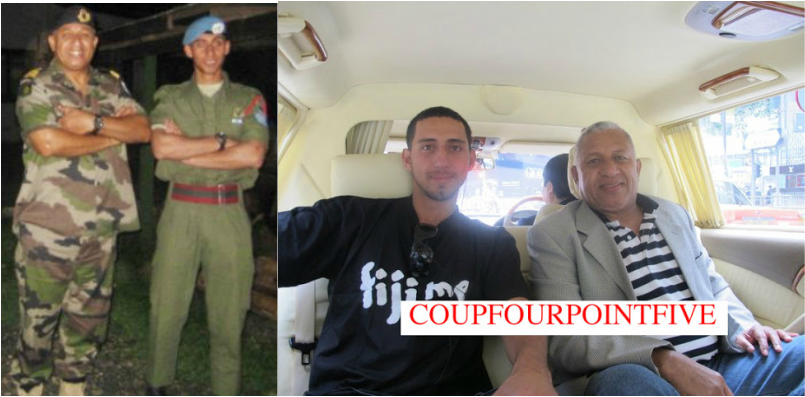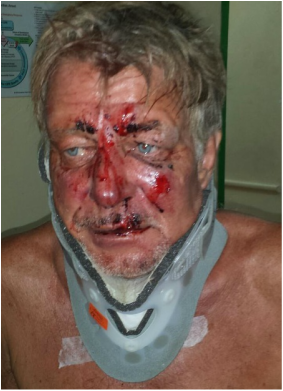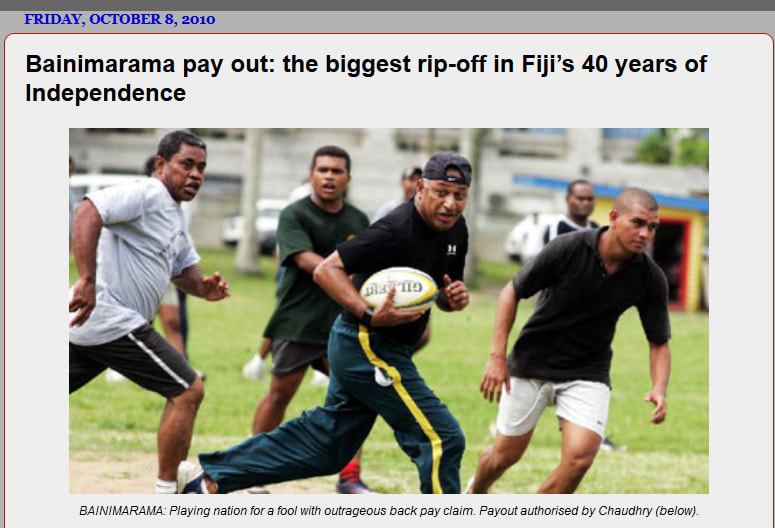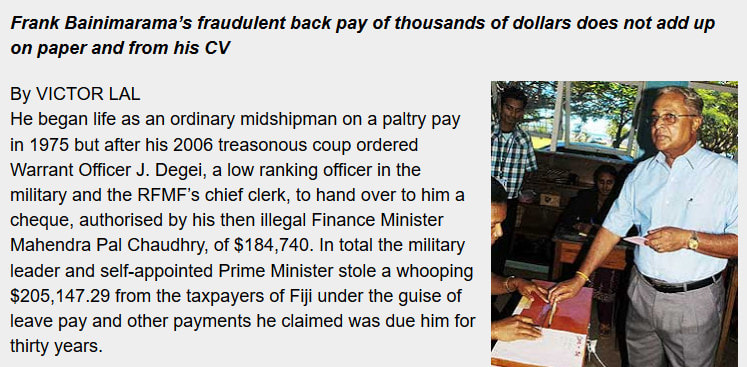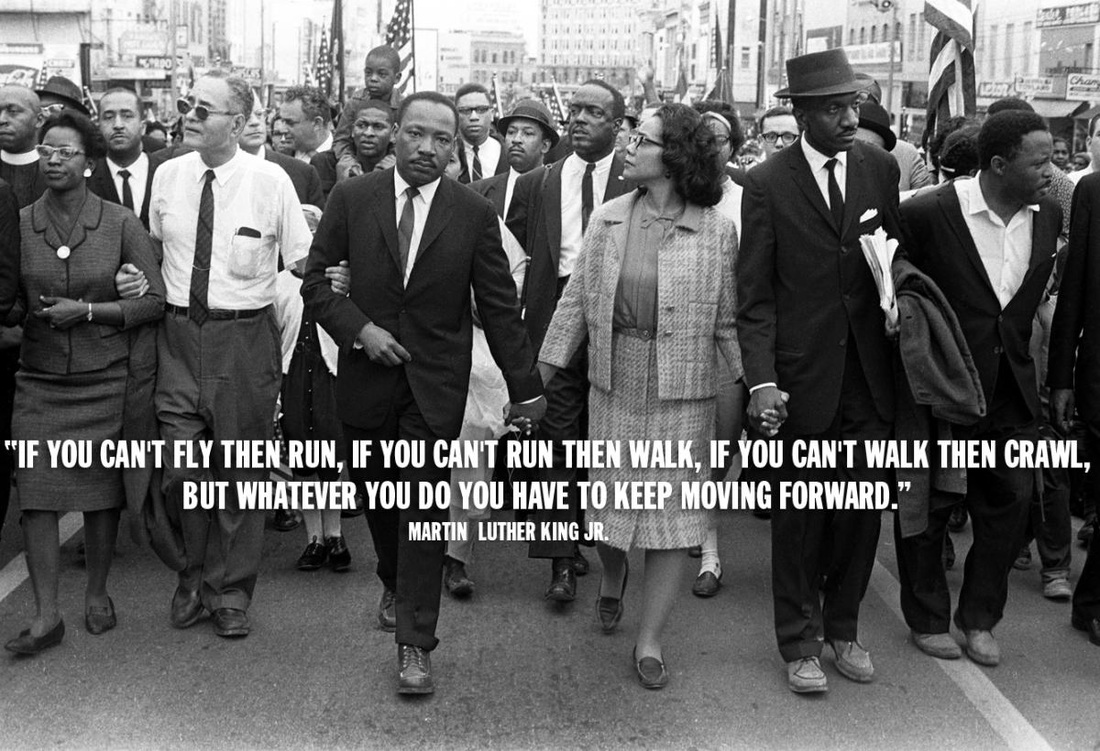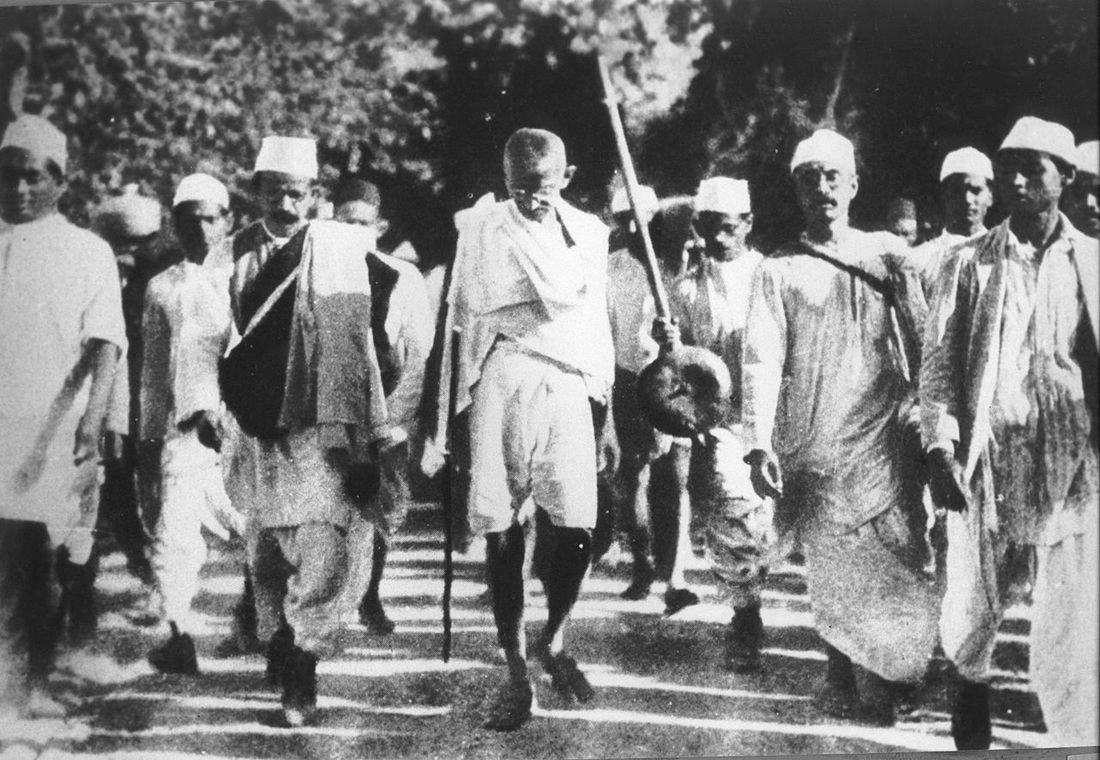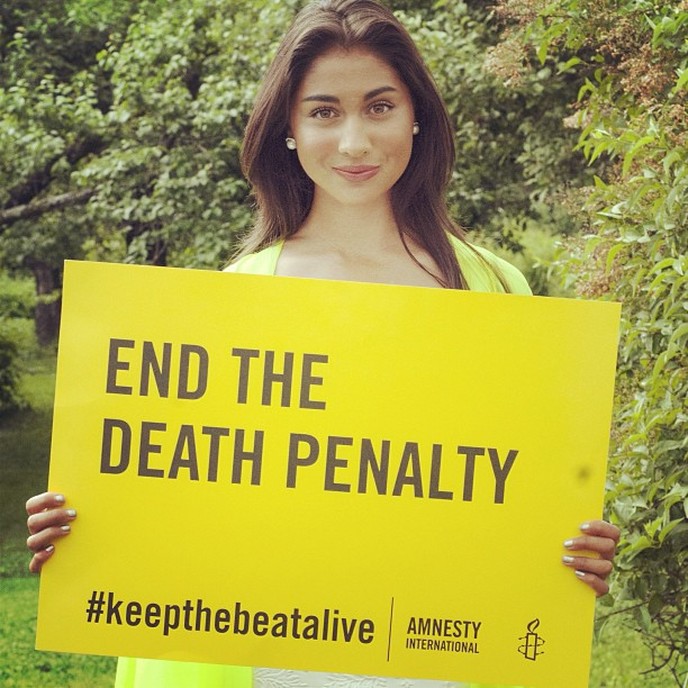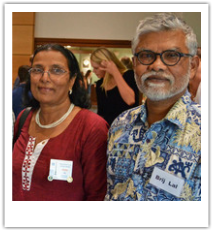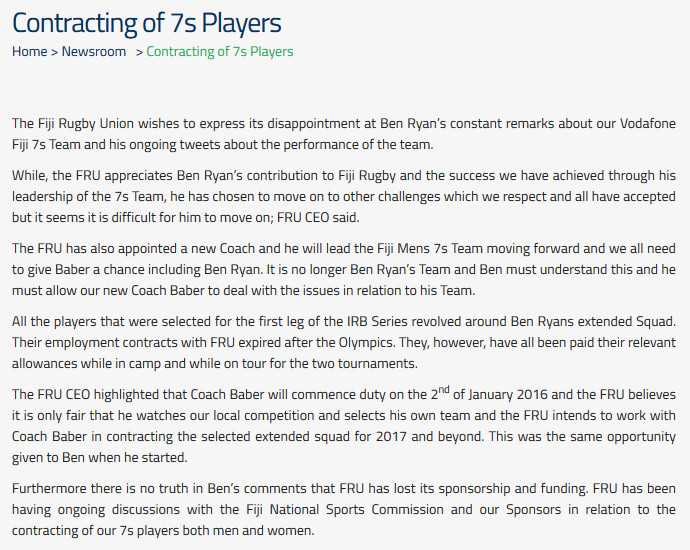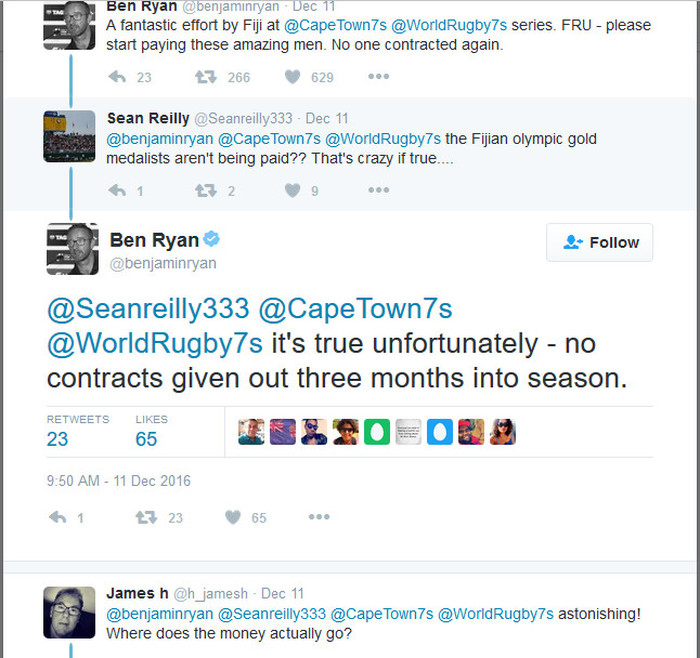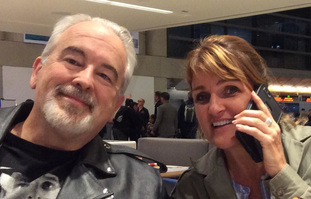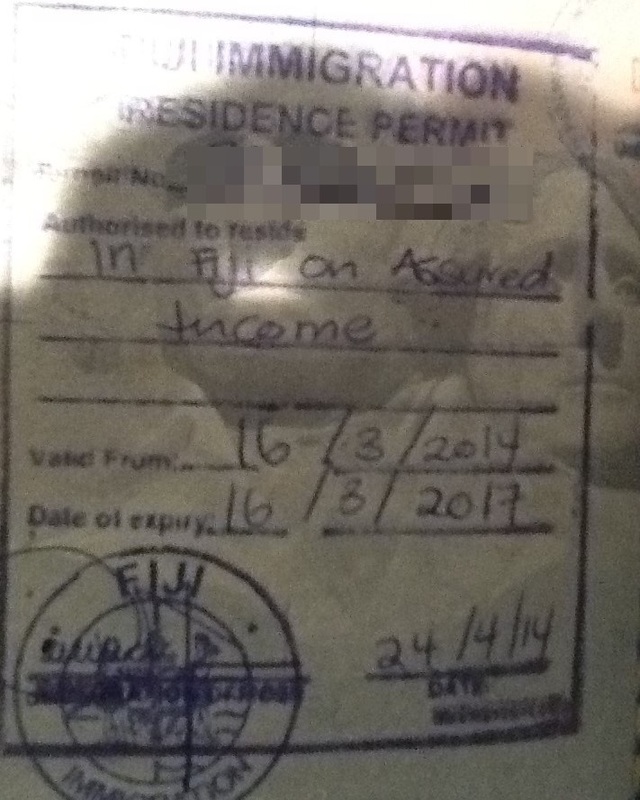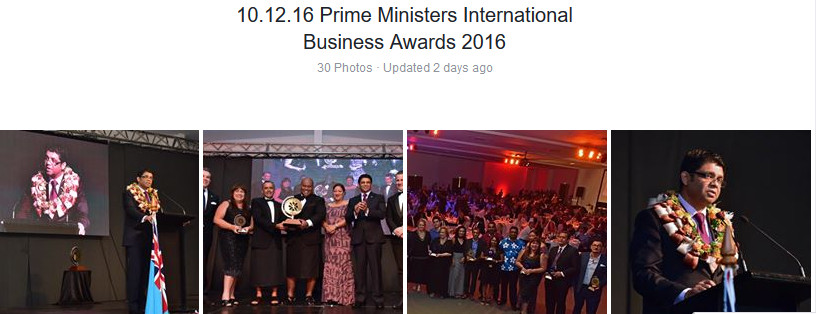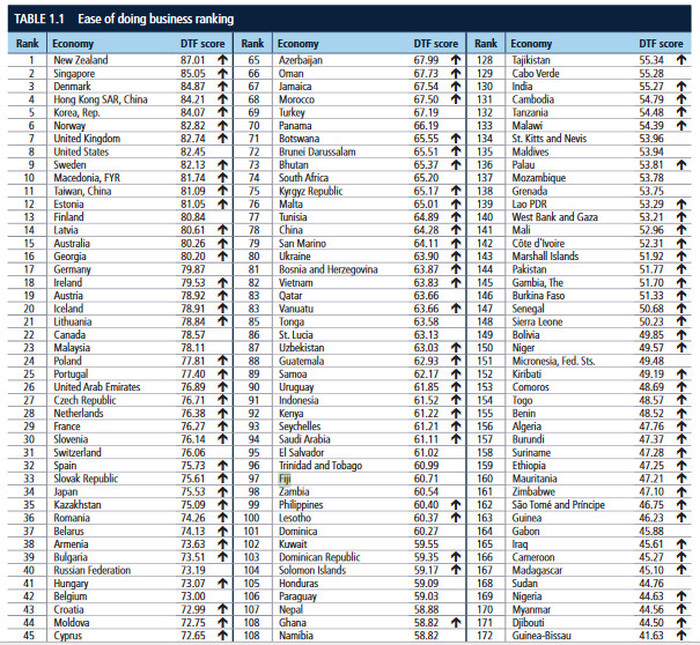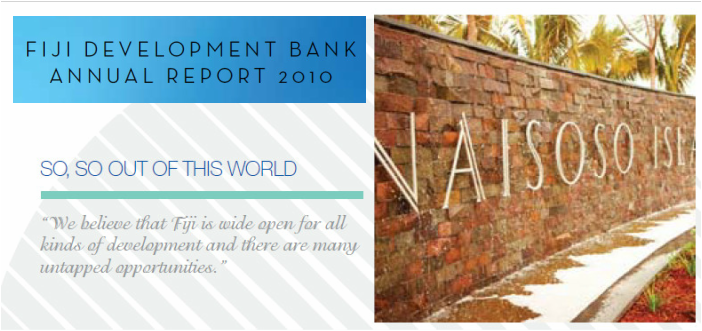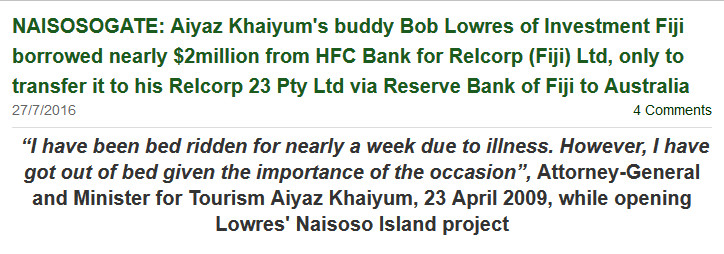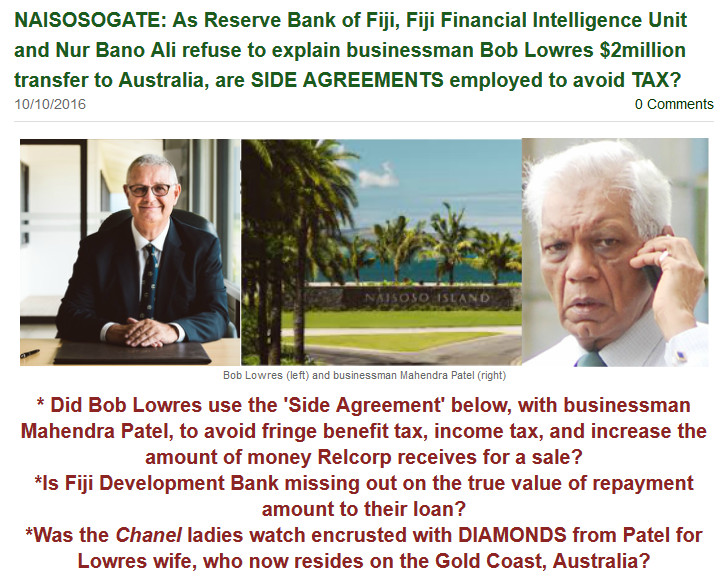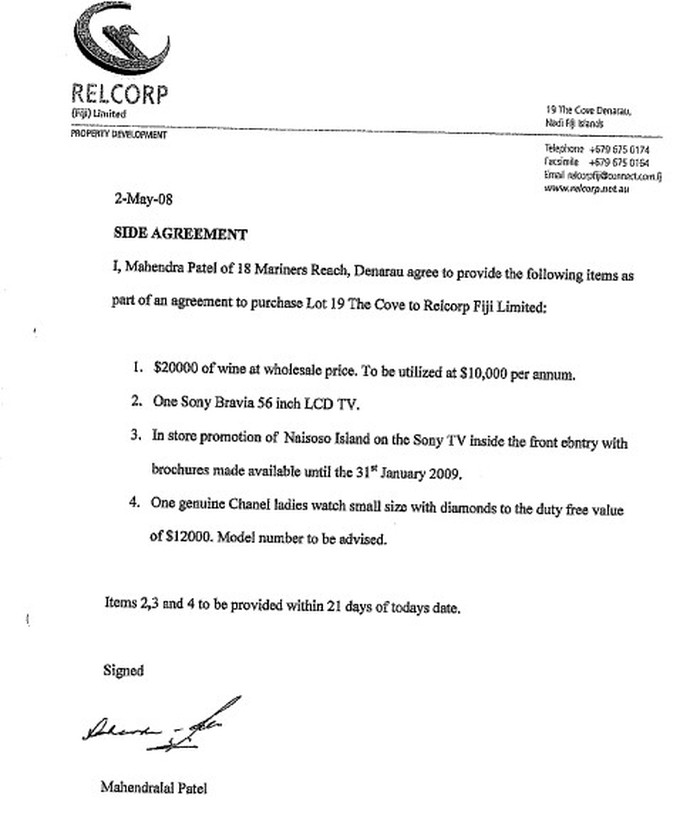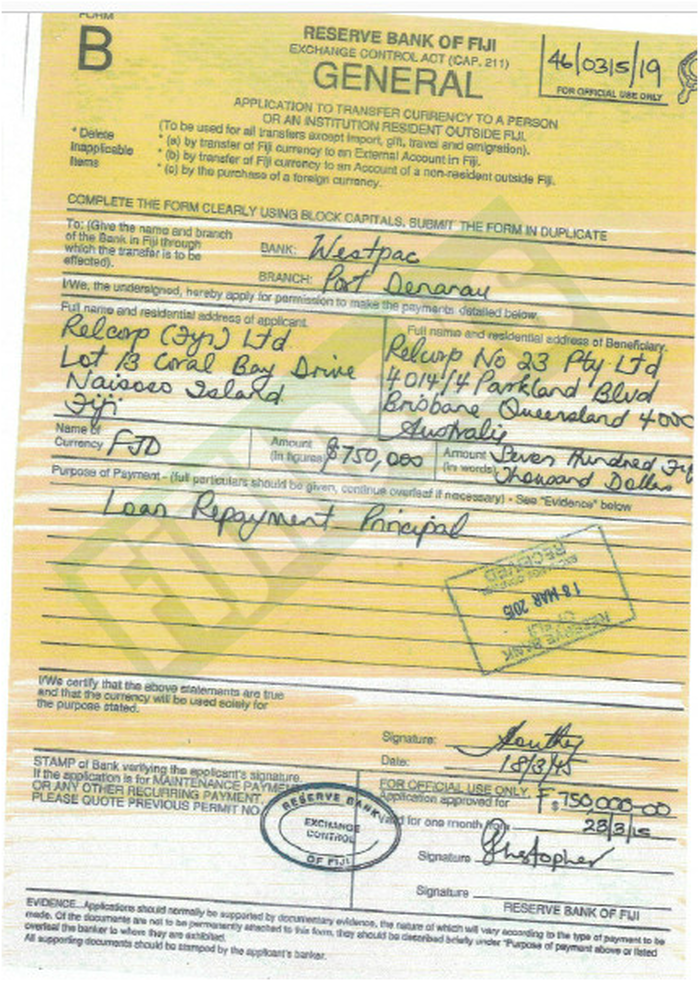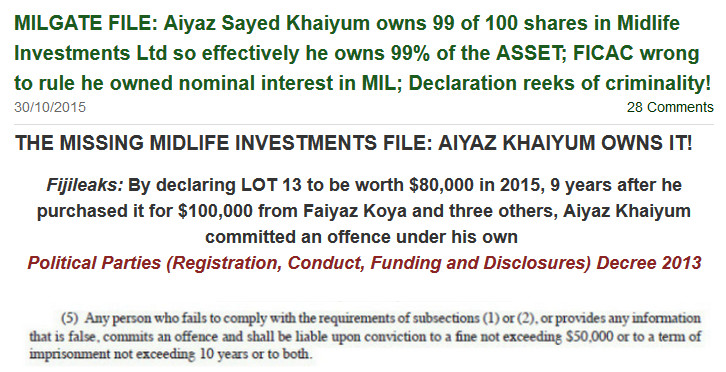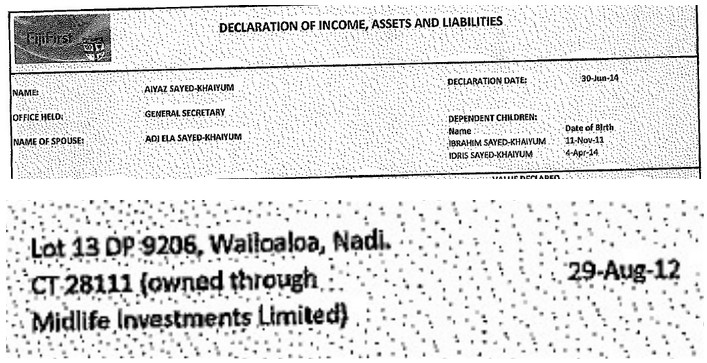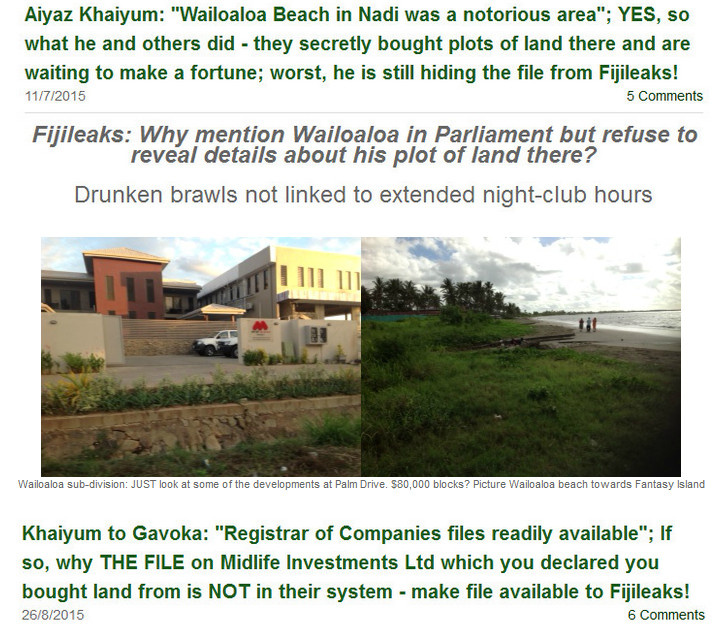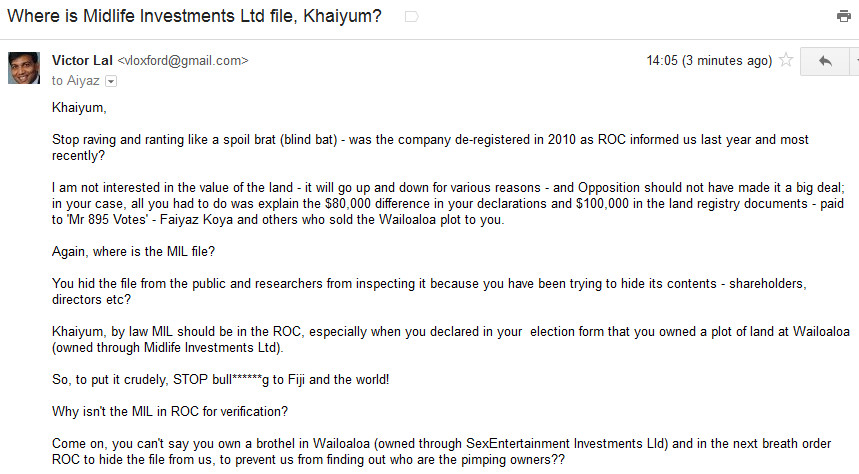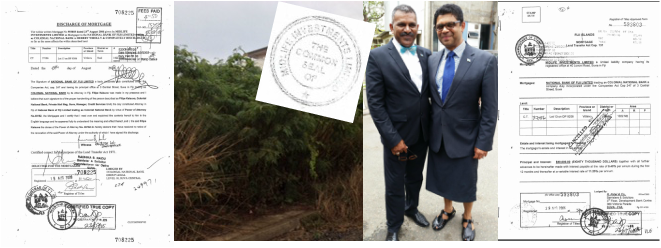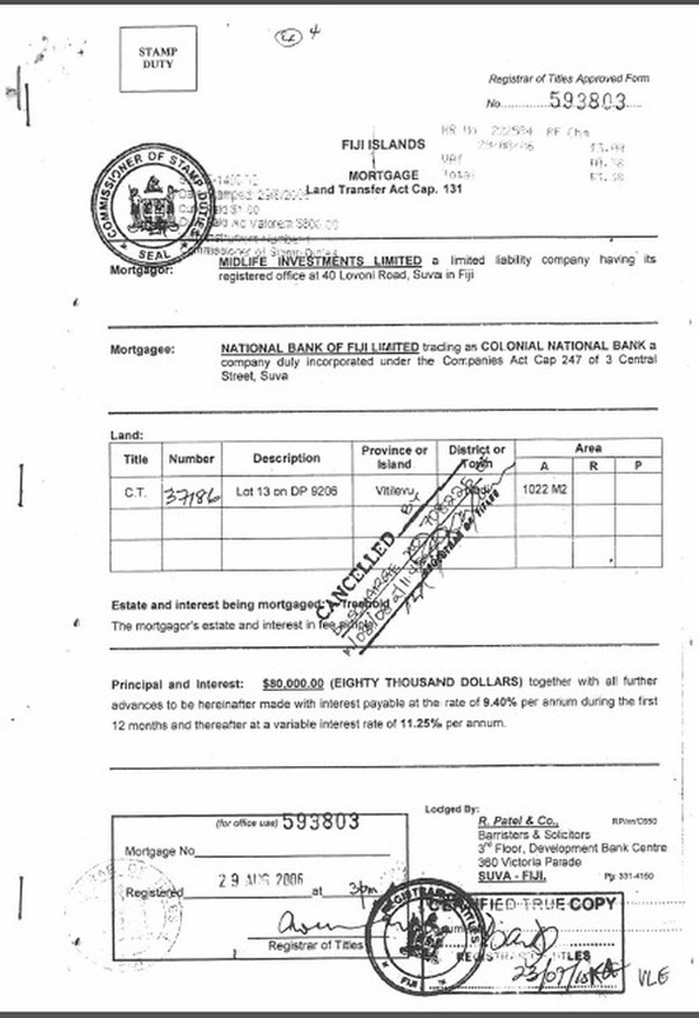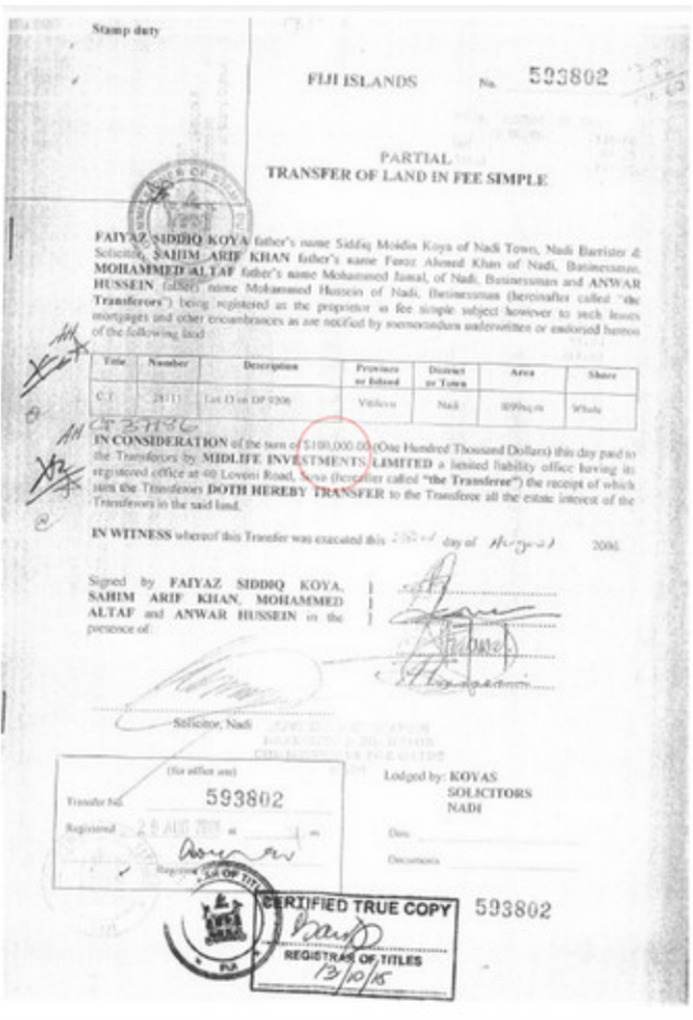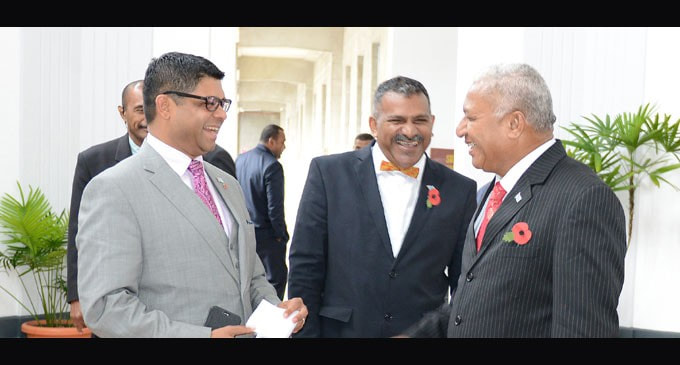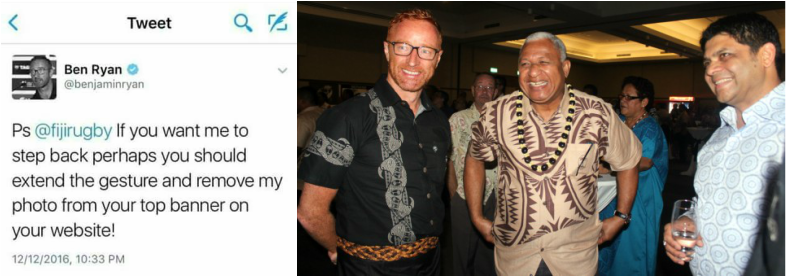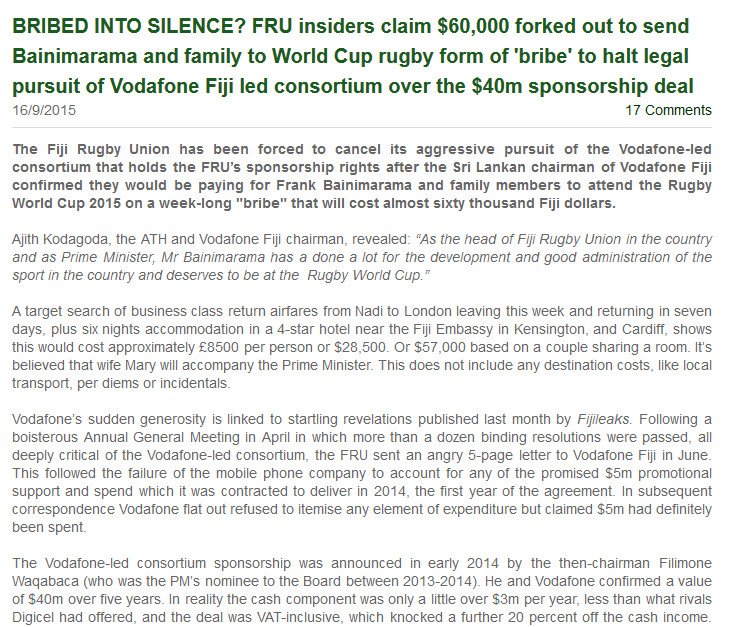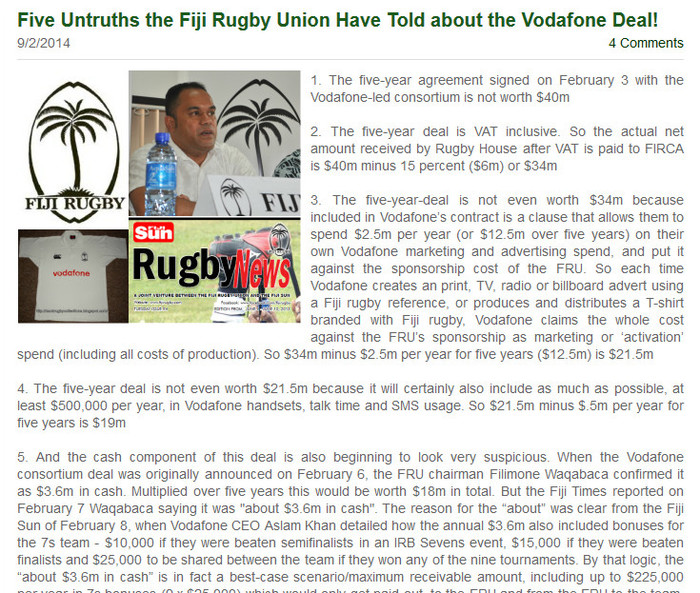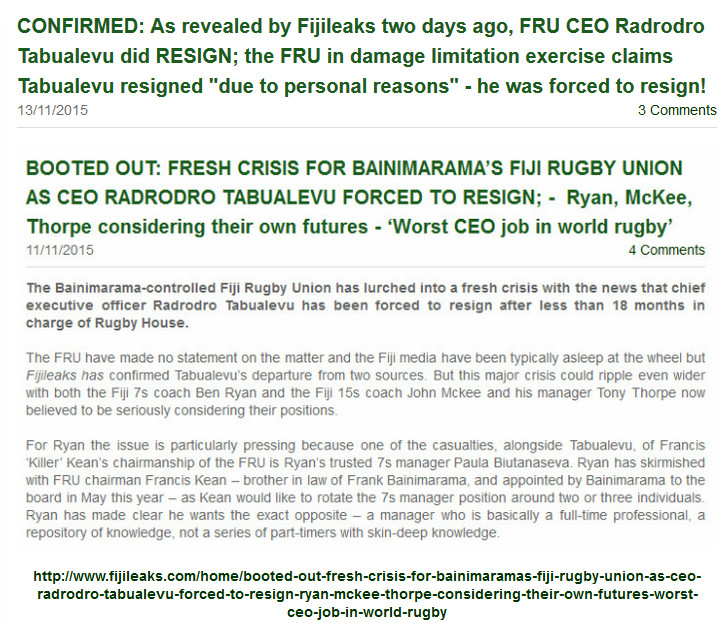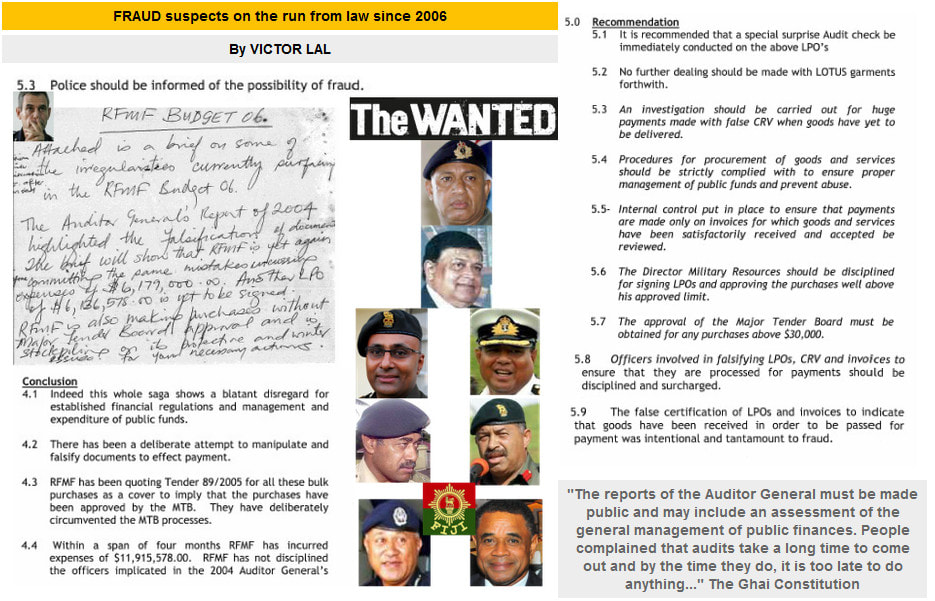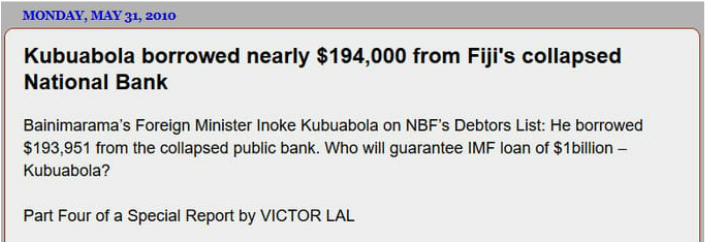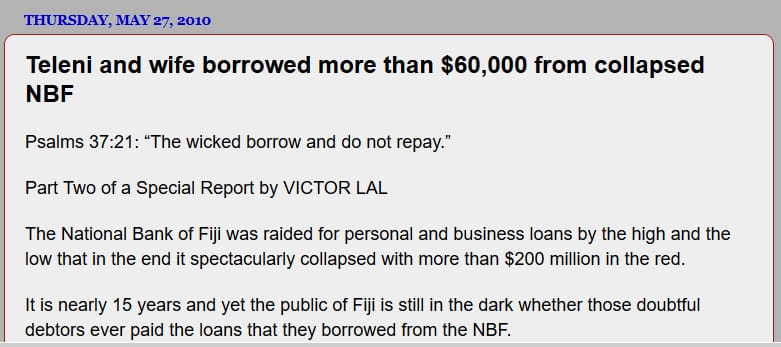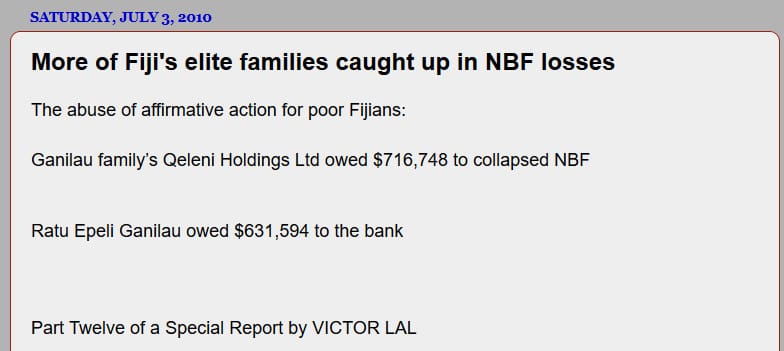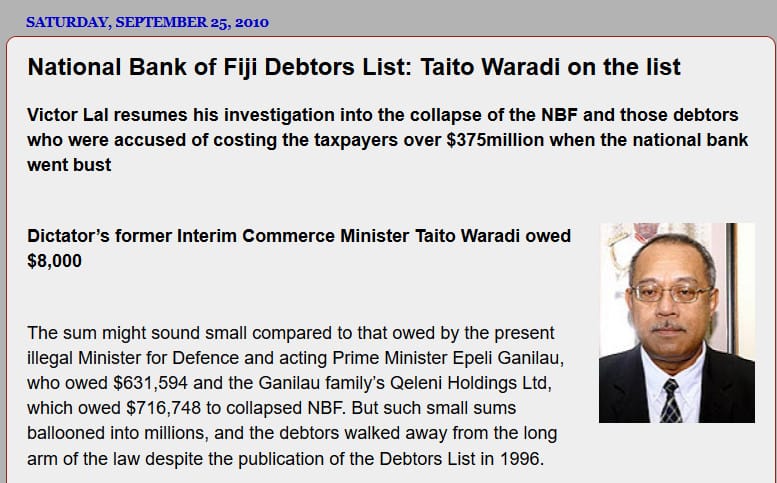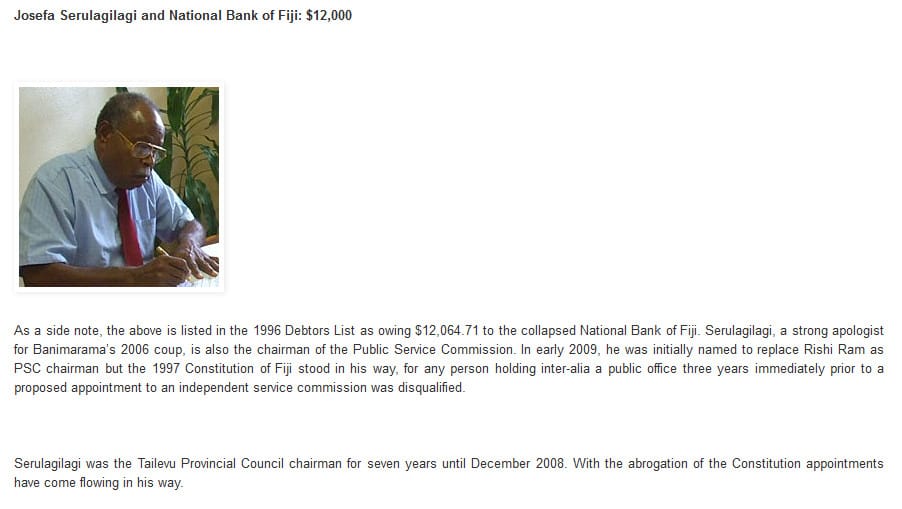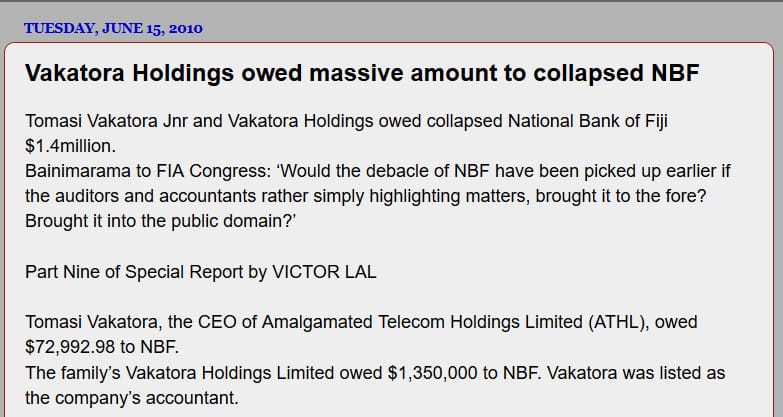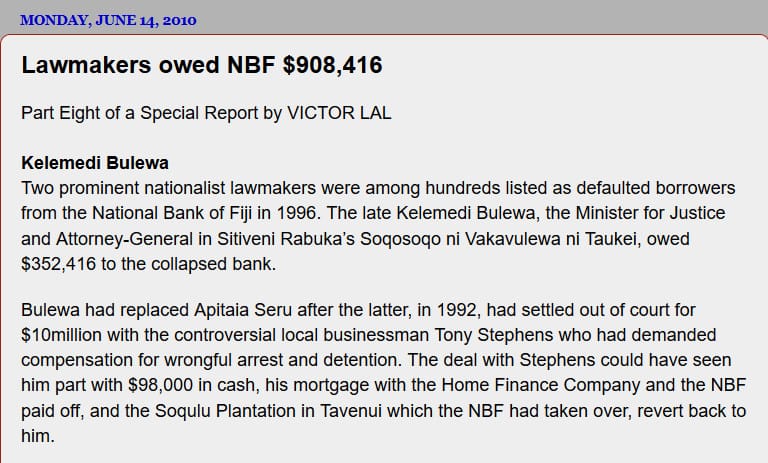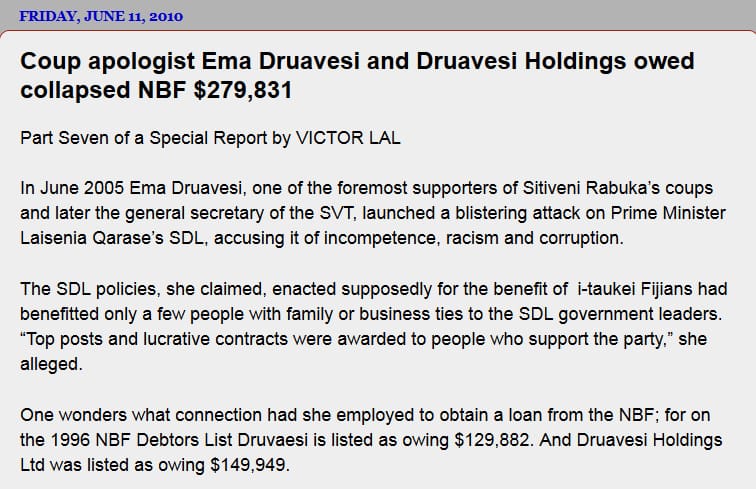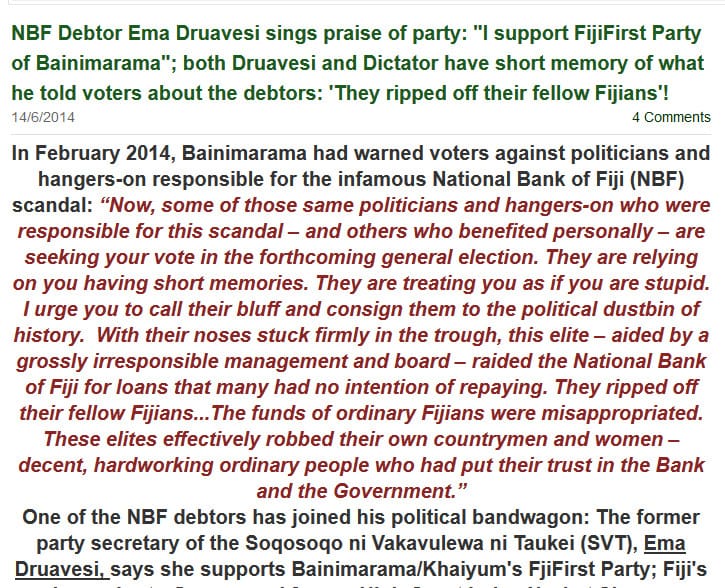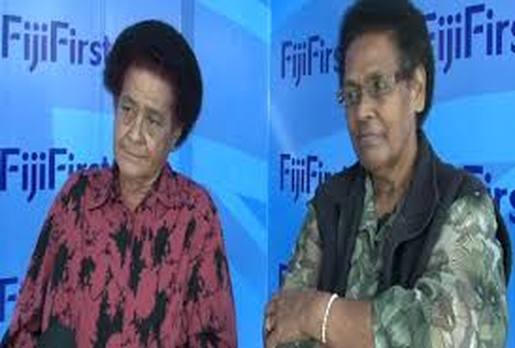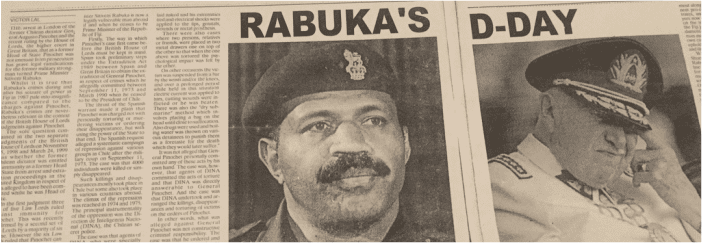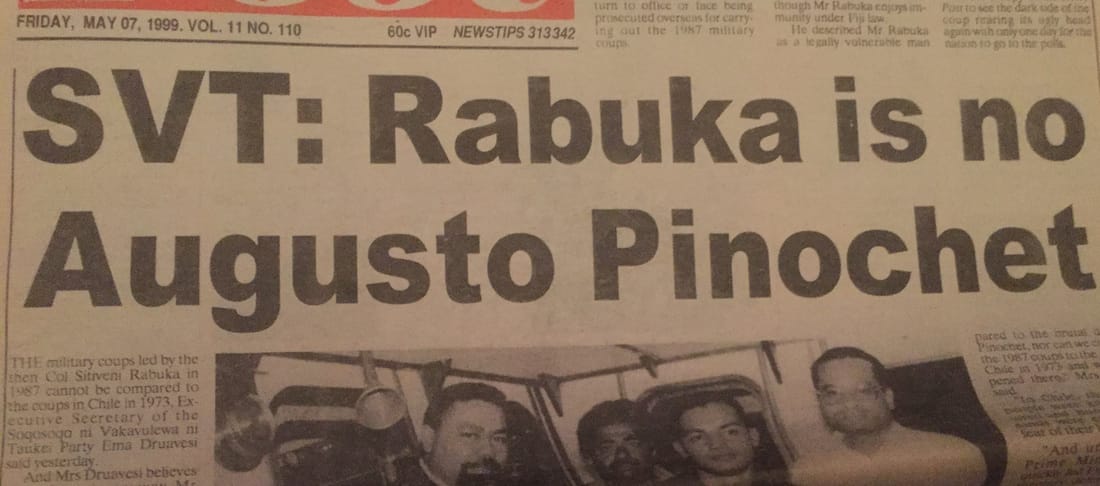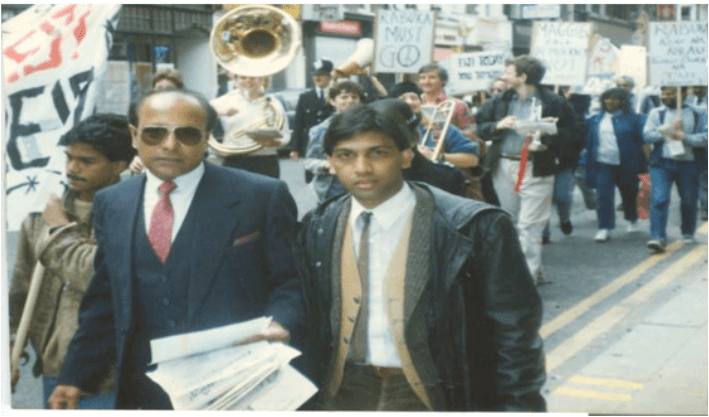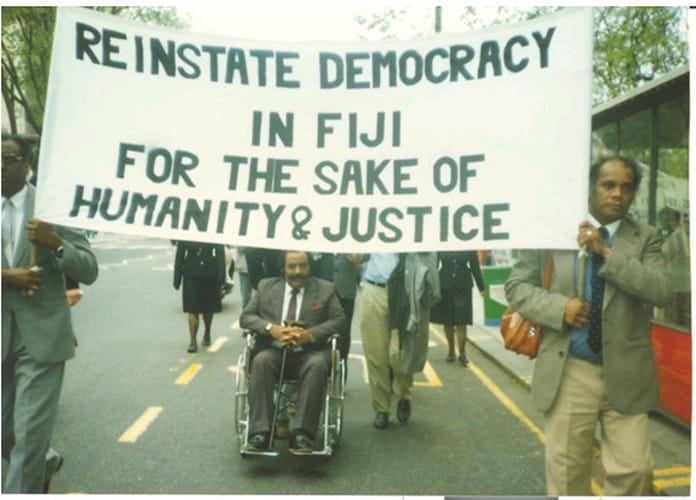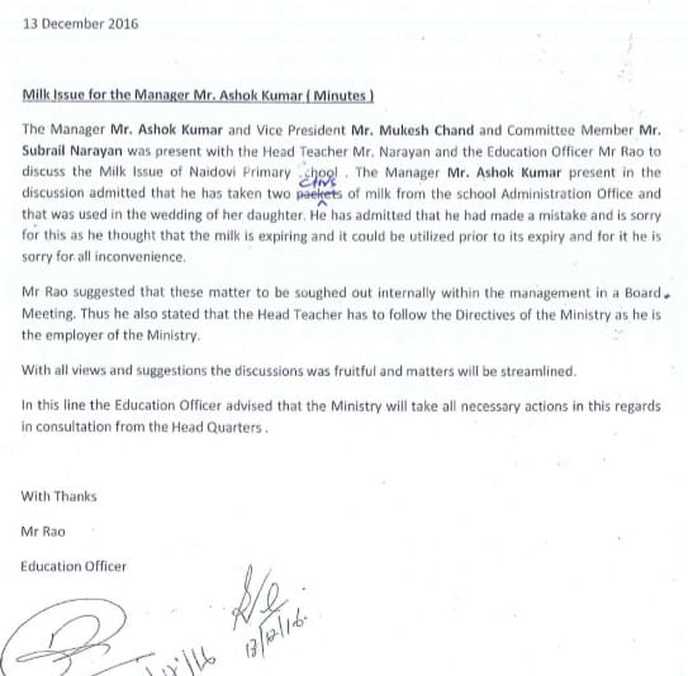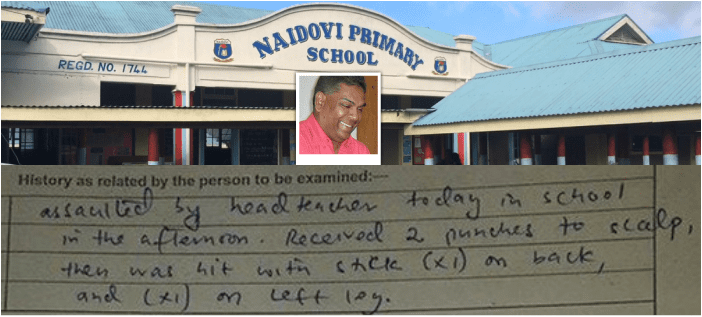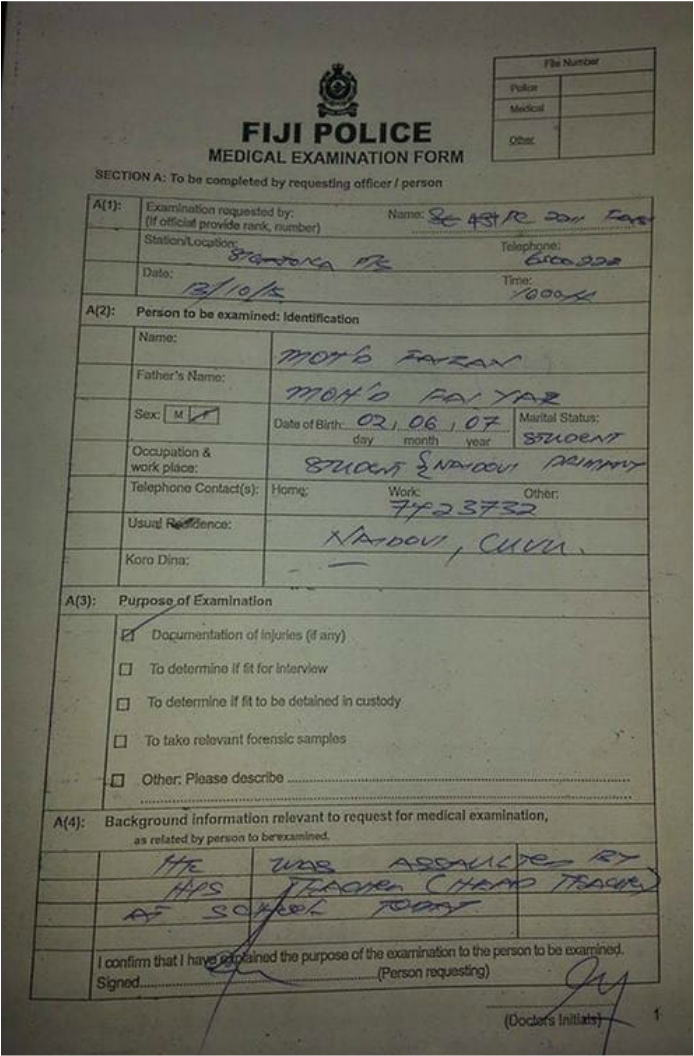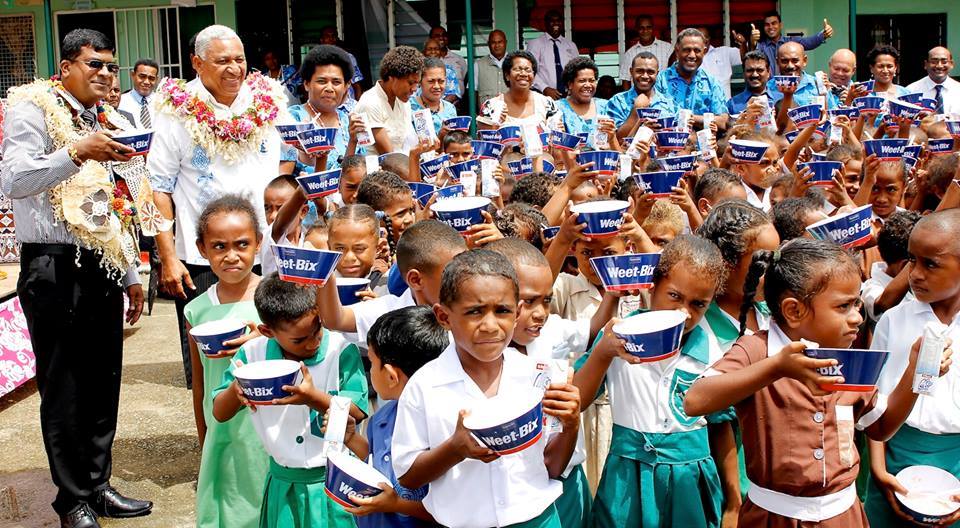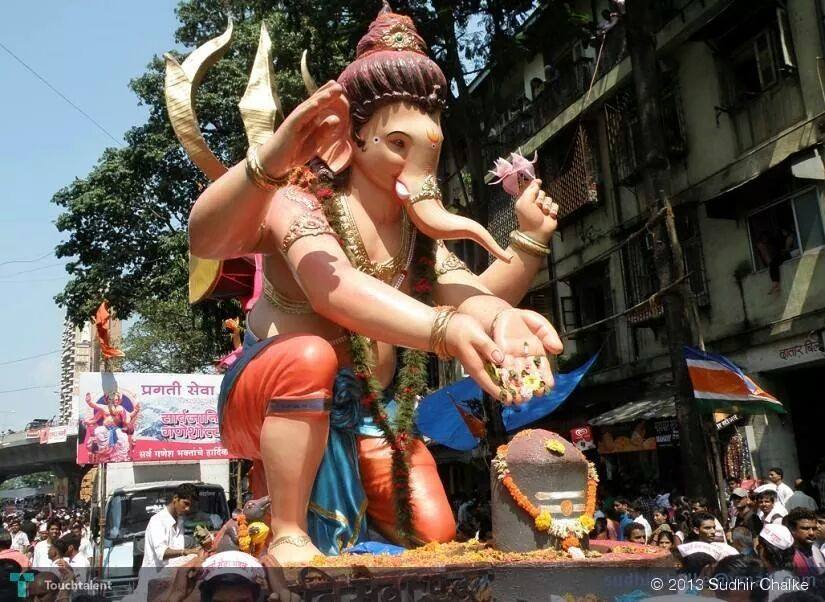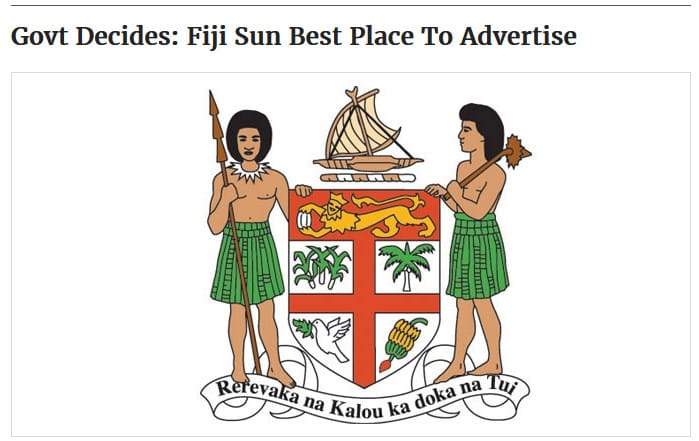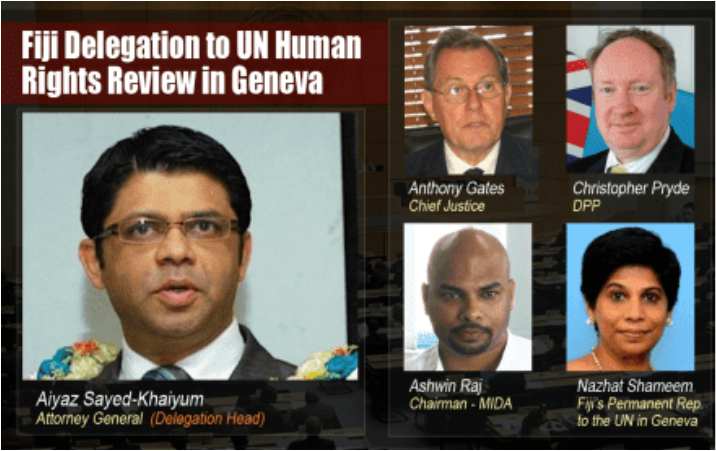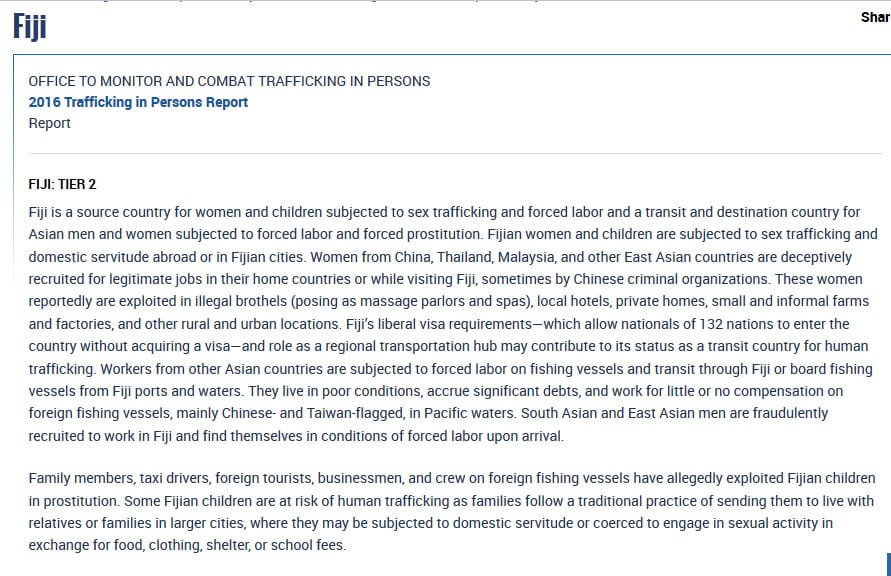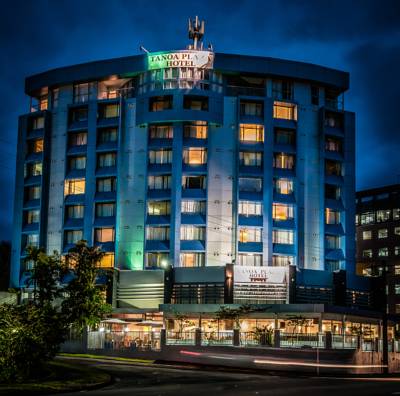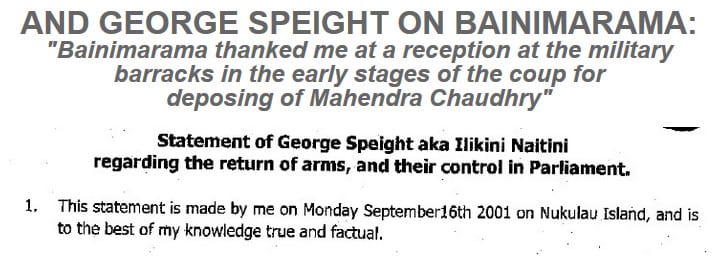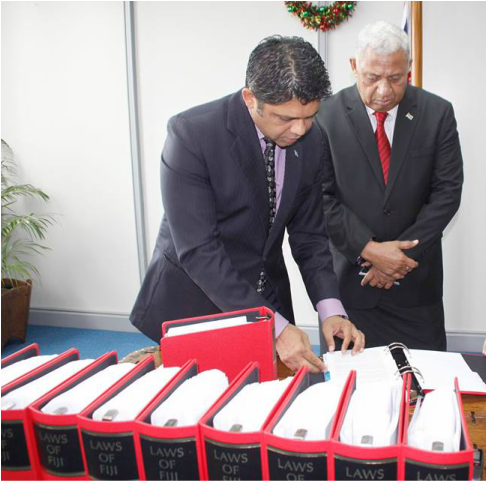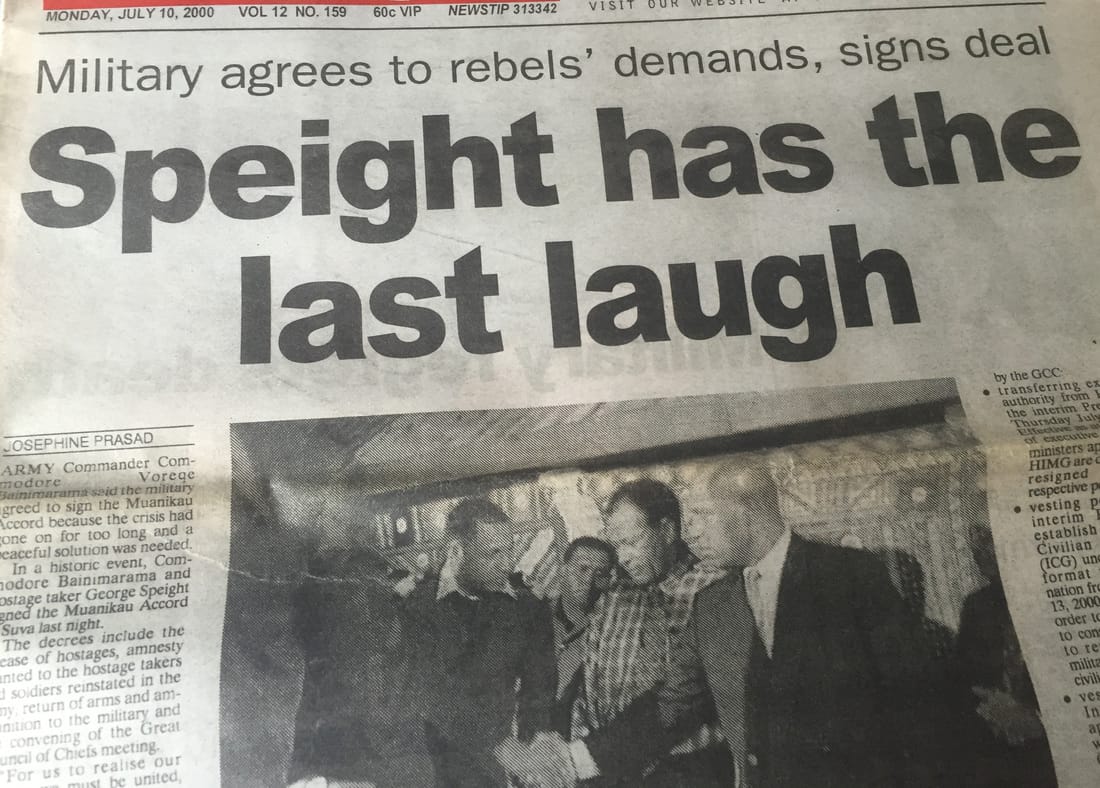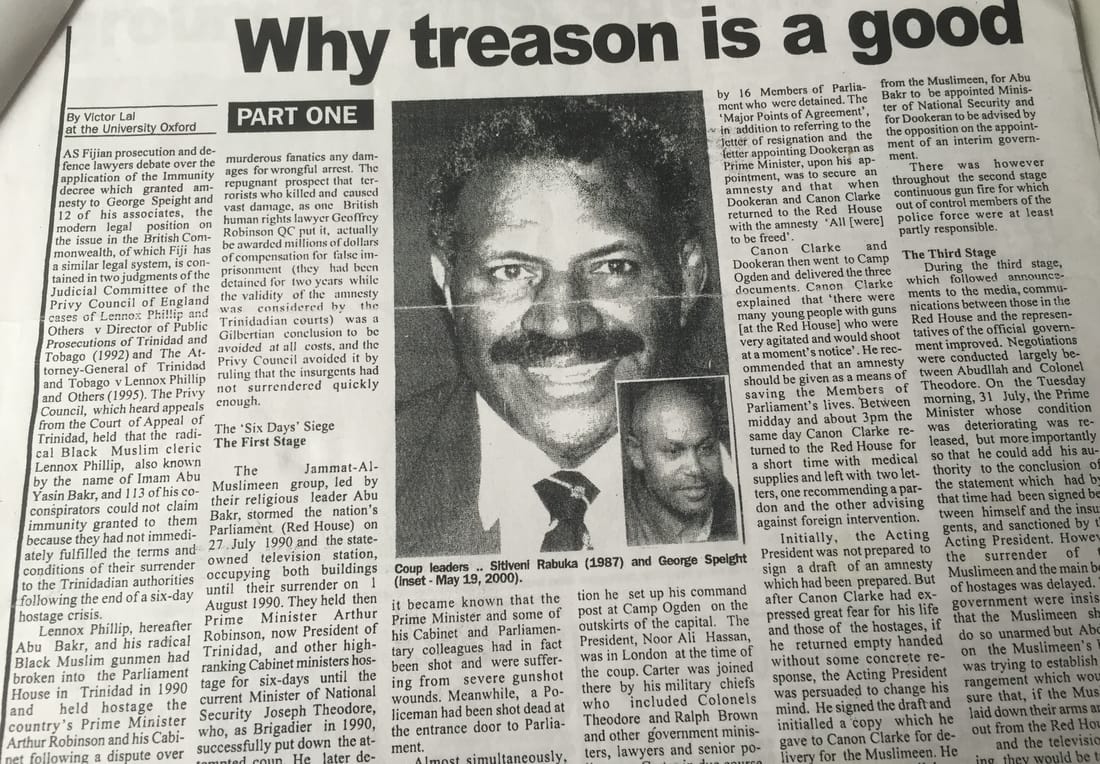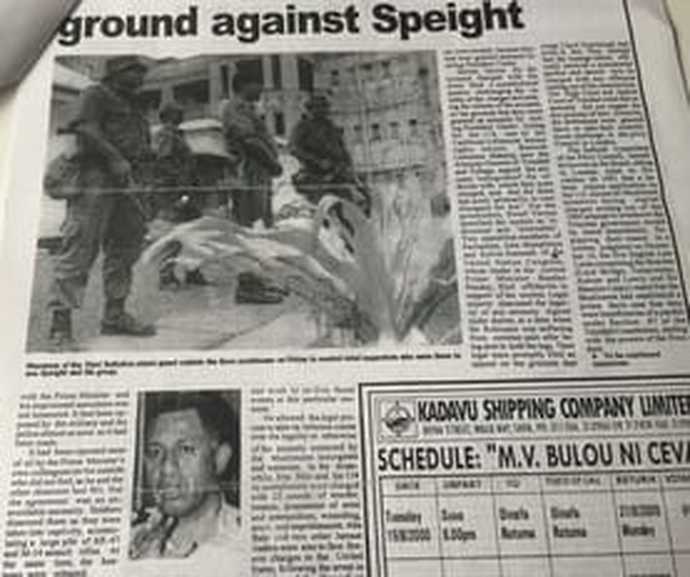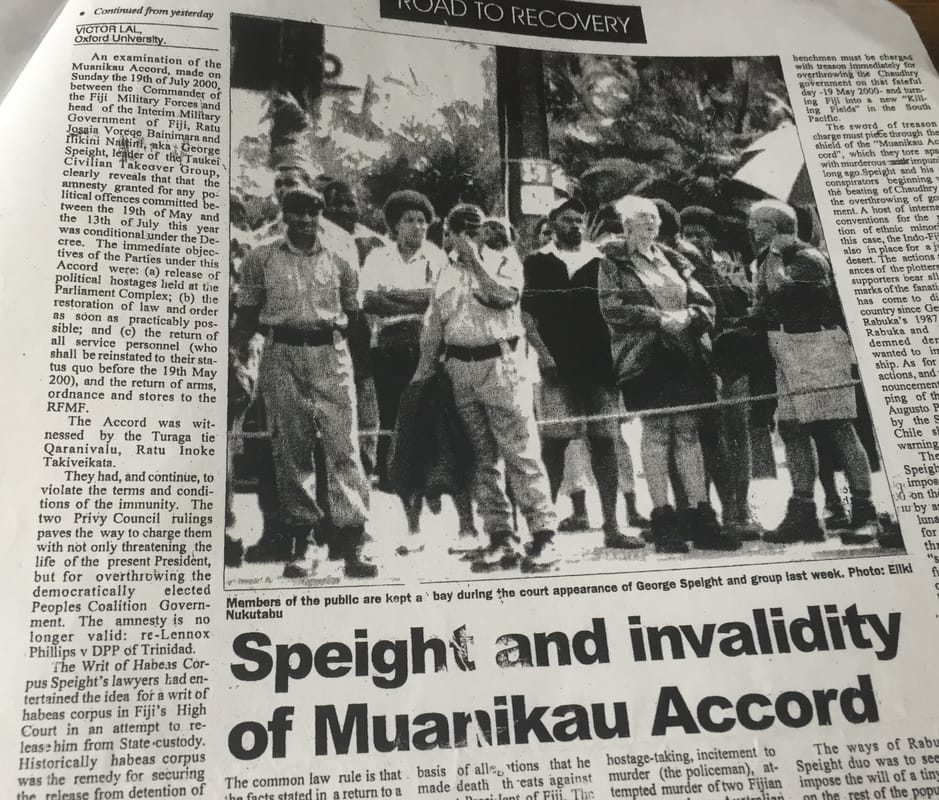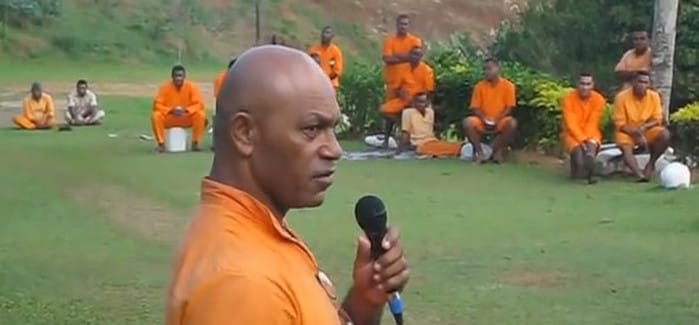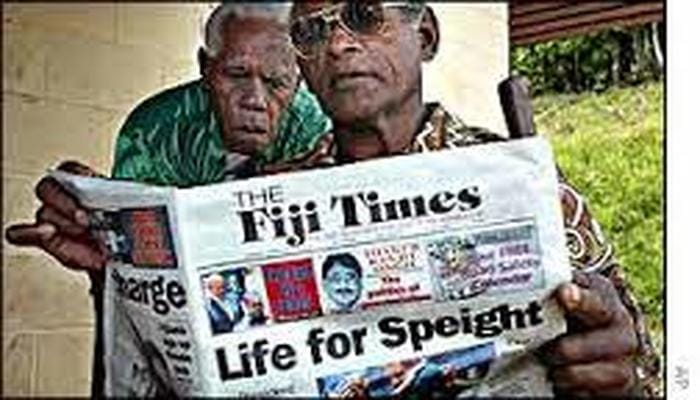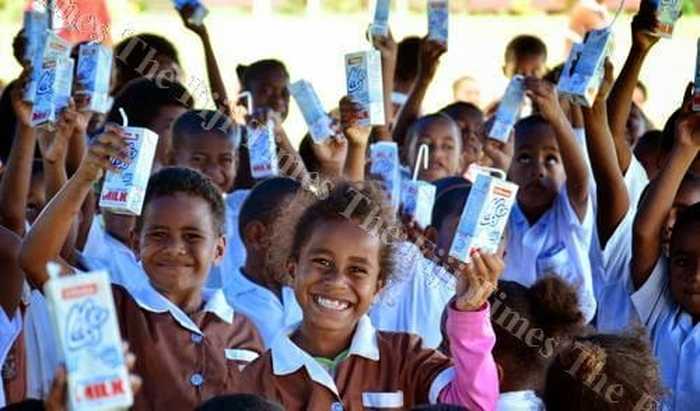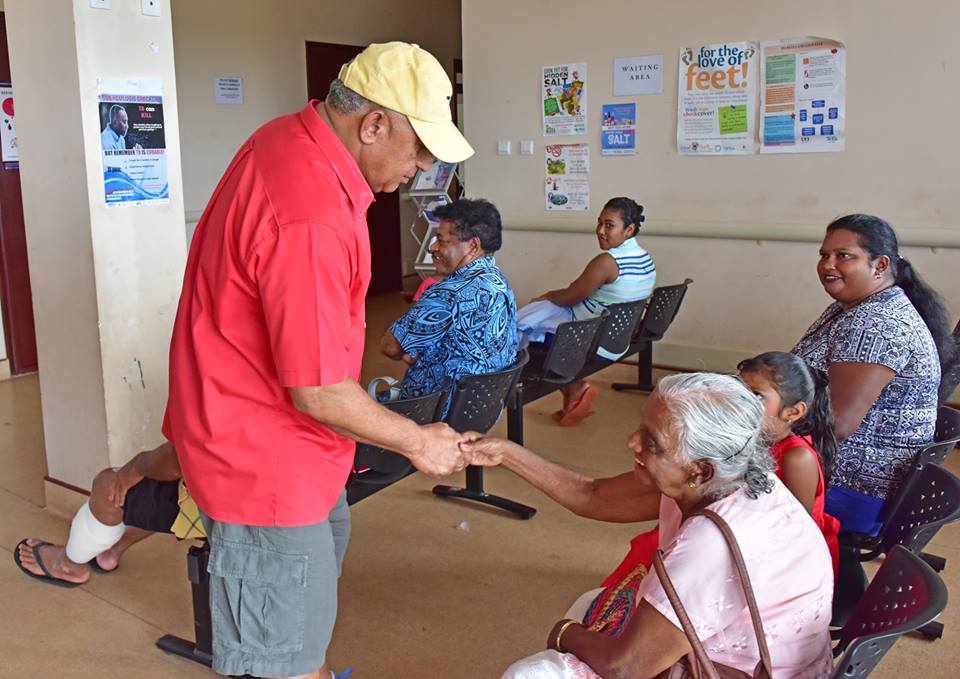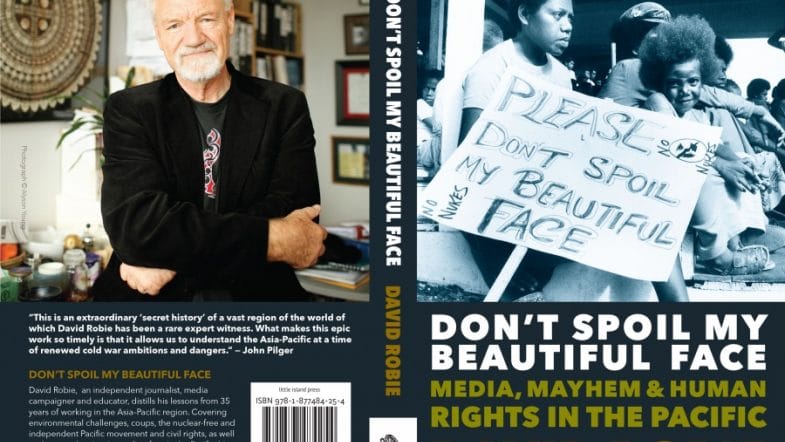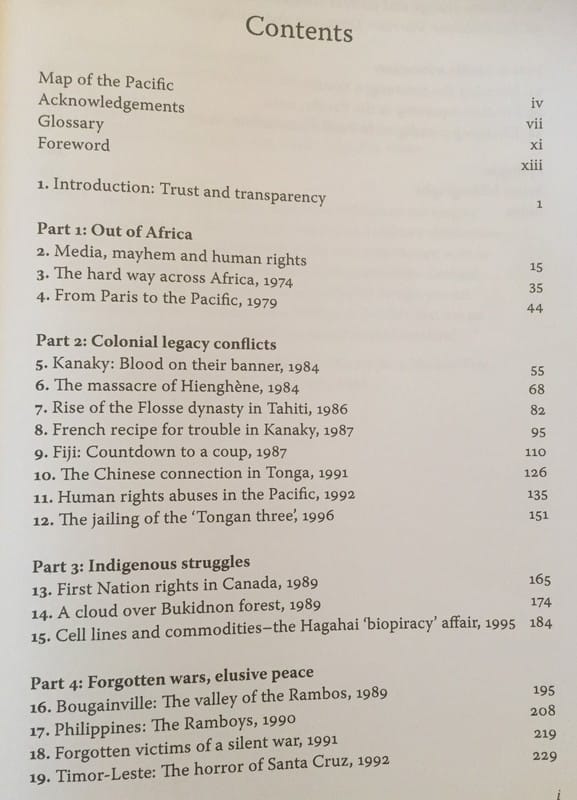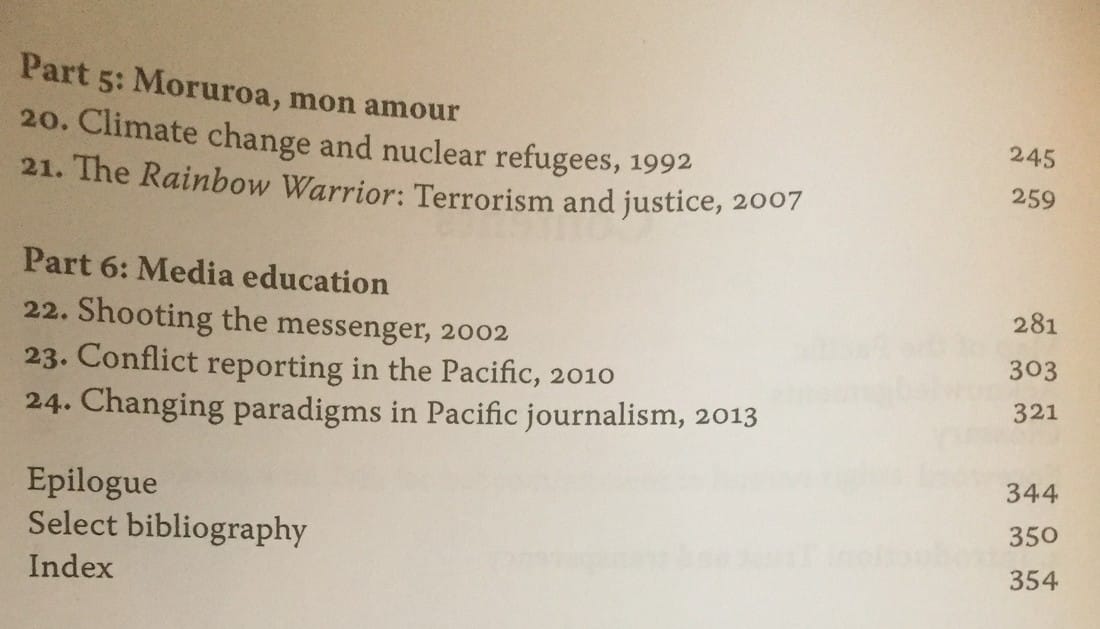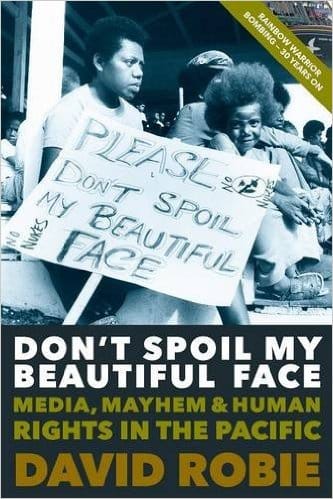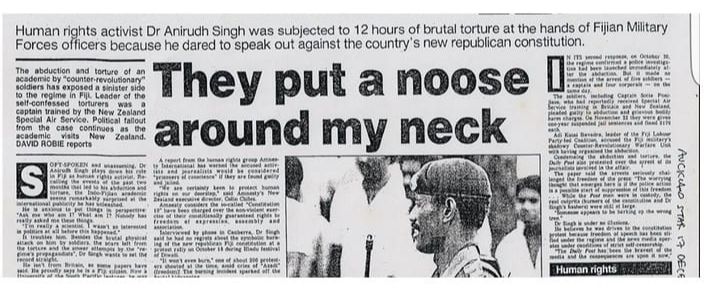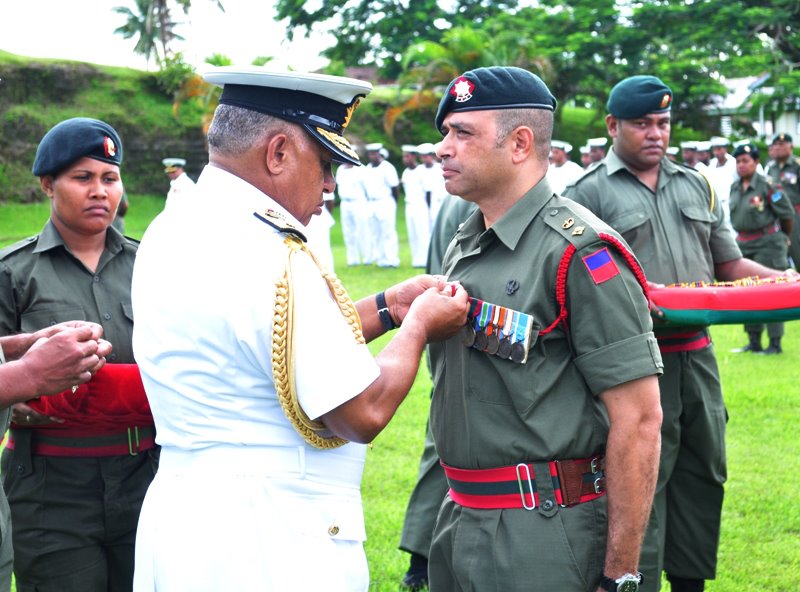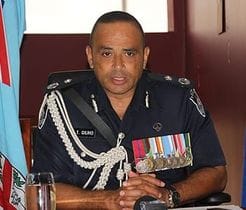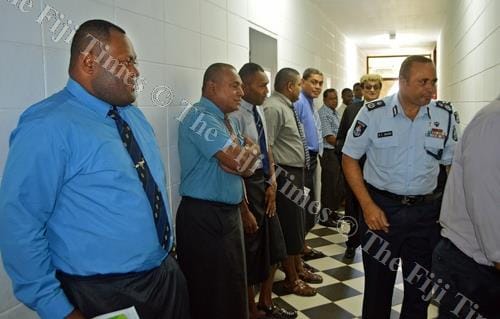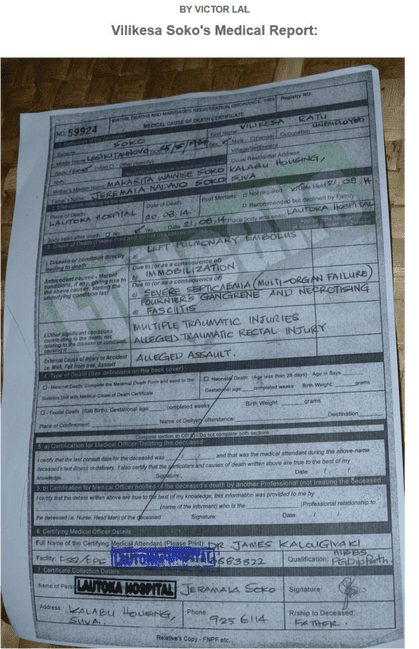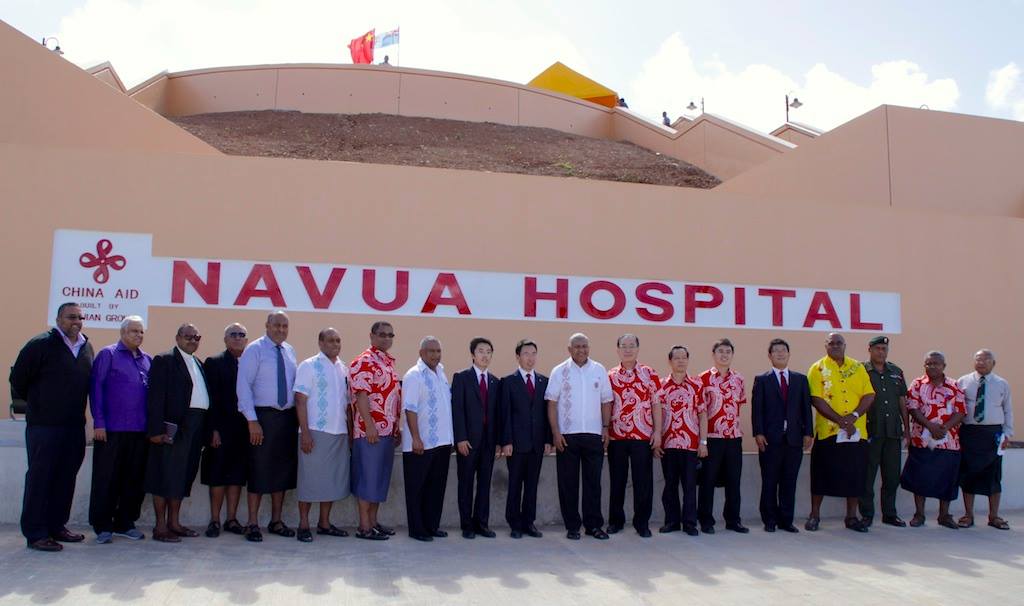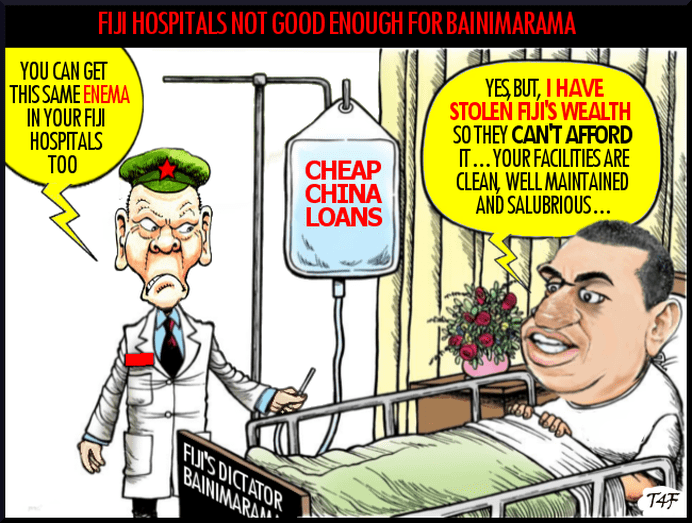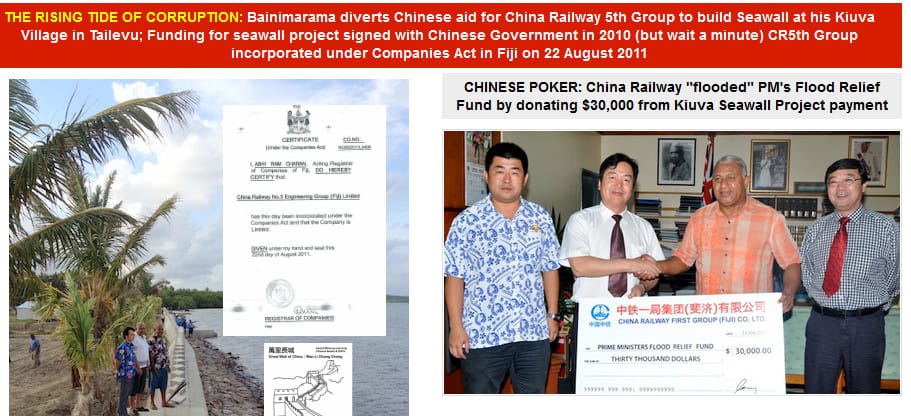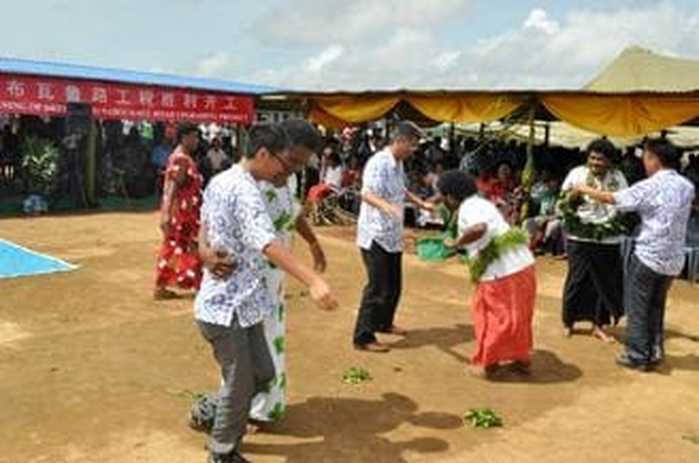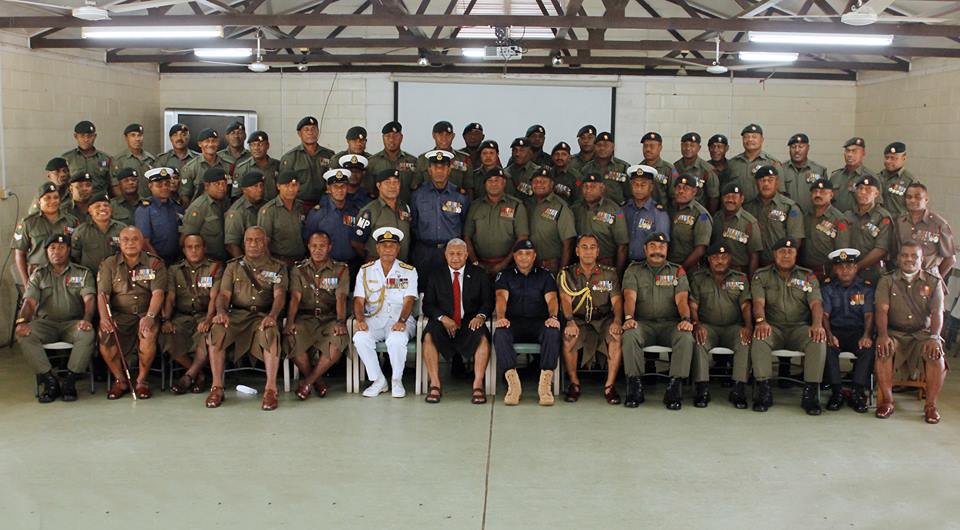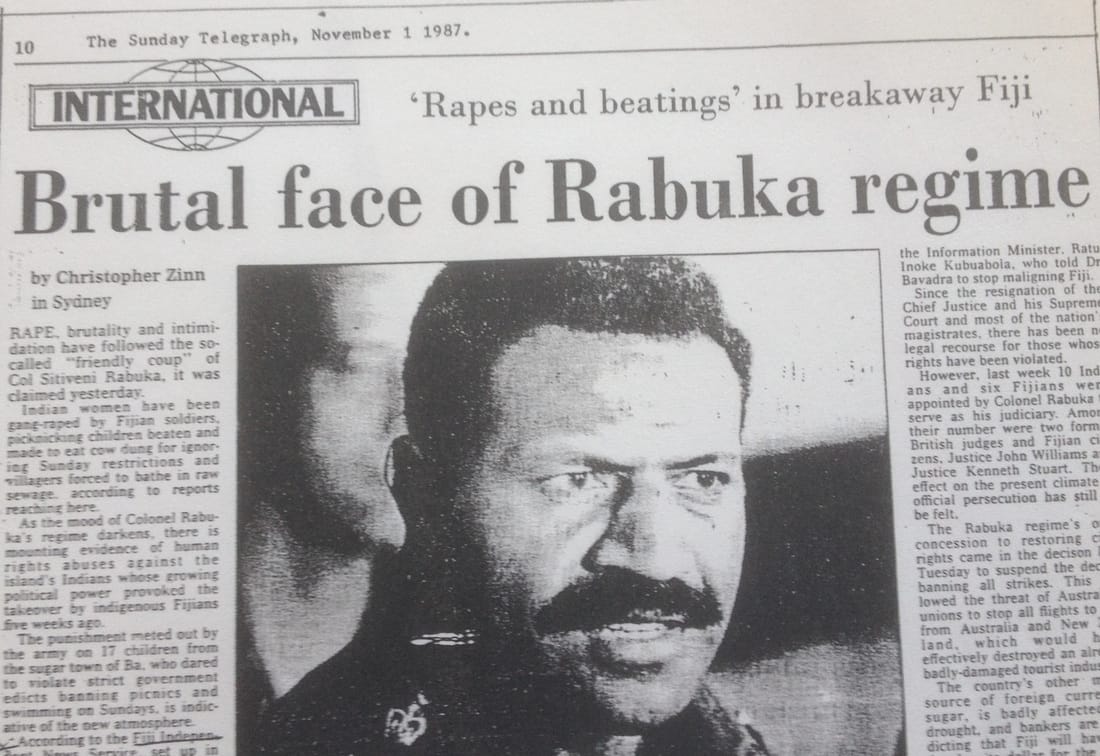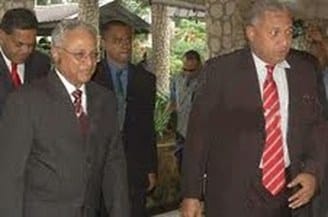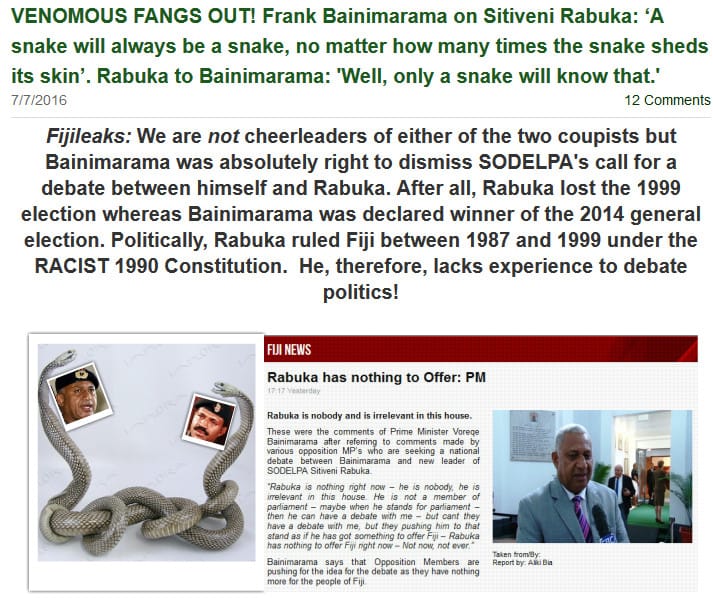↧
NEW ZEALAND TREATMENT: Businessman left for dead in the horrific screwdriver attack airlifted to NZ for treatment; assailant(s) still at large!
↧
"I did not swear at the President of Fiji but uttered the 'F' word after all my groceries had spilled onto the street at the entrance of blocked Gorrie Street"; deported Karen Seaton points finger at Aiyaz Sayed Khaiyum
Koro Islander SEATON to PRESIDENT OBAMA:
"RACISM AT HEART OF KHAIYUM'S LAND GRAB DECISION
[The] A.G. [Khaiyum] is suffering from a gross error in reasoning. However, more pointedly, is using any justification to further a Racist redistribution of land/wealth scheme. People are hurting here but because of Racist beliefs - their cries go unanswered. Please Mr. Obama, will you be a voice for integrity, of rule of law, [and] ask for repeal of Retrospective Legislation being used to further a Racist based Extortion and Land Grab scheme?"
Police at scene investigated and cleared her of any criminal wrong-doing: "The police cleared me. At one point I said "before this spins out of control", "let me get in touch with the President, I know him, met him. I have respect for the Office of the President. They said the President never heard you..."
"The police cleared me. At one point I said "before this spins out of control" , "let me get in touch with the President, I know him, met him. I have respect for the Office of the President. They said the President never heard you. It was a police officer nearby when your groceries spilled open. It was investigated and dismissed. Confirmed fully dismissed by two Officers. Why didn't he help me pick up those groceries? Why did they have the road entrance to Gorrie street totally blocked off?, at both ends. So I had to carry a heavy load down the road, that broke open, to get to the hotel because the taxi was refused entrance? That was a 'public annoyance, 'in itself. I was unable to access my hotel room by taxi, having to walk down a street ladden with parcels that were bound for Koro. It was in this context I uttered the "F" word, and not against the President of Fiji. Aiyaz Khaiyum gave the directive to the Immigration officials to deport me although I hold residency in Fiji"
Fijileaks: More later!!!!!!!!! Seaton accuses Khaiyum of being "Mugabe"!
From Fijileaks Archive, 11 December 2014
↧
↧
Route-ere- to Kenya: Mutuma Ruteere, now you have wined and dined at the Attorney-General's Conference, better sober up and go back home! Oh, don't forget to ask your colleague Yash Ghai of his views on Fiji!
Fijileaks to Aiyaz Sayed Khaiyum: When will you give POLICE the go ahead to arrest your FFP Hackers?
Surely, HACKING is in your REVISED LAWS OF FIJI?
VICTOR LAL to Mutuma Ruteere:
"There is one FACT Khaiyum will not tell you. I and my family have been subjected to the most vile, violent, verbal sexual abuse NOT by native Fijians but by a group of his Indo-Fijians who are screaming about racism to you in Fiji..."
The Fijian Attorney-General and Minister of Justice Aiyaz Sayed-Khaiyum on Computer Hacking, FIJI CRIMES DECREE 2009, (DECREE No. 44 of 2009): Division 6 — Computer Offences, Speech at the 2nd Anti-Money Laundering Conference, Holiday Inn, 7 October 2010
“First of all, one of the most significant changes that have taken place since the last time we met has been the implementation of the Crimes Decree. What this has meant is that we now specifically recognize under Fijian law; crimes pertaining to computer hacking, crimes pertaining to offences committed now that were not offences before using computer hacking or using IT. What these changes have meant as an example is that a person committing an act outside Fiji now can be charged and tried by Fijian Court, even though the act was say committed in Australia or New Zealand. So the jurisdiction of the Fijian Court has been extended. Previously you could not do that. For example, if I sat in Sydney and got into a computer or hacked into a computer in Fiji, in Suva, in a bank or some other institution, I could not be tried for that because the actual commissioning of that act took place in Australia. So the jurisdiction of the Fijian Courts did not extend to Australia. Now it does and indeed anywhere else in the world. So I think it is very significant for you to be aware of that.” – (http://aiyazsayedkhaiyum.org/tag/fraud/)
↧
PAY BACK $5000: Prime Minister Voreqe Bainimarama's son RATU MELI BAINIMARAMA urged to pay back the money that was loaned to him!
SARAH Conrad's father was airlifted to New Zealand on 27 November for further medical treatment while his violent and murderous assailant(s) are still on the run, with POLICE having made no arrest(s):
http://www.coupfourandahalf.com/2010/10/biggest-pay-reap-off-in-fijis-40-years.html
↧
Bainimarama's Message on Prophet Muhammad’s Birthday: 'Every year, this occasion serves as a chance to value the diversity we share in Fiji'
"Today, along with hundreds of millions of people around the world, our Fijian Muslim brothers and sister[s] are celebrating the birth and life of the Prophet Muhammad, peace be upon him. Every year, this occasion serves as an opportunity to appreciate the diversity of thought we enjoy in our society.
The values taught by the Prophet Muhammad formed the foundation of Islam, and carry meaning for all of humanity, irrespective of cultural, ethnic and religious backgrounds.
Our shared identity as Fijians transcends religious boundaries, and it is a personal point of pride for me as Prime Minister that we so openly embrace the festivities of our fellow Fijians.
We can all respect the impact the Prophet Muhammad has had on universal values, moralities and ethics. And we can all seek to uplift ourselves and our communities to live out the virtues of unity, understanding, peace, justice and equality.
So today, I call on all of our citizens to take time to reflect on the teachings of the Prophet Muhammad, and join hands in recognition of the values of brotherhood and sisterhood that he so often preached.
Fiji’s progress can be measured by the care and compassion we show our fellow Fijians. If we keep sight of that – if we deepen the bonds that exist between us – we will continue to advance our nation and our people towards a brighter future."
The values taught by the Prophet Muhammad formed the foundation of Islam, and carry meaning for all of humanity, irrespective of cultural, ethnic and religious backgrounds.
Our shared identity as Fijians transcends religious boundaries, and it is a personal point of pride for me as Prime Minister that we so openly embrace the festivities of our fellow Fijians.
We can all respect the impact the Prophet Muhammad has had on universal values, moralities and ethics. And we can all seek to uplift ourselves and our communities to live out the virtues of unity, understanding, peace, justice and equality.
So today, I call on all of our citizens to take time to reflect on the teachings of the Prophet Muhammad, and join hands in recognition of the values of brotherhood and sisterhood that he so often preached.
Fiji’s progress can be measured by the care and compassion we show our fellow Fijians. If we keep sight of that – if we deepen the bonds that exist between us – we will continue to advance our nation and our people towards a brighter future."
↧
↧
THERE IS NO EASY WALK TO FREEDOM: The RIGHTS advocates march through streets Fiji Roads Authority tried to ban- on Human Rights Day
↧
Professor Wadan Narsey: "Human Rights are not for BEGGING"
"In 2009, Professor Brij Lal was deported from Fiji with the Bainimarama Government claiming, without any evidence whatsoever, that he was “prejudicial to the peace, defence, public security of the Government of Fiji”.
In 2010, his wife Dr Padma Lal, was stopped from entering Fiji with the Government refusing even to explain why they banned her, merely the spouse of Brij Lal. Why are these two law-abiding persons denied their fundamental human right to enter Fiji, when all and sundry, even those with criminal convictions, are able to do so freely? Many respectable Fiji citizens have publicly called on the Bainimarama Government to remove the bans on Brij and Padma, pointing out what distinguished citizens they have been in their respective fields and how enormously they have contributed to Fiji....Some are polite requests praising Bainimarama’s potential magnanimity, some are poignant, some are demanding and one (by Keteca) even pointed out the hypocrisy of Prime Minister Bainimarama declaring to Sydney Indo-Fijians that “the fact that you were made to feel unwelcome in your country of birth is the most shameful episode in our nation’s history”. But it is a basic human right of all law-abiding former Fiji citizens to enter and leave Fiji according to our laws, whether regardless of their brilliance, status, contribution to Fiji. The human right to enter Fiji (Brij and Padma) or leave Fiji temporarily (FT publisher Hand Arts) should not have to be begged for. Why are the relevant Fiji institutions not fighting for Padma and Brij, and Hank Arts?...Those in power might note what the UN Preamble warns “Whereas it is essential, if man is not to be compelled to have recourse, as a last resort, to rebellion against tyranny and oppression, that human rights should be protected by the rule of law.
The Fiji public should not have to beg for our basic human rights."
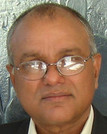
By Professor Wadan Narsey
An extremely dismaying aspect of Fiji society today, is the frequency of public requests, appeals, petitions, entreaties, and prayers, essentially “begging” the Bainimarama Government to respect the human rights of individuals.
But a “human right” is, by definition, a fundamental entitlement of each and every human being on this planet- because they are human beings.
Human rights” are NOT to be at the mercy of any government or person, and certainly not to be “begged for”, which is tantamount to strengthening and legitimizing governments’ illegal “authority” to grant or refuse that request.
The Bainimarama Government, despite many public pleas, has refused to back down from their original decision to ban Dr Padma Narsey Lal and Professor Brij Lal from Fiji.
They refuse to respond publicly, indicating their refusal to be publicly accountable for their decision to deny the basic human rights of Padma and Brij.
Fiji citizens should however be encouraged by organizations such as Amnesty International and the small signs of progress by the Fiji judiciary to restore human rights on another front – freedom from torture and violence.
It is clear that there is an urgent need for international organizations to take up the struggle for the basic human rights of Padma and Brij to enter Fiji, the country of their birth, just as they have taken up the struggle to eliminate torture from Fiji.
UN Declaration and Amnesty International
All Fiji citizens and residents ought to carefully read the UN Declaration of Human Rights, which you can download here: http://www.un.org/en/universal-declaration-human-rights/
The Preamble notes: “Whereas recognition of the inherent dignity and of the equal and inalienable rights of all members of the human family is the foundation of freedom, justice and peace in the world”.
Amnesty International, a few days (FT 5 Dec. 2016) ago released a Report ‘Beating Justice: How Fiji’s Security Forces Get Away with Torture’, detailing severe beatings, rape and other sexual violence reportedly conducted by uniformed officers.
The Amnesty International Website supports the UN Declaration of Human Rights as being:
* universal: they belong to all of us, everybody in the world, of whatever nationality;
* inalienable: they cannot be taken away from us
* indivisible and interdependent: governments should not be able to pick and choose which are respected and which not.
But the Bainimarama Government has been doing precisely that, with individuals it does not like, with their own security forces being found guilty of trashing our human rights.
Worse still, government institutions that are charged with protecting our human rights (such as the Fiji Human Rights and Anti-Discrimination Commission), often refuse to take proactive action to defend them, while eager to prosecute those opposed to government views.
Brij and Padma
In 2009, Professor Brij Lal was deported from Fiji with the Bainimarama Government claiming, without any evidence whatsoever, that he was “prejudicial to the peace, defence, public security of the Government of Fiji”.
In 2010, his wife Dr Padma Lal, was stopped from entering Fiji with the Government refusing even to explain why they banned her, merely the spouse of Brij Lal.
Why are these two law-abiding persons denied their fundamental human right to enter Fiji, when all and sundry, even those with criminal convictions, are able to do so freely?
Many respectable Fiji citizens have publicly called on the Bainimarama Government to remove the bans on Brij and Padma, pointing out what distinguished citizens they have been in their respective fields and how enormously they have contributed to Fiji.
Read the interesting array of Letters to the Editor of Fiji Times by Professor Biman Prasad (24/3/2015), Professor Vijay Naidu (26/3/2015), Dr Ropate Qalo (11/4/2016) Kiniviliame Keteca (20/10/2015 and 19/10/2016), Tara Chetty (22/10/2016), Dr Vanessa Griffen (23/10/2016), Satya Samy (18/11/2016) and the many brave opinion pieces of Seona Smiles (30/10/2016 and others).
They detail the grand contributions made by Professor Brij Lal and Dr Padma Lal to Fiji and the honors they have received in Fiji and abroad.
Some are polite requests praising Bainimarama’s potential magnanimity, some are poignant, some are demanding and one (by Keteca) even pointed out the hypocrisy of Prime Minister Bainimarama declaring to Sydney Indo-Fijians that “the fact that you were made to feel unwelcome in your country of birth is the most shameful episode in our nation’s history”.
But it is a basic human right of all law-abiding former Fiji citizens to enter and leave Fiji according to our laws, whether regardless of their brilliance, status, contribution to Fiji.
The human right to enter Fiji (Brij and Padma) or leave Fiji temporarily (FT publisher Hand Arts) should not have to be begged for.
Why are the relevant Fiji institutions not fighting for Padma and Brij, and Hank Arts?
The Fiji FHRADC
One would have thought that the Fiji Human Rights and Anti-Discrimination Commission would have proactively taken up the case of Brij and Padma.
The FHRADC is headed by responsible persons Justice Mohammed Ajmeeer, and includes Faiz Khan (businessman), Selina Lee Wah (social leader), Peceli Rokotuivuna (radio announcer) and Sashi Kiran (head of EU-supported NGO, FRIENDS).
Its CEO is the redoubtable Ashwin Raj, who also is the head of MIDA, and appears to be extremely proactive pursuing Government concerns.
But their website (http://www.fhradc.org.fj/) has little of the informative content which one would normally expect- such as annual reports outlining a description of the human rights they are supposed to protect, the cases they have addressed (successfully or unsuccessfully), the cases currently in front of them, the difficulties they are facing etc.
Not surprisingly, the latest Amnesty International Report on Fiji noted on another but related front, that while the FHRADC “could in theory take a strong role in the independent assessment of complaints against police, corrections and the military, it is still in the process of rebuilding, and is not yet functioning as a national human rights institution compliant with international laws and standards.”
The Amnesty International Report was also concerned (as is the Fiji public) at the militarization of key state institutions such as Police and Corrections (Prisons) involved with the protection of human rights.
Ray of hope: judiciary recovering
A month ago, nine men belonging to the security forces, were found guilty of the rape and sexual assault of Vilikesa Soko in 2014 and jailed for various terms (FT 23 Nov. 2016)
Justice Aruna Aluthge said that his sentences signalled that Fiji was serious about upholding the United Nations Human Rights Conventions against Torture and Abuse.
But the Fiji public is also concerned at the lack of even handedness and respect for human rights by the Office of Public Prosecutions.
While one media is charged with inciting communal antagonism in relation to an article published in the iTaukei language newspaper Nai Lalakai on April 27 this year, another media (Fiji Broadcasting Commission) is not seen to be worth charging despite clearly similar behaviour arousing public complaints.
One also has to be concerned that the judiciary is unable to grant a bail variation to allow the elderly publisher of the Fiji Times to travel for a mere two weeks to NZ in February 2017 to attend his step-daughter’s wedding and have a medical test, despite he and wife putting up a financially massive bond to ensure his return, which this senior, morally upright and most reputable citizen would never dream of putting into risk.
The decision was postponed to another judge and hearing in January.
Justice delayed is justice denied and it is surely a basic human right to be free from mental torture, to be able to travel abroad freely, just as it is to be free from physical torture.
Those in power might note what the UN Preamble warns “Whereas it is essential, if man is not to be compelled to have recourse, as a last resort, to rebellion against tyranny and oppression, that human rights should be protected by the rule of law”.
The Fiji public should not have to beg for our basic human rights.
An extremely dismaying aspect of Fiji society today, is the frequency of public requests, appeals, petitions, entreaties, and prayers, essentially “begging” the Bainimarama Government to respect the human rights of individuals.
But a “human right” is, by definition, a fundamental entitlement of each and every human being on this planet- because they are human beings.
Human rights” are NOT to be at the mercy of any government or person, and certainly not to be “begged for”, which is tantamount to strengthening and legitimizing governments’ illegal “authority” to grant or refuse that request.
The Bainimarama Government, despite many public pleas, has refused to back down from their original decision to ban Dr Padma Narsey Lal and Professor Brij Lal from Fiji.
They refuse to respond publicly, indicating their refusal to be publicly accountable for their decision to deny the basic human rights of Padma and Brij.
Fiji citizens should however be encouraged by organizations such as Amnesty International and the small signs of progress by the Fiji judiciary to restore human rights on another front – freedom from torture and violence.
It is clear that there is an urgent need for international organizations to take up the struggle for the basic human rights of Padma and Brij to enter Fiji, the country of their birth, just as they have taken up the struggle to eliminate torture from Fiji.
UN Declaration and Amnesty International
All Fiji citizens and residents ought to carefully read the UN Declaration of Human Rights, which you can download here: http://www.un.org/en/universal-declaration-human-rights/
The Preamble notes: “Whereas recognition of the inherent dignity and of the equal and inalienable rights of all members of the human family is the foundation of freedom, justice and peace in the world”.
Amnesty International, a few days (FT 5 Dec. 2016) ago released a Report ‘Beating Justice: How Fiji’s Security Forces Get Away with Torture’, detailing severe beatings, rape and other sexual violence reportedly conducted by uniformed officers.
The Amnesty International Website supports the UN Declaration of Human Rights as being:
* universal: they belong to all of us, everybody in the world, of whatever nationality;
* inalienable: they cannot be taken away from us
* indivisible and interdependent: governments should not be able to pick and choose which are respected and which not.
But the Bainimarama Government has been doing precisely that, with individuals it does not like, with their own security forces being found guilty of trashing our human rights.
Worse still, government institutions that are charged with protecting our human rights (such as the Fiji Human Rights and Anti-Discrimination Commission), often refuse to take proactive action to defend them, while eager to prosecute those opposed to government views.
Brij and Padma
In 2009, Professor Brij Lal was deported from Fiji with the Bainimarama Government claiming, without any evidence whatsoever, that he was “prejudicial to the peace, defence, public security of the Government of Fiji”.
In 2010, his wife Dr Padma Lal, was stopped from entering Fiji with the Government refusing even to explain why they banned her, merely the spouse of Brij Lal.
Why are these two law-abiding persons denied their fundamental human right to enter Fiji, when all and sundry, even those with criminal convictions, are able to do so freely?
Many respectable Fiji citizens have publicly called on the Bainimarama Government to remove the bans on Brij and Padma, pointing out what distinguished citizens they have been in their respective fields and how enormously they have contributed to Fiji.
Read the interesting array of Letters to the Editor of Fiji Times by Professor Biman Prasad (24/3/2015), Professor Vijay Naidu (26/3/2015), Dr Ropate Qalo (11/4/2016) Kiniviliame Keteca (20/10/2015 and 19/10/2016), Tara Chetty (22/10/2016), Dr Vanessa Griffen (23/10/2016), Satya Samy (18/11/2016) and the many brave opinion pieces of Seona Smiles (30/10/2016 and others).
They detail the grand contributions made by Professor Brij Lal and Dr Padma Lal to Fiji and the honors they have received in Fiji and abroad.
Some are polite requests praising Bainimarama’s potential magnanimity, some are poignant, some are demanding and one (by Keteca) even pointed out the hypocrisy of Prime Minister Bainimarama declaring to Sydney Indo-Fijians that “the fact that you were made to feel unwelcome in your country of birth is the most shameful episode in our nation’s history”.
But it is a basic human right of all law-abiding former Fiji citizens to enter and leave Fiji according to our laws, whether regardless of their brilliance, status, contribution to Fiji.
The human right to enter Fiji (Brij and Padma) or leave Fiji temporarily (FT publisher Hand Arts) should not have to be begged for.
Why are the relevant Fiji institutions not fighting for Padma and Brij, and Hank Arts?
The Fiji FHRADC
One would have thought that the Fiji Human Rights and Anti-Discrimination Commission would have proactively taken up the case of Brij and Padma.
The FHRADC is headed by responsible persons Justice Mohammed Ajmeeer, and includes Faiz Khan (businessman), Selina Lee Wah (social leader), Peceli Rokotuivuna (radio announcer) and Sashi Kiran (head of EU-supported NGO, FRIENDS).
Its CEO is the redoubtable Ashwin Raj, who also is the head of MIDA, and appears to be extremely proactive pursuing Government concerns.
But their website (http://www.fhradc.org.fj/) has little of the informative content which one would normally expect- such as annual reports outlining a description of the human rights they are supposed to protect, the cases they have addressed (successfully or unsuccessfully), the cases currently in front of them, the difficulties they are facing etc.
Not surprisingly, the latest Amnesty International Report on Fiji noted on another but related front, that while the FHRADC “could in theory take a strong role in the independent assessment of complaints against police, corrections and the military, it is still in the process of rebuilding, and is not yet functioning as a national human rights institution compliant with international laws and standards.”
The Amnesty International Report was also concerned (as is the Fiji public) at the militarization of key state institutions such as Police and Corrections (Prisons) involved with the protection of human rights.
Ray of hope: judiciary recovering
A month ago, nine men belonging to the security forces, were found guilty of the rape and sexual assault of Vilikesa Soko in 2014 and jailed for various terms (FT 23 Nov. 2016)
Justice Aruna Aluthge said that his sentences signalled that Fiji was serious about upholding the United Nations Human Rights Conventions against Torture and Abuse.
But the Fiji public is also concerned at the lack of even handedness and respect for human rights by the Office of Public Prosecutions.
While one media is charged with inciting communal antagonism in relation to an article published in the iTaukei language newspaper Nai Lalakai on April 27 this year, another media (Fiji Broadcasting Commission) is not seen to be worth charging despite clearly similar behaviour arousing public complaints.
One also has to be concerned that the judiciary is unable to grant a bail variation to allow the elderly publisher of the Fiji Times to travel for a mere two weeks to NZ in February 2017 to attend his step-daughter’s wedding and have a medical test, despite he and wife putting up a financially massive bond to ensure his return, which this senior, morally upright and most reputable citizen would never dream of putting into risk.
The decision was postponed to another judge and hearing in January.
Justice delayed is justice denied and it is surely a basic human right to be free from mental torture, to be able to travel abroad freely, just as it is to be free from physical torture.
Those in power might note what the UN Preamble warns “Whereas it is essential, if man is not to be compelled to have recourse, as a last resort, to rebellion against tyranny and oppression, that human rights should be protected by the rule of law”.
The Fiji public should not have to beg for our basic human rights.
http://www.fijileaks.com/home/tyrannical-silence-narsey-says-fijis-animal-farm-continues-in-the-deportation-of-professor-brij-lal-worst-indo-fijians-in-positions-of-power-and-influence-palpably-silent-on-couples-banning-from-fiji
↧
FRU to Ben Ryan: "IT is not your team, Ben. You have chosen to move on which we respect and all have accepted but it seems it is difficult for you to move on...all players paid, and no loss of sponsorship, so stop the lie"
Fiji Rugby Union hits back at former Fiji Seven's coach Ben Ryan:
"You have chosen to move on to other challenges which we respect and all have accepted but it seems it is difficult for you to move on..The
FRU has also appointed a new Coach and he will lead the Fiji Mens 7s Team moving forward and we all need to give Baber a chance including you, Ben Ryan. It is no longer YOUR Team and YOU must understand this and YOU must allow our new Coach Baber to deal with the issues in relation to his Team."
↧
THE LIE THAT FRU'S JOHN O'CONNOR HAS TOLD: BLK and Carpenters Motors out as FRU sponsors; Fiji Airways asks for drastic renegotiation
The former Vodafone 7s coach Ben Ryan’s Tweet that the Fiji Rugby Union is losing commercial supporters is correct
Fijileaks can confirm that Ben Ryan’s Tweet that the Fiji Rugby Union is losing commercial supporters is correct with news that Carpenters Motors have said in writing they will terminate the supply of vehicles to the national rugby body, as clothing apparel BLK winds down its commitment following their parent company in Australia going into administration.
In addition, Fiji Airways has started discussions with the FRU about scaling back their commitment which to the end of April 2016 was worth $420,000 a year in cash and just under $500,000 in value in kind airfares.
Ryan’s information about the status of the FRU sponsors is likely to be first hand. He is still a brand ambassador for Fiji Airways and has worked extensively for Tourism Fiji, including attending the World Travel Market in London, at which Fiji Airways also had a heavy presence.
The collapse of BLK has meant that the apparel company will not be able to complete its agreement with the FRU. In the latest annual report, the relationship was worth $128,000 in cash income and over $400,000 in sportswear for the various teams that the FRU runs.
Carpenters Motors contribution to the FRU is recognised as the provision of motor vehicles to the value of $283,000.
All three of the companies are key elements in the FRU’s commercial programme which, according to the last FRU annual report, is run by Inoke Bainimarama, nephew of the prime minister. The PM’s brother-in-law Francis Kean is the FRU’s chairman and his son-in-law Sale Sorovaki, former national 15s captain, is the head of development.
At the centre of the Inoke Bainimarama’s work is servicing the Vodafone sponsorship consortium which took over the title sponsorship of the Fiji 15s and 7s team in early 2014.
Vodafone was thrilled to announce that they were investing $40m into the Fiji Rugby Union over five years, a figure also championed by then FRU chairman (and Prime Minister’s nominee) Filimone Waqabaca. Waqabaca’s day job at the time, as permanent secretary Finance, might suggest he had a competency in finance.
But he did not because Vodafone’s cash commitment to the FRU amounted to no more than $12m over five years, but from that cash contribution VAT had to be paid on the whole of the $40m figure.
The sponsorship only reached $40m because Vodafone was allowed to pad out the numbers by including meaningless promotions and marketing exercises, spends on morning teas etc. For the first two years of the sponsorship – 2014 and 2015 – Vodafone did not even present a breakdown of their own expenditure to the FRU.
When former CEO Radrodro Tabualevu wrote a letter to the chairman and CEO of Vodafone to demand action on these points, Vodafone’s response was to pay for the Prime Minister and family members to attend the 2015 Rugby World Cup as their guests and the issue was shelved by FRU chairman Kean.
Tabualevu resigned shortly afterwards
In addition, Fiji Airways has started discussions with the FRU about scaling back their commitment which to the end of April 2016 was worth $420,000 a year in cash and just under $500,000 in value in kind airfares.
Ryan’s information about the status of the FRU sponsors is likely to be first hand. He is still a brand ambassador for Fiji Airways and has worked extensively for Tourism Fiji, including attending the World Travel Market in London, at which Fiji Airways also had a heavy presence.
The collapse of BLK has meant that the apparel company will not be able to complete its agreement with the FRU. In the latest annual report, the relationship was worth $128,000 in cash income and over $400,000 in sportswear for the various teams that the FRU runs.
Carpenters Motors contribution to the FRU is recognised as the provision of motor vehicles to the value of $283,000.
All three of the companies are key elements in the FRU’s commercial programme which, according to the last FRU annual report, is run by Inoke Bainimarama, nephew of the prime minister. The PM’s brother-in-law Francis Kean is the FRU’s chairman and his son-in-law Sale Sorovaki, former national 15s captain, is the head of development.
At the centre of the Inoke Bainimarama’s work is servicing the Vodafone sponsorship consortium which took over the title sponsorship of the Fiji 15s and 7s team in early 2014.
Vodafone was thrilled to announce that they were investing $40m into the Fiji Rugby Union over five years, a figure also championed by then FRU chairman (and Prime Minister’s nominee) Filimone Waqabaca. Waqabaca’s day job at the time, as permanent secretary Finance, might suggest he had a competency in finance.
But he did not because Vodafone’s cash commitment to the FRU amounted to no more than $12m over five years, but from that cash contribution VAT had to be paid on the whole of the $40m figure.
The sponsorship only reached $40m because Vodafone was allowed to pad out the numbers by including meaningless promotions and marketing exercises, spends on morning teas etc. For the first two years of the sponsorship – 2014 and 2015 – Vodafone did not even present a breakdown of their own expenditure to the FRU.
When former CEO Radrodro Tabualevu wrote a letter to the chairman and CEO of Vodafone to demand action on these points, Vodafone’s response was to pay for the Prime Minister and family members to attend the 2015 Rugby World Cup as their guests and the issue was shelved by FRU chairman Kean.
Tabualevu resigned shortly afterwards
↧
↧
LANDACTGATE: Khaiyum and his cronies are sitting on empty plots of land they bought and yet he brought in RETROSPECTIVE bill against foreign owners; FLOA calls for TRAVEL BOYCOTT: FIJI, NOT SAFE!
"You'll soon learn that The Fiji Land[owners] Association doesn't have to "register" in your game, there is no leverage there for us, only corruption. We'll register in the hearts and minds of people worldwide. Our leverage is in truth. Your so-called "democracy" lacks the freedoms of democracy. We are trying our case in the free world where there is true freedom of assembly (without registration), speech (without deportation), and press (without government control)." - Dave Rand, FLOA, representing almost
5,000 non-citizen owners of free-hold land in Fiji
Dave Rand, FLOA, to Aiyaz Khaiyum, 11 December 2016: | |
AIYAZ KHAIYUM claims "the so-called Fiji Landowners Association" is not a legally-registered entity in the country. It may or not be but recall that the Fiji Court of Appeal had ruled that Khaiyum's regime was illegal. What was his response? He got rid of the 1997 Constitution, stole FijiFirst Party name, and secretly registered it as his own to fight 2014 election. Now, he is accused of trying to steal land from small foreign investors! According to World Bank Group, FIJI is 97th if you are thinking of starting a BUSINESS, and yet he boasts FIJI is the best!
From Fijileaks Archives:
Fijileaks to Aiyaz Khaiyum: Why didn't YOU build a house on this LAND?
↧
NFP sinks boot into Fiji Rugby Union as Ben Ryan says if FRU doesn't like his tweets, remove his photo from FRU website. NFP: "Come clean on Vodafone sponsorship, explain why 7s players got allowance only..."
‘Sadly it is a typical that Ryan’s legitimate concerns have been treated with such contempt by the FRU leadership. Rugby House is showing an intolerance to criticism and an inability to admit mistakes that mirrors this government, which is addicted to secrecy and only too happy to arbitrarily arrest its opponents, deport them or place them on immigration blacklists.’
The President of the National Federation Party, Roko Tupou Draunidalo has today called on the Fiji Rugby Union and Vodafone-led consortium to fully explain the details of their sponsorship arrangements and clarify why the $40m sponsorship provides insufficient resources to allow for members of the national 7s team to receive anything more than basic allowances.
‘The game of rugby holds a special place in the hearts of all Fijians,’ said Draunidalo. ‘Time and time again when politics and our political leaders have failed this country, it is rugby that has bound us together as a community, lifted us up as a nation and shown us the way forward.’
‘But we appear to be the only country in the world who wins Olympic gold but then fails to secure any commercial benefit for the players. Is this because of the Vodafone sponsorship deal?
"The FRU’s leadership is so shambolic we appear to have won gold but actually lost sponsors. Certainly what we now know is that our national 7s players are expected to play like professionals but live like paupers on the World 7s Series.’
"This government might claim there should be a separation between politics and sport. But they chose to end that separation when the prime minister accepted the presidency of the Fiji Rugby Union in 2014, and then handpicked a succession of his closest allies as chairmen of the FRU through their appointment as the PM’s nominee to the board, said Draunidalo.
‘What is shocking is that despite all that they have achieved, it is clear the 7s players have no voice. Like so many in this country, they find themselves unable to reach out to the media to explain their situation and to press their case.’
‘That is why Fiji should be grateful that Ben Ryan has spoken up. He has shone a light where the FRU would rather was kept dark. Thanks to his commitment to do what is right, Ryan has made us aware of this deplorable state of affairs.
‘Sadly it is a typical that Ryan’s legitimate concerns have been treated with such contempt by the FRU leadership. Rugby House is showing an intolerance to criticism and an inability to admit mistakes that mirrors this government, which is addicted to secrecy and only too happy to arbitrarily arrest its opponents, deport them or place them on immigration blacklists.’
In February 2014, the Fiji Rugby Union signed a five-year sponsorship agreement with a consortium of local companies led by Vodafone Fiji Ltd. Other companies included are Telecom Fiji Ltd, Fiji Airways, HFC Bank and CJ Patel.
The then-chairman of the Fiji Rugby Union, Filimone Waqabaca, announced that the Vodafone consortium was pledging sponsorship worth $8m a year or $40m over the five years of the agreement. We were promised this would be ‘a game changer’ for Fiji rugby.
Waqabaca, who was the Bainimarama government’s permanent secretary of Finance at the time, was appointed directly to the board by the prime minister. He is now Fiji’s High Commissioner in New Zealand.
‘The FRU’s 2015 financial report shows clearly that instead of the promised $8m income, the total income from the Vodafone consortium is just over $3m a year, covering cash and value in kind such as airfares. There was even less recorded cash and value in kind income report in the 2014 audited report.’
The FRU’s own financial reports show that in spite of being promised $8m a year, Vodafone and its consortium partners have paid $5m less for each of the first two years of the sponsorship agreement – a shortfall of $10m in total against a promise of $16m.
‘Now is the time for the Government to reveal what was in the June 12 2015 letter sent by the then FRU Chief Executive Radrodro Tabualevu to the Vodafone CEO. The letter was a 30-day termination letter, alleging a failure by Vodafone to account for more than $5 million worth of sponsorship support in the first year of their sponsorship agreement.’
We know that the June 12 letter was also copied to the prime minister’s brother-in-law Francis Kean, as FRU chairman, the Prime Minister himself as president of the Fiji Rugby Union), and Ajith Kodagoda, as the chairman of the parent company of Vodafone Fiji Ltd.
‘Is it not the case that had the FRU followed through and terminated the relationship with Vodafone in 2015, when Fiji had already won their first of two World 7s Series titles, then the FRU would now be many millions of dollars better off?’
‘With the FRU freed from the Vodafone deal, Rugby House would have been able to build a structure of sponsorship support that reflected the success Ben Ryan was already bringing to the country, and which reached its peak with the Olympic gold in Rio de Janeiro.’
Sadly this did not happen. What happened next is familiar to many who have watched this government in action.
At the same time that this threat of termination was being discussed between the FRU and Vodafone, the mobile phone company announced that it was paying for the Prime Minister and his wife to attend the 2015 Rugby World Cup opening match.
Kodagoda was quoted as telling the local media that Vodafone was happy to foot all of the estimated $60,000 costs. ‘As the head of Fiji Rugby Union in the country and as Prime Minister, Mr Bainimarama has a done a lot for the development and good administration of the sport in the country and deserves to be at the Rugby World Cup.’
Vodafone and the FRU then patched up their differences but on surprising terms given the amounts at stake. Vodafone were being asked by the FRU to explain $5m in missing expenditure from 2014, but eventually settled by paying only an additional $100,000 in cash to the FRU in September 2015. This extra payment represented only two percent of what the FRU were chasing.
Tabualevu resigned from the FRU in November 2015.
No explanation has ever been offered of this extraordinary compromise nor the effect that continuing with Vodafone on the same terms has had on the financial fighting power of the FRU to do its best by its players. It is with great regret that we note the FRU continues to ban media from its Annual and Special General Meetings.
As the NFP, we say that the Prime Minister has done too much for himself, for his family members at the FRU and for his allies in Vodafone and its consortium members. All of his advancement has been built on the back of the players – our best and rarest resource - of whom so much is expected and so little provided by Rugby House.
‘The government needs to come clean once and for all about this wretched Vodafone deal. Why is this country’s national sport strapped into commercial arrangements that only seem to profit the Prime Minister and his allies? Meanwhile Vodafone’s relationship with Fiji rugby is short-changing all of the rest of the game’s stakeholders from the provincial unions and 7s players right through to those in secondary and Kaji rugby and the families who keep this great game alive.’
Authorised by:
Roko Tupou Draunidalo
NFP President
‘The game of rugby holds a special place in the hearts of all Fijians,’ said Draunidalo. ‘Time and time again when politics and our political leaders have failed this country, it is rugby that has bound us together as a community, lifted us up as a nation and shown us the way forward.’
‘But we appear to be the only country in the world who wins Olympic gold but then fails to secure any commercial benefit for the players. Is this because of the Vodafone sponsorship deal?
"The FRU’s leadership is so shambolic we appear to have won gold but actually lost sponsors. Certainly what we now know is that our national 7s players are expected to play like professionals but live like paupers on the World 7s Series.’
"This government might claim there should be a separation between politics and sport. But they chose to end that separation when the prime minister accepted the presidency of the Fiji Rugby Union in 2014, and then handpicked a succession of his closest allies as chairmen of the FRU through their appointment as the PM’s nominee to the board, said Draunidalo.
‘What is shocking is that despite all that they have achieved, it is clear the 7s players have no voice. Like so many in this country, they find themselves unable to reach out to the media to explain their situation and to press their case.’
‘That is why Fiji should be grateful that Ben Ryan has spoken up. He has shone a light where the FRU would rather was kept dark. Thanks to his commitment to do what is right, Ryan has made us aware of this deplorable state of affairs.
‘Sadly it is a typical that Ryan’s legitimate concerns have been treated with such contempt by the FRU leadership. Rugby House is showing an intolerance to criticism and an inability to admit mistakes that mirrors this government, which is addicted to secrecy and only too happy to arbitrarily arrest its opponents, deport them or place them on immigration blacklists.’
In February 2014, the Fiji Rugby Union signed a five-year sponsorship agreement with a consortium of local companies led by Vodafone Fiji Ltd. Other companies included are Telecom Fiji Ltd, Fiji Airways, HFC Bank and CJ Patel.
The then-chairman of the Fiji Rugby Union, Filimone Waqabaca, announced that the Vodafone consortium was pledging sponsorship worth $8m a year or $40m over the five years of the agreement. We were promised this would be ‘a game changer’ for Fiji rugby.
Waqabaca, who was the Bainimarama government’s permanent secretary of Finance at the time, was appointed directly to the board by the prime minister. He is now Fiji’s High Commissioner in New Zealand.
‘The FRU’s 2015 financial report shows clearly that instead of the promised $8m income, the total income from the Vodafone consortium is just over $3m a year, covering cash and value in kind such as airfares. There was even less recorded cash and value in kind income report in the 2014 audited report.’
The FRU’s own financial reports show that in spite of being promised $8m a year, Vodafone and its consortium partners have paid $5m less for each of the first two years of the sponsorship agreement – a shortfall of $10m in total against a promise of $16m.
‘Now is the time for the Government to reveal what was in the June 12 2015 letter sent by the then FRU Chief Executive Radrodro Tabualevu to the Vodafone CEO. The letter was a 30-day termination letter, alleging a failure by Vodafone to account for more than $5 million worth of sponsorship support in the first year of their sponsorship agreement.’
We know that the June 12 letter was also copied to the prime minister’s brother-in-law Francis Kean, as FRU chairman, the Prime Minister himself as president of the Fiji Rugby Union), and Ajith Kodagoda, as the chairman of the parent company of Vodafone Fiji Ltd.
‘Is it not the case that had the FRU followed through and terminated the relationship with Vodafone in 2015, when Fiji had already won their first of two World 7s Series titles, then the FRU would now be many millions of dollars better off?’
‘With the FRU freed from the Vodafone deal, Rugby House would have been able to build a structure of sponsorship support that reflected the success Ben Ryan was already bringing to the country, and which reached its peak with the Olympic gold in Rio de Janeiro.’
Sadly this did not happen. What happened next is familiar to many who have watched this government in action.
At the same time that this threat of termination was being discussed between the FRU and Vodafone, the mobile phone company announced that it was paying for the Prime Minister and his wife to attend the 2015 Rugby World Cup opening match.
Kodagoda was quoted as telling the local media that Vodafone was happy to foot all of the estimated $60,000 costs. ‘As the head of Fiji Rugby Union in the country and as Prime Minister, Mr Bainimarama has a done a lot for the development and good administration of the sport in the country and deserves to be at the Rugby World Cup.’
Vodafone and the FRU then patched up their differences but on surprising terms given the amounts at stake. Vodafone were being asked by the FRU to explain $5m in missing expenditure from 2014, but eventually settled by paying only an additional $100,000 in cash to the FRU in September 2015. This extra payment represented only two percent of what the FRU were chasing.
Tabualevu resigned from the FRU in November 2015.
No explanation has ever been offered of this extraordinary compromise nor the effect that continuing with Vodafone on the same terms has had on the financial fighting power of the FRU to do its best by its players. It is with great regret that we note the FRU continues to ban media from its Annual and Special General Meetings.
As the NFP, we say that the Prime Minister has done too much for himself, for his family members at the FRU and for his allies in Vodafone and its consortium members. All of his advancement has been built on the back of the players – our best and rarest resource - of whom so much is expected and so little provided by Rugby House.
‘The government needs to come clean once and for all about this wretched Vodafone deal. Why is this country’s national sport strapped into commercial arrangements that only seem to profit the Prime Minister and his allies? Meanwhile Vodafone’s relationship with Fiji rugby is short-changing all of the rest of the game’s stakeholders from the provincial unions and 7s players right through to those in secondary and Kaji rugby and the families who keep this great game alive.’
Authorised by:
Roko Tupou Draunidalo
NFP President
From Fijileaks Archives:
↧
FREE AT LAST: After five years and thousands of dollars in legal costs, the politically motivated trial of Mere Samisoni collapses. DPP withdraws inciting violence charges but long after sending her to "hell and back"
"I am very happy this case had finally come to its rightful conclusion for Mere Samisoni. Dr Samisoni had literally been to hell and back since charged in 2012." - New Zealand based barrister, Lady Heeni Phillips-Williams, who defended Mere Samisoni
Lady Heeni said the case had wider significance than the individuals involved:
* The legal grounds raised at the voir dire hearing were important from a human rights perspective and the point of view of the administration of justice in Fiji.
*The grounds raised at the hearing included: A lack of electronic recording at police station when statements were taken by police officer
* Dr Samisoni being held in police custody for five days in police cells without proper legal authority
* The long periods without a lawyer whilst accused persons were held in custody
* The appalling conditions and lack of hygiene in police cells
* Breaching judges rules in cross-examination when police took statements from accused
* Not showing co accused statements to accused
* For Fijian democracy to be more effective and not seen as lip service there must be big improvements
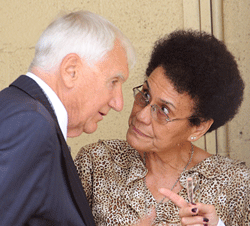 The later Peter Williams with Samisoni
The later Peter Williams with Samisoni Auckland barrister wins drawn-out Fijian human rights case
Charges have finally been dropped against a businesswoman and grandmother who was ousted from Fiji parliament by a military coup 10 years ago and charged with inciting violence almost five years ago.
The case was being defended by prominent Queen's Counsel Peter Williams until his death last year and had been picked up by his widow Lady Heeni Phillips-Williams.
Dr Mere Samisoni, 74 was a member of parliament in Fiji's last elected government which was deposed by military coup in 2006. In early 2012, she was charged by the regime with incitement to political violence.
Following a "voir dire" hearing before a trial magistrate at Suva today, the prosecuting State had reassessed it position and announced it now would not be proceeding against Dr Samisoni.
A "nolle prosequi" was granted this morning, meaning the State would not be prosecuting the case.
Appearing at the Suva Magistrates Court today, New Zealand based barrister, Lady Heeni Phillips-Williams said: " I am very happy this case had finally come to its rightful conclusion for Mere Samisoni. Dr Samisoni had literally been to hell and back since charged in 2012."
Lady Heeni said the case had wider significance than the individuals involved.
" The legal grounds raised at the voir dire hearing were important from a human rights perspective and the point of view of the administration of justice in Fiji."
The grounds raised at the hearing included:
* A lack of electronic recording at police station when statements were taken by police officer
* Dr Samisoni being held in police custody for five days in police cells without proper legal authority
* The long periods without a lawyer whilst accused persons were held in custody
* The appalling conditions and lack of hygiene in police cells
* Breaching judges rules in cross examination when police took statements from accused
* Not showing co accused statements to accused.
"For Fijian democracy to be more effective and not seen as lip service there must be big improvements," said Lady Heeni.
Following the Bainimarama led military coup of 2006 various military decrees came into force.
Dr Samisoni was charged under a military decree violation of "urging political violence".
She had enlisted Sir Peter Williams QC and Lady Heeni Phillips-Williams, the former Ballu Khan lawyers to act for her.
Lady Heeni said her late husband "Sir Peter would be smiling with this wonderful outcome.
"He had always described Mere Samisoni, a former politician, a wonderful woman and he had been determined to finish off her case for her."
She said Dr Samison's health has suffered through the drawn-out ordeal.
"We are over the moon," Lady Heeni said. "She's been today coughing but it didn't stop us from having a celebratory drink."
Source: http://m.nzherald.co.nz/aucklander/news/article.cfm?c_id=1503378&objectid=11766874
Charges have finally been dropped against a businesswoman and grandmother who was ousted from Fiji parliament by a military coup 10 years ago and charged with inciting violence almost five years ago.
The case was being defended by prominent Queen's Counsel Peter Williams until his death last year and had been picked up by his widow Lady Heeni Phillips-Williams.
Dr Mere Samisoni, 74 was a member of parliament in Fiji's last elected government which was deposed by military coup in 2006. In early 2012, she was charged by the regime with incitement to political violence.
Following a "voir dire" hearing before a trial magistrate at Suva today, the prosecuting State had reassessed it position and announced it now would not be proceeding against Dr Samisoni.
A "nolle prosequi" was granted this morning, meaning the State would not be prosecuting the case.
Appearing at the Suva Magistrates Court today, New Zealand based barrister, Lady Heeni Phillips-Williams said: " I am very happy this case had finally come to its rightful conclusion for Mere Samisoni. Dr Samisoni had literally been to hell and back since charged in 2012."
Lady Heeni said the case had wider significance than the individuals involved.
" The legal grounds raised at the voir dire hearing were important from a human rights perspective and the point of view of the administration of justice in Fiji."
The grounds raised at the hearing included:
* A lack of electronic recording at police station when statements were taken by police officer
* Dr Samisoni being held in police custody for five days in police cells without proper legal authority
* The long periods without a lawyer whilst accused persons were held in custody
* The appalling conditions and lack of hygiene in police cells
* Breaching judges rules in cross examination when police took statements from accused
* Not showing co accused statements to accused.
"For Fijian democracy to be more effective and not seen as lip service there must be big improvements," said Lady Heeni.
Following the Bainimarama led military coup of 2006 various military decrees came into force.
Dr Samisoni was charged under a military decree violation of "urging political violence".
She had enlisted Sir Peter Williams QC and Lady Heeni Phillips-Williams, the former Ballu Khan lawyers to act for her.
Lady Heeni said her late husband "Sir Peter would be smiling with this wonderful outcome.
"He had always described Mere Samisoni, a former politician, a wonderful woman and he had been determined to finish off her case for her."
She said Dr Samison's health has suffered through the drawn-out ordeal.
"We are over the moon," Lady Heeni said. "She's been today coughing but it didn't stop us from having a celebratory drink."
Source: http://m.nzherald.co.nz/aucklander/news/article.cfm?c_id=1503378&objectid=11766874
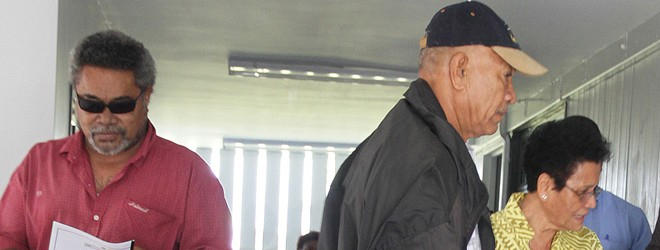
It was earlier alleged that Mere Samisoni and Semisi Lasike, together with Apete Vereti, urged one Waisea Kaloumaira to burn down Suva City in December, five years ago. It was also alleged that in 2011, between the months of September and December the three intentionally conspired to overthrow the government by force of violence. Bail has been extended for Vereti and he will appear in court on the 31st next month.
Mere Samisoni and her co-accused were not the only ones to be grinded down by Fiji's legal system: DPP withdraws case against 4 senior Methodist Church members - "The church says the fact that those accused suffered physically and emotionally as this case dragged on for seven years, and that two of the church leaders [Tuikilakila Waqairatu and Manasa Lasaro] who were charged are not alive to see their names cleared, saddens the church."
The Director of Public Prosecutions has withdrawn a case against four senior members of the Methodist Church in Fiji. A Nolle Prosequi was filled at the Suva Magistrates Court yesterday.
Ame Tugaue and Tuikilakila Waqairatu were charged with one count each of Organizing a meeting in Contravention of an Order while Tomasi Kanailagi and Manasa Lasaro were each charged with one count of participating in a meeting in contravention of an order contrary to the Public Emergency Regulations 2009.
Tuikilakila Waqairatu and Manasa Lasaro have passed away. Meanwhile the Methodist Church in Fiji has released a statement saying they have considered the Nolle Prosequi filed by the DPP and while they are glad that this saga is over, they are concerned that this was justice delayed.
The church says the fact that those accused suffered physically and emotionally as this case dragged on for seven years, and that two of the church leaders who were charged are not alive to see their names cleared, saddens the church. The matter was called before Magistrate Shageeth Somaratne. Source: Fijivillage News, 14 December 2016
Ame Tugaue and Tuikilakila Waqairatu were charged with one count each of Organizing a meeting in Contravention of an Order while Tomasi Kanailagi and Manasa Lasaro were each charged with one count of participating in a meeting in contravention of an order contrary to the Public Emergency Regulations 2009.
Tuikilakila Waqairatu and Manasa Lasaro have passed away. Meanwhile the Methodist Church in Fiji has released a statement saying they have considered the Nolle Prosequi filed by the DPP and while they are glad that this saga is over, they are concerned that this was justice delayed.
The church says the fact that those accused suffered physically and emotionally as this case dragged on for seven years, and that two of the church leaders who were charged are not alive to see their names cleared, saddens the church. The matter was called before Magistrate Shageeth Somaratne. Source: Fijivillage News, 14 December 2016
↧
THE DEBT STORM: 'Fiji is destined to stumble along until its Public Debt nightmare becomes reality for future generations, by which time those in power will have left to enjoy their ill-gotten gains, hidden in tax havens...'
"Few analysts, if any, will look at Bainimarama’s dangerous long term impact on the welfare of future generations, through unsustainable increases in public debt, just as no one today, remembers the SVT Government’s blow to our public debt twenty years ago, because taxpayers had to pay for the $200 million National Bank of Fiji disaster, caused by Rabuka’s 1987 coup. People and voters have a short memory, or they only look at their short term benefits (the hand-outs), or they don’t care, because Public Debt is an invisible evil not to be seen or felt directly. Did those who recently elected Rabuka as Leader of SODELPA think about his role in losing Fiji taxpayers $200 million some twenty years ago? No one was ever convicted of wrong doing or held responsible for that disaster. Even one of the NBF Chairman at the time (a senior civil servant) publicly alleged that NBF losses were being exaggerated: he has been one of those taking a leading international role in supporting and legitimizing Bainimarama’s Government, and yet another important role in a leading tertiary academic institution in Fiji (birds of a feather….?) One of the bad debtors of NBF, an avowed ethno-nationalist, is even a minister in the Bainimarama Government" - Professor Wadan Narsey

By Professor WADAN NARSEY
Part Two: Fiji’s Sleeping Public Debt Nightmares
This month, a common theme for the local and international media will be the impact of the Bainimarama Government on Fiji since the military coup of 2006 (the fad phrase: “Bainimarama @10”There will be much deserved praise for doing what many of us have been calling for decades- ensuring increased freer access to education, from preschool right up to tertiary; improved access to health care, the frequent public appeal for racial equality and common national identity, and a few others.
Critics will focus on the many negatives such as the undermining of human rights in so many ways (including the selective application of the law) , the curbing of media freedom, the imposition of a constitution and other institutional changes without people’s consent, nepotism, the lack of accountability and transparency in the use of tax-payers’ funds, the undermining of the indigenous Fijian language, to name just a few.Few analysts, if any, will look at Bainimarama’s dangerous long term impact on the welfare of future generations, through unsustainable increases in public debt, just as no one today, remembers the SVT Government’s blow to our public debt twenty years ago, because taxpayers had to pay for the $200 million National Bank of Fiji disaster, caused by Rabuka’s 1987 coup.
Yet unwise increases in public debt, originating in hasty, unwise and excessive government investments OR investment blunders OR guarantees of bankrupt inefficient public enterprises badly manged by government-appointed boards, will silently but surely erode the welfare of future generations, just as cancers silently destroy the fabric of a human body over time.
The Fiji public ought to learn about the recent experience of bankrupt nations like Greece, whose public debt made them the beggars of Europe.
Here I explain Fiji’s public debt nightmares, that the sleeping Fiji public have not yet dreamed.
The “Supernatural” Public Debt
Normal elected governments have the almost supernatural “authority” to borrow and increase “Public Debt” on behalf of tax payers, not just of today, but of future generations who have no say in the matter at all, yet must pay the debt when it comes due.
Imagine, if you borrowed money from a bank and declared, without their permission, that your wife, children and grandchildren, and others, will repay the debt when you are gone (either dead or emigrated). It is accepted that all governments raise taxes from residents of a country, and spend the revenues on the public service and on productive capital expenditure, such as roads, electricity, sewerage, ports, schools, hospitals. When their planned expenditure is more than their planned revenues, they borrow either domestically, such as from Fiji National Provident Fund, or abroad from international lenders (such as by selling bonds), thereby increasing the “Public Debt”. The increase in public debt is justified if these expenditures lead to increased economic growth and national incomes, which hopefully will pay for the loans, eventually.
But governments can also borrow in order to spend irresponsibly (like increasing civil service salaries just before an election, or excessive and unwise spending on infrastructure) or to clean up after financial disasters of publicly owned state enterprises like the National Bank of Fiji (NBF) or Fiji Sugar Corporation (FSC).
Who gives “governments” the authority to borrow on people’s behalf?
When governments are elected then it is the voters at the election who implicitly give that authority to the government, even if public debt might not even be an important issue in the elections.
But when the military seizes the power of government through military coups, then they and their supporters assume that authority and power, by force. In 1987, Rabuka seized power, for all kinds of alleged reasons, but somewhere on the way, he also replaced the manager of NBF by his own chosen bloke (Visanti Makrava), who, with the help of other staff and slumber of board members, ran the NBF into bankruptcy, through corrupt lending to friends and cronies of the Rabuka Government. The depositors in NBF were saved by the Rabuka Government injecting $200 millions of taxpayers funds, which had to be borrowed, thereby increasing Fiji’s Public Debt by $200 million, essentially to cover a man-made disaster.
Fiji’s economic growth was eventually reduced by this wasteful increase in public debt.
And again, Bainimarama
More recently, Bainimarama seized power in 2006 through another military coup, again alleging all kinds of unsubstantiated reasons, and ran Fiji for eight years as an unelected military government.
He eventually became an elected Prime Minister in 2014, through judicious use of hand-outs of tax-payers money, rhetoric of racial equality, draconian curbs on opposition parties, and a docile Electoral Commission and subservient cherubic Supervisor of Elections. Through its spending policies, the Bainimarama Government raised Fiji’s Public Debt from $2,863 million in 2006 to around $4,969 million in 2016-17, an increase of more than $2 billion. Those who supported the 2006 military coup (including many from overseas) and those who voted Bainimarama into power in 2014, never thought of the consequences of this massive increase in public debt, for the future generations, while enjoying all the benefits that Bainimarama threw their way.
No civil servant in the Ministry of Finance or at the Reserve Bank of Fiji has ever enlightened the public, on the grave dangers of this cancerous “public debt”.
How is “public” debt created and paid?
On every annual Budget Estimate document the “Public Debt Charges” are shown on the first page, alongside Total Expenditure and Total Revenue (often not very clearly). Public Debt Charges comprise the principal component which is the return of the original loan amount (depending on the number of years of the loan) and the interest component, which depends on the interest rate agreed to with the lenders. If expected Total Expenditure (including Public Debt Charges) exceeds Expected Total Revenue, there is a “Net Deficit” which must again be borrowed, i.e. thereby increasing Public Debt further.
If you then add the Net Deficit to Public Debt Charges, you get the “Gross Deficit” a better indicator of the current impact of Public Debt, also usually shown on the first page of the Annual Budget Estimates. Sometimes, governments artificially reduce both the Net Deficit and the Gross Deficit by including in recurrent revenues, the proceeds of public asset sales, often deceptively labelled as “proceeds of investments”. But the bottom line is that “demon” of Public Debt Charges MUST be paid annually, before the government can allocate a single penny to other items such as civil service salaries or capital expenditure. The larger the charges on Public Debt, the lower is the amount available for other government expenditure, such as education or health or welfare.
It is fairly easy to understand what happens if you, an ordinary citizen, borrows money from a bank and is unable to repay on time: you lose your assets which you offered as collateral for the loan.
But the nightmare implications of unsustainable Public Debt is enormously difficult to explain, even for the best of economists or accountants.
The Fiji Example
Fiji’s “Public Debt” is comprised of many loans, borrowed from different sources, at many different interest rates, with many different due dates for settlement. Fiji’s average rate of interest has been around 7%, although at times, the Government has unwisely also borrowed at 9%, and from overseas lenders. Between 2006 and 2016, with its free spending policies, the Bainimarama Government increased Fiji’s Public Debt from $2,863 million to $4,969 million, an addition of roughly $2 billions new debt (what we know about).
Table 1 tells you that Fiji’s Public Debt Charges, assuming an interest rate of 7% per annum, with the loans being repaid in equal instalments over 20 years, increased from $246 million in 2006 to $430 millions in 2016.
https://narseyonfiji.wordpress.com/2016/12/03/fijis-sleeping-public-debt-nightmares-ed-in-ft-3122016/
These Public Debt Charges MUST be paid BEFORE government can make any other expenditure allocation to education or health or other capital investments.
If the increases in Public Debt have been used productively and efficiently, the increased economic growth is able to pay the Public Debt Charges.
If the economy does not grow fast enough, then the Public Debt becomes a horrible cancer that quietly eats away at future government revenues and expenditure, and threatens people’s standards of living, as in Greece recently.
What does it mean for you?
To the average person, these big numbers mean nothing. So let me tell you what it means for your household. By 2006, all previous governments had borrowed on your behalf some $17,000 per household, costing you 7% annually, or about $1,190 per year in extra taxes, or some $52,000 over your lifetime (44 years of adult life).
What was this debt for? The Suva-Nadi highway; the Monosavu Dam; a few hospitals; a port or two; not forgetting Rabuka’s blunder with the National Bank of Fiji. Then the Bainimarama Government increased your household debt to $24,800, with you paying $1,736 per year, or some $76,000 over your life time. Ask yourself, what has been this increase in your household debt due to? I suggest that it has been due to massive hasty increases in expenditure on roads and the numerous wasteful hand-outs (not the free education and medicines schemes).
The inefficient investment nightmare
Fiji’s increase of $2 billion in Public Debt is largely due to the massive increase in taxpayers’ funds allocated to in road building, in just four brief years, which the small Fiji economy could not absorb efficiently.
When an expensive road is built somewhere, in a rural area or to a tourist destination, of course, the beneficiaries naturally and profusely thank the government ministers (with salusalus and feasts), all duly reported by the media. Few people ever ask if these were wise investments justified by economic returns. Responsible international organizations like the Asian Development Bank, before they make any loans, usually conduct thorough Cost Benefit Analyses to make sure that the economic rate of return on the investments is higher than the interest rate on the loan.
Did the Bainimarama Government do detailed rates of return analysis on their many hurried investments? I doubt it. My personal assessment is that the sum aggregate of the benefits of these hurried and excessive investments do not justify massive increase in Public Debt and increased annual Public Debt Charges of $184 million. There have been revelations that some foreign companies have been making a killing, even leading to the Fiji Roads Authority refusing to pay some exorbitant invoices.
There is anecdotal but credible evidence that many of the expatriate contracting companies (not the Chinese ones) have been making so much profits that they have been able to pay exorbitant salaries, massive rents for accommodation, new four wheel drives, and high education allowances for children, not to mention their house-girls, gardeners and cooks.
The Fiji public has so easily forgotten that once upon a time our Public Works Department, every if inefficient, used to do similar work for one tenth the budget that the Bainimarama Government has splashed on these expatriate roads companies, whose senior salaries are in the hundreds of thousands of dollars, in addition to their profit margins.
Fiji’s gullible public are impressed with press releases by expatriate experts on how many potholes have been filled, and how Fiji’s weather conditions explain why newly built roads are easily washed away, requiring more taxpayers’ funds.
The borrowing overseas nightmare
For most countries, borrowing locally is more manageable for governments since they can totally control lenders like FNPF (even if it is fundamentally wrong for a borrower to control the lender).
Or governments can just “print money” to pay local lenders (even if it is morally wrong as it leads to inflation and reduces the value of everyone’s savings.
But borrowing internationally can be a nightmare, because international lenders demand internationally competitive interest rates, and they must be repaid in foreign exchange, not local currency.
Not too long ago, the Bainimarama Government went on an international roadshow (led strangely by ANZ Bank), and borrowed more than $500 million internationally through bonds costing us 9% interest. IMF had offered the same loans at 2% interest. Fiji taxpayers have been unnecessarily paying $40 million extra in interest.
So who made this horrible decision that will cost Fiji taxpayers more than $400 million extra over ten years? The Prime Minister and Finance Minister then (Bainimarama)? Or the Attorney General then and current Finance Minister (Aiyaz Khaiyumm)?
Or was it the PS Finance then (Filimone Waqabaca), who in 2011 informed the packed USP lecture theatre that the deal was made in heaven and he was being guided by God? (apparently God has now guided him to take a appointment as Fiji’s High Commissioner in NZ).
Was that highly costly external loan encouraged by the ANZ CEO who, when asked why the mighty ANZ did not itself lend the money to Fiji, left in the middle of the USP panel discussion stating he had dinner commitments at home (would he treat an elite audience so contemptuously in Australia)?
Whoever made this disastrous financial decision, taxpayers can imagine what difference it would make to the Health Department to receive $40 million extra annually for ten years, amounting to $400 million altogether. How many more hospitals, doctors, nurses, free medicines, surgeries could taxpayers have received, had the Bainimarama Government not made the stupid decision to borrow internationally when IMF funds were available at lower cost?
The state enterprise nightmare
How many of you taxpayers have worried about your pockets when the bad news have dribbled out about the losses being made by state enterprises like Fiji Sugar Cooperation?
Yet the Bainimarama Government not only appointed him as Executive Chairman without going through due process, but also guaranteed FSC’s loans, which I suspect FSC is never going to be able to repay. This Executive Chairman and CEO has for several years kept issuing optimistic announcements and thanking Bainimarama for his visionary leadership of the sugar industry which has totally collapsed, while refusing public calls for him to reveal his salaries and perks.
But this CEO has recently and suddenly resigned, supposedly for health reasons but simultaneously stating that he would like to devote more of his allegedly sick time, to personal business interests. Whatever, you taxpayers are going to repay all the debts that have been incurred by this state enterprise and its unaccountable but well paid management.
How much will you be paying? Who knows. Ask the Minister for Sugar or the Minister of Economy (and All Things Important in Fiji). There is similarly no knowledge about taxpayer liabilities at another government guaranteed entity, the Fiji Development Bank. Nor has the public been given the reports on some investments incurred by the Fiji National Provident Fund in Natadola and Momi, with large “write-downs” of asset values. You taxpayers, who are going to foot the bill eventually, have no say whatsoever on the management of these state companies and their board membership.
Like lambs to the slaughter, you accept blindly and meekly, the dictates of a military leader (who once promised that no military personnel will ever benefit from his military coup) and those who ride joyously on his shoulders.
There is no universal standard
Whatever advice the “expert” international organisations give, there is no universal standard for Public Debt as a Percentage of GDP or even of Government Revenue.
There are many highly indebted countries (like United States, Australia. NZ and Canada) which have borrowed heavily for more than two centuries, spending the funds very productively on good public infrastructure which today contributes to their high incomes, productivity and ability to service their debts.There are also countries with low Debt to GDP ratios, whose governments have squandered their borrowings, resulting in low economic growth.Unfortunately, governments can be elected for any number of reasons, nothing to do with its financial responsibility in running the country.
Yes, they may be elected for bringing development benefits to the voters such as freeing up education through grants and loans, building new roads, providing water services, sewerage, etc. But governments can also be elected for giving handouts, or generous increases in civil service salaries just before an elections. Governments can also be popular with some ethnic groups for insisting that all people be called “Fijians” in order to make them feel they belong; or for apologizing for past coups which drove people out of Fiji, such as the 1987 and 2000 coups (even if key figures in the government may themselves have been involved in some of the coups).
A militarized government may received votes if voters think that this would prevent another coup (a bit like allowing a gang of thieves to control your house so that other thieves do not rob you).
No government in Fiji has ever been elected or opposed on the basis of their policies on Public Debt.
Who Bears the Burden of Public Debt?
The burden of the public debt will be paid by:
* those who pay taxes, which is increasingly Value Added Tax falling on the poor and middle classes. The rich and the companies are paying less and less because the Bainimarama Government has been reducing their tax rates;
* workers whose wages are restricted by government to please employers;.
* people who do not receive expenditure benefits which go to the rich;
* future generations whose public assets are sold off by governments today in order to reduce net deficits;
* All those with their FNPF savings whose returns were forcibly reduced by the Bainimarama Government from 15% to 9%, thereby giving Government even more access to our savings, at low interest rates.
Who will NOT bear the burden of Public Debt
Looking at the experience of Fiji these last thirty years since Rabuka’s 1987 coup, one can make a few generalizations about who will not be bearing the debt burden:
* foreign businesses and their employees;
* large local businesses (who shift their profits abroad);
* all the military and political leaders who have gained financially from the coups;
* all those former Fiji residents who came to Fiji, for whatever reason, and provided crucial support to a n unelected and fiscally irresponsible government in Fiji between 2006 and 2014;
* all those who are planning to emigrate;
There is no escape from Public Debt, except by emigrating (which educated and smart Fiji people will keep doing), or by dying (which is happening more frequently with reducing life expectancies in Fiji).
How do politicians get away with it?
People and voters have a short memory, or they only look at their short term benefits (the hand-outs), or they don’t care, because Public Debt is an invisible evil not to be seen or felt directly.
Did those who recently elected Rabuka as Leader of SODELPA think about his role in losing Fiji taxpayers $200 million some twenty years ago? No one was ever convicted of wrong doing or held responsible for that disaster.
Even one of the NBF Chairman at the time (a senior civil servant) publicly alleged that NBF losses were being exaggerated: he has been one of those taking a leading international role in supporting and legitimizing Bainimarama’s Government, and yet another important role in a leading tertiary academic institution in Fiji (birds of a feather….?)
One of the bad debtors of NBF, an avowed ethno-nationalist, is even a minister in the Bainimarama Government: http://www.coupfourandahalf.com/2010/05/bainimaramas-foreign-minister-inoke.html
A major problem is that military governments, however irresponsible financially, have easily received support and legitimization from powerful social forces such as corporate bodies (who benefit from massive tax cuts or lucrative contracts), religious organisations, social leaders, senior managers of universities (Vice Chancellors, Deans etc.) who not only openly support coup leaders but also suppress critical debate in their universities.
Some countries (for instance US) impose legal restrictions on how much the government can borrow on taxpayers’ behalf, and any excess must be specifically applied for to parliament, which can of course refuse.
But that in Fiji’s current situation would be a farce anyway, with the Opposition totally neutralized under an imposed constitution, and a Speaker exercising punitive powers over the Opposition.
Fiji’s senior public servants in the Ministry of Finance refuse to release what ought to be public reports on public debt.
The Reserve Bank of Fiji, while publishing useful information, is silent in the public domain despite.
Fiji’s senior economists (except for Dr Neelesh Gounder and Professor Biman Prasad) and senior accountants and auditors (too many to name) have silenced themselves, while enjoying the perks that come with their collaborative silence.
It seems that Fiji is destined to stumble along until one day, it’s Public Debt nightmare becomes the reality for its future generations, by which time most of those in power will have left to enjoy their ill-gotten gains, some stashed away in tax havens abroad.
Part One: http://www.fijileaks.com/home/professor-wadan-narsey-fijis-public-debt-and-the-sleeping-monitors
Part Two: Fiji’s Sleeping Public Debt Nightmares
This month, a common theme for the local and international media will be the impact of the Bainimarama Government on Fiji since the military coup of 2006 (the fad phrase: “Bainimarama @10”There will be much deserved praise for doing what many of us have been calling for decades- ensuring increased freer access to education, from preschool right up to tertiary; improved access to health care, the frequent public appeal for racial equality and common national identity, and a few others.
Critics will focus on the many negatives such as the undermining of human rights in so many ways (including the selective application of the law) , the curbing of media freedom, the imposition of a constitution and other institutional changes without people’s consent, nepotism, the lack of accountability and transparency in the use of tax-payers’ funds, the undermining of the indigenous Fijian language, to name just a few.Few analysts, if any, will look at Bainimarama’s dangerous long term impact on the welfare of future generations, through unsustainable increases in public debt, just as no one today, remembers the SVT Government’s blow to our public debt twenty years ago, because taxpayers had to pay for the $200 million National Bank of Fiji disaster, caused by Rabuka’s 1987 coup.
Yet unwise increases in public debt, originating in hasty, unwise and excessive government investments OR investment blunders OR guarantees of bankrupt inefficient public enterprises badly manged by government-appointed boards, will silently but surely erode the welfare of future generations, just as cancers silently destroy the fabric of a human body over time.
The Fiji public ought to learn about the recent experience of bankrupt nations like Greece, whose public debt made them the beggars of Europe.
Here I explain Fiji’s public debt nightmares, that the sleeping Fiji public have not yet dreamed.
The “Supernatural” Public Debt
Normal elected governments have the almost supernatural “authority” to borrow and increase “Public Debt” on behalf of tax payers, not just of today, but of future generations who have no say in the matter at all, yet must pay the debt when it comes due.
Imagine, if you borrowed money from a bank and declared, without their permission, that your wife, children and grandchildren, and others, will repay the debt when you are gone (either dead or emigrated). It is accepted that all governments raise taxes from residents of a country, and spend the revenues on the public service and on productive capital expenditure, such as roads, electricity, sewerage, ports, schools, hospitals. When their planned expenditure is more than their planned revenues, they borrow either domestically, such as from Fiji National Provident Fund, or abroad from international lenders (such as by selling bonds), thereby increasing the “Public Debt”. The increase in public debt is justified if these expenditures lead to increased economic growth and national incomes, which hopefully will pay for the loans, eventually.
But governments can also borrow in order to spend irresponsibly (like increasing civil service salaries just before an election, or excessive and unwise spending on infrastructure) or to clean up after financial disasters of publicly owned state enterprises like the National Bank of Fiji (NBF) or Fiji Sugar Corporation (FSC).
Who gives “governments” the authority to borrow on people’s behalf?
When governments are elected then it is the voters at the election who implicitly give that authority to the government, even if public debt might not even be an important issue in the elections.
But when the military seizes the power of government through military coups, then they and their supporters assume that authority and power, by force. In 1987, Rabuka seized power, for all kinds of alleged reasons, but somewhere on the way, he also replaced the manager of NBF by his own chosen bloke (Visanti Makrava), who, with the help of other staff and slumber of board members, ran the NBF into bankruptcy, through corrupt lending to friends and cronies of the Rabuka Government. The depositors in NBF were saved by the Rabuka Government injecting $200 millions of taxpayers funds, which had to be borrowed, thereby increasing Fiji’s Public Debt by $200 million, essentially to cover a man-made disaster.
Fiji’s economic growth was eventually reduced by this wasteful increase in public debt.
And again, Bainimarama
More recently, Bainimarama seized power in 2006 through another military coup, again alleging all kinds of unsubstantiated reasons, and ran Fiji for eight years as an unelected military government.
He eventually became an elected Prime Minister in 2014, through judicious use of hand-outs of tax-payers money, rhetoric of racial equality, draconian curbs on opposition parties, and a docile Electoral Commission and subservient cherubic Supervisor of Elections. Through its spending policies, the Bainimarama Government raised Fiji’s Public Debt from $2,863 million in 2006 to around $4,969 million in 2016-17, an increase of more than $2 billion. Those who supported the 2006 military coup (including many from overseas) and those who voted Bainimarama into power in 2014, never thought of the consequences of this massive increase in public debt, for the future generations, while enjoying all the benefits that Bainimarama threw their way.
No civil servant in the Ministry of Finance or at the Reserve Bank of Fiji has ever enlightened the public, on the grave dangers of this cancerous “public debt”.
How is “public” debt created and paid?
On every annual Budget Estimate document the “Public Debt Charges” are shown on the first page, alongside Total Expenditure and Total Revenue (often not very clearly). Public Debt Charges comprise the principal component which is the return of the original loan amount (depending on the number of years of the loan) and the interest component, which depends on the interest rate agreed to with the lenders. If expected Total Expenditure (including Public Debt Charges) exceeds Expected Total Revenue, there is a “Net Deficit” which must again be borrowed, i.e. thereby increasing Public Debt further.
If you then add the Net Deficit to Public Debt Charges, you get the “Gross Deficit” a better indicator of the current impact of Public Debt, also usually shown on the first page of the Annual Budget Estimates. Sometimes, governments artificially reduce both the Net Deficit and the Gross Deficit by including in recurrent revenues, the proceeds of public asset sales, often deceptively labelled as “proceeds of investments”. But the bottom line is that “demon” of Public Debt Charges MUST be paid annually, before the government can allocate a single penny to other items such as civil service salaries or capital expenditure. The larger the charges on Public Debt, the lower is the amount available for other government expenditure, such as education or health or welfare.
It is fairly easy to understand what happens if you, an ordinary citizen, borrows money from a bank and is unable to repay on time: you lose your assets which you offered as collateral for the loan.
But the nightmare implications of unsustainable Public Debt is enormously difficult to explain, even for the best of economists or accountants.
The Fiji Example
Fiji’s “Public Debt” is comprised of many loans, borrowed from different sources, at many different interest rates, with many different due dates for settlement. Fiji’s average rate of interest has been around 7%, although at times, the Government has unwisely also borrowed at 9%, and from overseas lenders. Between 2006 and 2016, with its free spending policies, the Bainimarama Government increased Fiji’s Public Debt from $2,863 million to $4,969 million, an addition of roughly $2 billions new debt (what we know about).
Table 1 tells you that Fiji’s Public Debt Charges, assuming an interest rate of 7% per annum, with the loans being repaid in equal instalments over 20 years, increased from $246 million in 2006 to $430 millions in 2016.
https://narseyonfiji.wordpress.com/2016/12/03/fijis-sleeping-public-debt-nightmares-ed-in-ft-3122016/
These Public Debt Charges MUST be paid BEFORE government can make any other expenditure allocation to education or health or other capital investments.
If the increases in Public Debt have been used productively and efficiently, the increased economic growth is able to pay the Public Debt Charges.
If the economy does not grow fast enough, then the Public Debt becomes a horrible cancer that quietly eats away at future government revenues and expenditure, and threatens people’s standards of living, as in Greece recently.
What does it mean for you?
To the average person, these big numbers mean nothing. So let me tell you what it means for your household. By 2006, all previous governments had borrowed on your behalf some $17,000 per household, costing you 7% annually, or about $1,190 per year in extra taxes, or some $52,000 over your lifetime (44 years of adult life).
What was this debt for? The Suva-Nadi highway; the Monosavu Dam; a few hospitals; a port or two; not forgetting Rabuka’s blunder with the National Bank of Fiji. Then the Bainimarama Government increased your household debt to $24,800, with you paying $1,736 per year, or some $76,000 over your life time. Ask yourself, what has been this increase in your household debt due to? I suggest that it has been due to massive hasty increases in expenditure on roads and the numerous wasteful hand-outs (not the free education and medicines schemes).
The inefficient investment nightmare
Fiji’s increase of $2 billion in Public Debt is largely due to the massive increase in taxpayers’ funds allocated to in road building, in just four brief years, which the small Fiji economy could not absorb efficiently.
When an expensive road is built somewhere, in a rural area or to a tourist destination, of course, the beneficiaries naturally and profusely thank the government ministers (with salusalus and feasts), all duly reported by the media. Few people ever ask if these were wise investments justified by economic returns. Responsible international organizations like the Asian Development Bank, before they make any loans, usually conduct thorough Cost Benefit Analyses to make sure that the economic rate of return on the investments is higher than the interest rate on the loan.
Did the Bainimarama Government do detailed rates of return analysis on their many hurried investments? I doubt it. My personal assessment is that the sum aggregate of the benefits of these hurried and excessive investments do not justify massive increase in Public Debt and increased annual Public Debt Charges of $184 million. There have been revelations that some foreign companies have been making a killing, even leading to the Fiji Roads Authority refusing to pay some exorbitant invoices.
There is anecdotal but credible evidence that many of the expatriate contracting companies (not the Chinese ones) have been making so much profits that they have been able to pay exorbitant salaries, massive rents for accommodation, new four wheel drives, and high education allowances for children, not to mention their house-girls, gardeners and cooks.
The Fiji public has so easily forgotten that once upon a time our Public Works Department, every if inefficient, used to do similar work for one tenth the budget that the Bainimarama Government has splashed on these expatriate roads companies, whose senior salaries are in the hundreds of thousands of dollars, in addition to their profit margins.
Fiji’s gullible public are impressed with press releases by expatriate experts on how many potholes have been filled, and how Fiji’s weather conditions explain why newly built roads are easily washed away, requiring more taxpayers’ funds.
The borrowing overseas nightmare
For most countries, borrowing locally is more manageable for governments since they can totally control lenders like FNPF (even if it is fundamentally wrong for a borrower to control the lender).
Or governments can just “print money” to pay local lenders (even if it is morally wrong as it leads to inflation and reduces the value of everyone’s savings.
But borrowing internationally can be a nightmare, because international lenders demand internationally competitive interest rates, and they must be repaid in foreign exchange, not local currency.
Not too long ago, the Bainimarama Government went on an international roadshow (led strangely by ANZ Bank), and borrowed more than $500 million internationally through bonds costing us 9% interest. IMF had offered the same loans at 2% interest. Fiji taxpayers have been unnecessarily paying $40 million extra in interest.
So who made this horrible decision that will cost Fiji taxpayers more than $400 million extra over ten years? The Prime Minister and Finance Minister then (Bainimarama)? Or the Attorney General then and current Finance Minister (Aiyaz Khaiyumm)?
Or was it the PS Finance then (Filimone Waqabaca), who in 2011 informed the packed USP lecture theatre that the deal was made in heaven and he was being guided by God? (apparently God has now guided him to take a appointment as Fiji’s High Commissioner in NZ).
Was that highly costly external loan encouraged by the ANZ CEO who, when asked why the mighty ANZ did not itself lend the money to Fiji, left in the middle of the USP panel discussion stating he had dinner commitments at home (would he treat an elite audience so contemptuously in Australia)?
Whoever made this disastrous financial decision, taxpayers can imagine what difference it would make to the Health Department to receive $40 million extra annually for ten years, amounting to $400 million altogether. How many more hospitals, doctors, nurses, free medicines, surgeries could taxpayers have received, had the Bainimarama Government not made the stupid decision to borrow internationally when IMF funds were available at lower cost?
The state enterprise nightmare
How many of you taxpayers have worried about your pockets when the bad news have dribbled out about the losses being made by state enterprises like Fiji Sugar Cooperation?
Yet the Bainimarama Government not only appointed him as Executive Chairman without going through due process, but also guaranteed FSC’s loans, which I suspect FSC is never going to be able to repay. This Executive Chairman and CEO has for several years kept issuing optimistic announcements and thanking Bainimarama for his visionary leadership of the sugar industry which has totally collapsed, while refusing public calls for him to reveal his salaries and perks.
But this CEO has recently and suddenly resigned, supposedly for health reasons but simultaneously stating that he would like to devote more of his allegedly sick time, to personal business interests. Whatever, you taxpayers are going to repay all the debts that have been incurred by this state enterprise and its unaccountable but well paid management.
How much will you be paying? Who knows. Ask the Minister for Sugar or the Minister of Economy (and All Things Important in Fiji). There is similarly no knowledge about taxpayer liabilities at another government guaranteed entity, the Fiji Development Bank. Nor has the public been given the reports on some investments incurred by the Fiji National Provident Fund in Natadola and Momi, with large “write-downs” of asset values. You taxpayers, who are going to foot the bill eventually, have no say whatsoever on the management of these state companies and their board membership.
Like lambs to the slaughter, you accept blindly and meekly, the dictates of a military leader (who once promised that no military personnel will ever benefit from his military coup) and those who ride joyously on his shoulders.
There is no universal standard
Whatever advice the “expert” international organisations give, there is no universal standard for Public Debt as a Percentage of GDP or even of Government Revenue.
There are many highly indebted countries (like United States, Australia. NZ and Canada) which have borrowed heavily for more than two centuries, spending the funds very productively on good public infrastructure which today contributes to their high incomes, productivity and ability to service their debts.There are also countries with low Debt to GDP ratios, whose governments have squandered their borrowings, resulting in low economic growth.Unfortunately, governments can be elected for any number of reasons, nothing to do with its financial responsibility in running the country.
Yes, they may be elected for bringing development benefits to the voters such as freeing up education through grants and loans, building new roads, providing water services, sewerage, etc. But governments can also be elected for giving handouts, or generous increases in civil service salaries just before an elections. Governments can also be popular with some ethnic groups for insisting that all people be called “Fijians” in order to make them feel they belong; or for apologizing for past coups which drove people out of Fiji, such as the 1987 and 2000 coups (even if key figures in the government may themselves have been involved in some of the coups).
A militarized government may received votes if voters think that this would prevent another coup (a bit like allowing a gang of thieves to control your house so that other thieves do not rob you).
No government in Fiji has ever been elected or opposed on the basis of their policies on Public Debt.
Who Bears the Burden of Public Debt?
The burden of the public debt will be paid by:
* those who pay taxes, which is increasingly Value Added Tax falling on the poor and middle classes. The rich and the companies are paying less and less because the Bainimarama Government has been reducing their tax rates;
* workers whose wages are restricted by government to please employers;.
* people who do not receive expenditure benefits which go to the rich;
* future generations whose public assets are sold off by governments today in order to reduce net deficits;
* All those with their FNPF savings whose returns were forcibly reduced by the Bainimarama Government from 15% to 9%, thereby giving Government even more access to our savings, at low interest rates.
Who will NOT bear the burden of Public Debt
Looking at the experience of Fiji these last thirty years since Rabuka’s 1987 coup, one can make a few generalizations about who will not be bearing the debt burden:
* foreign businesses and their employees;
* large local businesses (who shift their profits abroad);
* all the military and political leaders who have gained financially from the coups;
* all those former Fiji residents who came to Fiji, for whatever reason, and provided crucial support to a n unelected and fiscally irresponsible government in Fiji between 2006 and 2014;
* all those who are planning to emigrate;
There is no escape from Public Debt, except by emigrating (which educated and smart Fiji people will keep doing), or by dying (which is happening more frequently with reducing life expectancies in Fiji).
How do politicians get away with it?
People and voters have a short memory, or they only look at their short term benefits (the hand-outs), or they don’t care, because Public Debt is an invisible evil not to be seen or felt directly.
Did those who recently elected Rabuka as Leader of SODELPA think about his role in losing Fiji taxpayers $200 million some twenty years ago? No one was ever convicted of wrong doing or held responsible for that disaster.
Even one of the NBF Chairman at the time (a senior civil servant) publicly alleged that NBF losses were being exaggerated: he has been one of those taking a leading international role in supporting and legitimizing Bainimarama’s Government, and yet another important role in a leading tertiary academic institution in Fiji (birds of a feather….?)
One of the bad debtors of NBF, an avowed ethno-nationalist, is even a minister in the Bainimarama Government: http://www.coupfourandahalf.com/2010/05/bainimaramas-foreign-minister-inoke.html
A major problem is that military governments, however irresponsible financially, have easily received support and legitimization from powerful social forces such as corporate bodies (who benefit from massive tax cuts or lucrative contracts), religious organisations, social leaders, senior managers of universities (Vice Chancellors, Deans etc.) who not only openly support coup leaders but also suppress critical debate in their universities.
Some countries (for instance US) impose legal restrictions on how much the government can borrow on taxpayers’ behalf, and any excess must be specifically applied for to parliament, which can of course refuse.
But that in Fiji’s current situation would be a farce anyway, with the Opposition totally neutralized under an imposed constitution, and a Speaker exercising punitive powers over the Opposition.
Fiji’s senior public servants in the Ministry of Finance refuse to release what ought to be public reports on public debt.
The Reserve Bank of Fiji, while publishing useful information, is silent in the public domain despite.
Fiji’s senior economists (except for Dr Neelesh Gounder and Professor Biman Prasad) and senior accountants and auditors (too many to name) have silenced themselves, while enjoying the perks that come with their collaborative silence.
It seems that Fiji is destined to stumble along until one day, it’s Public Debt nightmare becomes the reality for its future generations, by which time most of those in power will have left to enjoy their ill-gotten gains, some stashed away in tax havens abroad.
Part One: http://www.fijileaks.com/home/professor-wadan-narsey-fijis-public-debt-and-the-sleeping-monitors
SVT'S party secretary EMA DRUAVESI, 7 May 1999: RABUKA IS NO AUGUSTO PINOCHET: "By no means can Prime Minister [Sitiveni Rabuka] be compared to the brutal dictator Pinochet, nor can we compare the 1987 coups to the coups in Chile in 1973 and what happened there...With the exception of Victor Lal, I do not think any Fijian or Indian overseas will want to waste his or her time and money trying to take Rabuka to court"; a day before Victor Lal had outlined two possible charges against Rabuka, one of treason and another of torture and kidnapping, based on the arrest of the Chilean military dictatror Pinochet in London.
↧
↧
MILKING school position: Naidovi Primary School manager accused of stealing two cartons of milk from Class One students for his daughter's WEDDING. Worst, the school manager is Justice of Peace in Sigatoka
The parents fear that given his position in society, the Education Ministry will cover-up the incident which occurred two weeks ago
The School Manager tried to fanatically defend the head teacher Sashi Kumar after Fijileaks had revealed that Kumar had assaulted a student; later Kumar was demoted and transferred to another school in Lautoka
From Fijileaks Archive, 26 October 2015:
"[The student] was assaulted by headteacher [Sashi Kumar] today in school. Received 2 punches to scalp, then was hit with stick on back, and on left leg" - Sigatoka Hospital Medical Report, 13 October 2015; Fijileaks understands Kumar was also under investigation for alleged corruption
The Head Teacher of Naidovi Primary School in Sigatoka (Mr Sashi Kumar) is the principal assailant in the medical report. Kumar beat the Class 3 student in the school resulting in the student getting serious injuries on his leg and head. A police report and a medical report was done and the Education Ministry, surprisingly, has not SUSPENDED the head teacher from the school. To make it worse, they have settled the police case (which was lodged earlier) without considering the welfare of the Class 3 student, who not only has to face the Head Teacher KUMAR on a daily basis but is now paralyzed with FEAR during school hours and also whenever he runs into the student beater SASHI KUMAR
↧
"The 15 people whom you trafficked were all Fijian residents. They each responded to advertisements in the Fiji Sun newspaper". NZ Judge as he jails Fijian national FAROZ ALI for 9 and half years for people trafficking
"Ms Vetanivula had to pay for her own meals. While in Tauranga, she slept on mattresses on the floor of the basement of an associate’s house at Pye’s Pa. The bedding, they had to purchase themselves.There was a lack of privacy. The man slept in the same room as the three women. He turned to the wall to avoid seeing them when they changed into other clothing. For the women to have to sleep in the same room as the man was embarrassing and stressful to them, as well as culturally inappropriate. Ms Vetanivula was also required to pay for accommodation, food and transport, to and from the orchard. Those costs were deducted from her wages."
"All of the victims were vulnerable individuals. Most had little in the way of income or assets. Most had borrowed significant sums from relatives or communal funds operated in their respective villages to meet the fees. The amounts paid to the travel agencies were grossly disproportionate to the amount of money that each of the victims could earn in Fiji. The fees charged in Fiji were, on the evidence I heard, extortionate in nature. I reach the same conclusion, that you, Geeta and Sanjana were each involved as participants in a joint criminal enterprise designed to extract money from each of the complainants in Fiji, to induce them to travel to New Zealand on the basis of false representations as to their working conditions, pay and ability to work lawfully in New Zealand. You were to receive them in New Zealand so that they could be put to work in exploitative circumstances. I am satisfied beyond reasonable doubt that you were a joint principal in that enterprise. You are just as culpable as your wife and sister-in-law for what happened in Fiji. You are the most culpable for how each was treated once they arrived in New Zealand."
Justice Heath, New Zealand High Court, 15 December 2016
Fijileaks: Now, is the Fiji Sun criminally culpable in the people trafficking of vulnerable Fiji citizens, a paper which boasts it has exclusive rights to all Government newspaper advertising and notices? Did the two Suva travel agencies linked to the trafficking exploit Fiji Sun-Fiji Government advertising nexus? One of two travel agencies; Deo’s Travel Agency and Ram’s Travel and Immigration Services advertised the NZ jobs, and supposedly generous conditions, in full page advertisements in the Fiji Sun. Deo’s was operated by Ali's de facto wife, Geeta Chandar, while Ram’s was run by her twin sister, Sanjana Ram. The two businesses operated out of premises in the same suite of an office building in Suva. How much was Fiji Sun paid for the advertisements? And why didn't the paper (the management) investigative and substantiate the true nature of the working conditions that was on offer in the Fiji Sun advertisements, not to mention the background of Ali and the travel agencies? In publishing the advertisements, did the paper falsely misrepresent the facts to the victims? The Fiji Sun and the two agencies (Geeta and Sanjana) must be held to account; the paper should also be ordered to pay compensation to the victims, and be subjected to criminal investigation under Media Decree!
Advertising laws generally require that advertising be (a) truthful and
substantiated and (b) not materially misleading or unfair, and are designed to protect consumers from financial injury.
What about the Fiji regime's puppet Consumer Council of Fiji?
Money was "mammon" ?
Ali's co-defendant Jafar Kurisi, who has pleaded guilty to lesser charges involving exploitation of employees, was taken to Tauranga Hospital on the morning of sentencing in an emergency situation. Kurisi’s sentencing is adjourned to 9am on 2 February 2017
R v ALI and KURISI [2016] NZHC 3077 [15 December 2016]
SENTENCING NOTES OF JUSTICE P R HEATH
Introduction
[1] Mr Ali, please stand.
[2] Faroz Ali, you appear for sentence today on a total of 57 charges, the most serious of which involve people trafficking. You entered pleas of guilty to some of the charges. On others, you were found guilty by a jury after a trial. I sentence you on the basis of my own assessment of the evidence given at trial.
[3] You were due to be sentenced today in conjunction with a co-offender, Mr Jafar Kurisi. He has pleaded guilty to lesser charges involving exploitation of employees. He was taken to Tauranga Hospital this morning in an emergency situation. In that case, I cannot sentence today. Mr Kurisi’s sentencing is adjourned to 9am on 2 February 2017. That will take place in the High Court at Tauranga. Mr Kurisi is remanded on existing terms for sentence on that date.
[4] Mr Ali, my sentencing remarks may take a little time to deliver. You may be seated at this stage. I will ask each of you to stand when I pass sentence.
Background
[5] You were tried over 18 sitting days before a jury. On 22 August 2016, the first day of your trial, you entered pleas of guilty to eight charges of aiding and abetting a person to breach a condition of his or her visa, nine charges of exploiting employees unlawfully in New Zealand by failing to pay moneys due under the Holidays Act 2003 and nine charges of exploiting employees unlawfully in New Zealand by failing to pay moneys due under the Minimum Wage Act 1983. Those pleas were entered in the presence of the jury. I convicted you on each of those charges at that time.
[6] The jury was left to determine the remaining charges: 15 of trafficking in human beings by deception,4 15 of aiding and abetting a person to enter New Zealand unlawfully and one of aiding and abetting a person to remain in New Zealand unlawfully. You were found guilty on all of those charges. On 15 September 2016, convictions were entered on each.
[7] The maximum penalty to which you are liable arises on the people trafficking charges. Each carries a maximum term of imprisonment of 20 years, a fine not exceeding $500,000, or both. I take the trafficking charges as the lead offence for sentencing purposes.
The nature of the trafficking charges
[8] I deal first with some background in relation to the trafficking charges.
[9] New Zealand is a signatory to the United Nations Convention Against Transnational Organised Crime. There are three Protocols to that Convention. One is The Protocol to Prevent, Suppress and Punish Trafficking in Persons; Especially Women and Children. Another is The Protocol Against the Smuggling of Migrants by Land, Sea and Air. New Zealand’s obligations under those Protocols were given effect when ss 98D and 98C of the Crimes Act 1961 respectively were enacted by the Crimes Amendment Act 2002.
[10] The offence of smuggling was not charged in this case. Trafficking, which was, involves a situation in which a migrant’s entry into New Zealand has been procured by acts of coercion or deception.The validity of travel documentation is not a pivotal consideration in a trafficking case.
Facts
[11] Evidence was given at trial by each of the 16 complainants, of whom 15 were involved in trafficking. The people whom you trafficked were all Fijian residents. They each responded to advertisements in the Fiji Sun newspaper. Those advertisements were placed by one of two travel agencies; Deo’s Travel Agency and Ram’s Travel and Immigration Services. Deo’s was operated by your de facto wife, Ms Geeta Chandar (whom I will call Geeta), while Ram’s was run by her twin sister, Ms Sanjana Ram (whom I will call Sanjana). The two businesses operated out of premises in the same suite of an office building in Suva.
[12] The advertisements were aimed at the vulnerable. They were designed to excite the interest of people living in Fiji who wanted to travel to Australia or New Zealand to earn a significantly better income than they could earn in Fiji.
[13] The victims who responded to the advertisements each consulted Geeta or Sanjana, or one of their respective employees, about travelling to New Zealand to undertake the advertised work. A common theme of their evidence was their desire to travel to New Zealand and to work to make money that could be put to good use in providing for a better lifestyle for themselves, their families and wider village communities. On the basis of representations made to them, most expected to earn up to seven to eight times more money per week than what they were able to earn in Fiji.
[14] In most cases, a victim would be required to pay a consultation fee before being given any further information. Further costs were incurred when someone at the travel agency filled out visa application forms to enable the victims to travel to New Zealand, and when their passports and visas were available for uplift. Generally, that work was undertaken by Sanjana, Geeta, or some authorised employee of either of them. The amount of the fees varied.
[15] All of the victims were vulnerable individuals. Most had little in the way of income or assets. Most had borrowed significant sums from relatives or communal funds operated in their respective villages to meet the fees. The amounts paid to the travel agencies were grossly disproportionate to the amount of money that each of the victims could earn in Fiji. The fees charged in Fiji were, on the evidence I heard, extortionate in nature.
[16] The jury must have found, and I reach the same conclusion, that you, Geeta and Sanjana were each involved as participants in a joint criminal enterprise designed to extract money from each of the complainants in Fiji, to induce them to travel to New Zealand on the basis of false representations as to their working conditions, pay and ability to work lawfully in New Zealand. You were to receive them in New Zealand so that they could be put to work in exploitative circumstances.
[17] I am satisfied beyond reasonable doubt that you were a joint principal in that enterprise. You are just as culpable as your wife and sister-in-law for what happened in Fiji. You are the most culpable for how each was treated once they arrived in New Zealand.
[18] Each of the complainants, while signing visa application forms in Fiji, left it to Geeta, Sanjana or one of their trusted employees to fill out the balance of the visa application. The type of visa sought was a visitor’s visa; one on which the victims were not entitled to work lawfully in New Zealand. While some of them noticed the problem flowing from the grant of only a visitor’s visa, they relied on representations to the effect that work permits or visas would be arranged when they arrived in New Zealand. I am satisfied that you knew representations of that type were being made to them in Fiji, and that they were false.
[19] Almost all of the victims were required to pay their own airfares to New Zealand. Many were told that food and accommodation costs were included within the moneys they had paid to the travel agencies in Fiji.
[20] Mr Kurisi played a role in the work provided to people who were to work in the horticultural industry, in the Bay of Plenty. The accommodation arrangements in Tauranga for four of the victims were shamefully poor. Three married women and one married man were taken to a house near Pye’s Pa and told they would be staying in the basement with other people. There was no bedding to speak of and only one mattress was available. This, in July 2014, in the midst of a New Zealand winter. That must have been extremely cold for people travelling from the tropical warmth of Fiji.
[21] I will say no more at this stage about the conditions that the victims who went to work with Mr Kurisi suffered. They will be dealt with on his sentencing. However, I am satisfied that you, at least in general terms, knew of the conditions in which they were living and working.
[22] Other victims came to Auckland to work in your construction business, Gib- Set. They were put to work on various jobs but did not receive the moneys promised to them in Fiji. They lived in your home in Papatoetoe in cramped surroundings. A number slept in the main room of a small unit. They were told that moneys were being deducted from their wages to meet food and accommodation expenses.
[23] On more than one occasion, you took a victim to a solicitor in Auckland to ensure documentation was prepared to extend the visitor’s visa. No attempt was made, at any time, to have their working status legitimised. It was not in your interests to do that. Without any official record of the victims working in New Zealand, there was no impediment to your exploitation of them. In particular, you failed to pay them moneys owing under both the Holidays Act and the Minimum Wage Act. The calculations produced in evidence demonstrate that you saved over $100,000 by doing so.
[24] When it became clear that Immigration and Police were about to search your residence, you endeavoured to persuade at least some of the victims not to tell investigators the truth, so that your “business” operation could continue. When interviewed by the Police, you denied any involvement in the offending with which you were subsequently charged.
[25] Indeed, in the interview you even went to the extent of suggesting, incredulously, that photographs of the men in Gib-Set working clothes on various sites were “posed”, so that they could send them back to family in Fiji. You said that they were “passing their time” on those sites and not working. Your pleas of guilty to the exploitation charges at the commencement of the trial made it clear that those denials were lies.
[26] It would be difficult to explain the circumstances of each of the victims in summary form. Indeed, it would not do justice to their individual plight. What I propose to do is summarise briefly the experiences of a few of your victims. While my summary will not capture the entire horror of the crimes you committed, they provide illustrations of the way in which you exploited them.
[27] I want to add that, by not going through individual victim impact statements and not summarising all of the offending, I do not minimise what happened to others. I have the utmost sympathy for all. They have nothing to be ashamed of. They were subjected to a criminal scam. I hope their reputations may gain something in Fiji as a result of the sentencing that is taking place today.
[28] The individuals fall into three categories. The first group consists of the three women and one man who went to prune kiwifruit vines in the Bay of Plenty and stayed at the Pye’s Pa property. The second involve two men who were brought to New Zealand for the purpose of undertaking construction work for your company. The third is someone who was not the subject of trafficking. Rather, he was an over- stayer whom you knew could not work in New Zealand.
[29] Suliana Vetanivula is one of the victims who worked in Tauranga undertaking fruit vine pruning. She saw an advertisement in the Fijian Sun newspaper for a fruit picking job. She met Sanjana at the travel agency and over the course of their interaction paid up to $FJD3,000 in order to travel to New Zealand. Sanjana promised that she would be paid $NZD17 per hour in wages; that when she arrived in New Zealand there would be accommodation at a hotel on the first night, with dinner provided. The first week of food and rent would be paid for; and the work would involve picking kiwifruit. She was also told that she would get a work permit when she arrived in New Zealand. To provide some context to the amounts offered to Ms Vetanivula, her husband earned about $FJD200 per week in what he was doing in Fiji.
[30] On arrival, Ms Vetanivula and three fellow travellers were met by you and an associate at the airport. They stayed at the Budget Travellers’ Inn, near Auckland. They were there for one night before being transferred to Tauranga.
[31] In contrast to the promises that Sanjana made to her, Ms Vetanivula had to pay for her own meals. While in Tauranga, she slept on mattresses on the floor of the basement of an associate’s house at Pye’s Pa. The bedding, they had to purchase themselves.
[32] There was a lack of privacy. The man slept in the same room as the three women. He turned to the wall to avoid seeing them when they changed into other clothing. For the women to have to sleep in the same room as the man was embarrassing and stressful to them, as well as culturally inappropriate.
[33] Ms Vetanivula was also required to pay for accommodation, food and transport, to and from the orchard. Those costs were deducted from her wages. Instead of picking fruit, the four workers pruned kiwifruit vines, a much more physically demanding task. Further, the wages were not calculated on a per hour basis, but according to the number of ‘bays’ that had been pruned at the orchard. On Mr Kurisi’s calculations, Ms Vetanivula ended up owing him money. During the entire period she worked, she was paid about $75 in cash in total. That was for about three weeks’ work.
[34] Ms Vetanivula, as Mr Clancy, for the Crown, has indicated today, stated in her victim impact statement that the whole situation has put a lot of pressure on her and her family, and has been, what she has called a “nightmare”. She is extremely embarrassed as her whole village believes she has been very foolhardy with the money she borrowed.
[35] A number of the men worked in Auckland for you, doing construction work. Mr Kumar was one such victim. He saw an advertisement in a newspaper for fruit picking while in Fiji. He paid $FJD3,500 in fees as well as $FJD1,200 for his airfare. He estimated that in total he paid close to $FJD8,000 to Sanjana for the working opportunity. That was at the higher end of the scale of fees charged.
[36] It was represented to Mr Kumar that he would be picking fruit and that he could earn between $NZD800 and $NZD900 per week; and that he could work on a tourist visa in New Zealand. While he travelled to Tauranga initially he did not work there. One day later he caught the bus back to Manukau, and commenced working for you while living at your house in Papatoetoe.
[37] Mr Kumar had to buy a safety vest, boots and tools for the construction work. He worked bolting on GIB set panels. The hours were long, from around 6am to
5pm with a half an hour lunch. They worked up to seven days a week. He was paid in New Zealand dollars, about $350 per week, or less than half what he had been promised. He worked for about three months before returning to Fiji.
[38] Another victim who worked for you was Mr Ronal Prasad. Mr Prasad was a young man who worked as an electrician in Suva. He would earn about $FJD150 to $FJD200 per week doing that work. Mr Prasad was told by Sanjana that he would get a working visa and food, water and accommodation would be provided for free while in New Zealand. He was told that the work he could do was electrical work, and he would be paid $NZD16 to $NZD17 per hour, with opportunities to work very long hours, seven days a week. He paid between $FJD2000 and $FJD3000 for the visa and also paid for an airfare himself.
[39] On arrival, Mr Prasad was met by you and an associate, and taken to your home. He slept in the lounge. The next day he started work as a gib fixer. The hours were long, approximately eight hours work per day and only a short break for lunch. From his pay, you deduced unspecified amounts for accommodation and food. In total, Mr Prasad was paid between $NZD600 and $NZD800 for the entire three week period that he worked.
[40] A victim whose circumstances differed from others, was Mr Siaosi Mataia. Mr Mataia was already in New Zealand, and met you when you were neighbours. He did not have a work visa, which he told you. You told him that was not a problem and you would pay him cash.
[41] Mr Mataia was paid about $500 every two weeks for his work. He worked up to seven days a week from 6am to 5pm. A few months later he negotiated $100 per day which was paid weekly. Mr Mataia worked for you for about a year, and during that time trained some of the other victims who came to work for you.
[42] In the reparation sheet that the Crown has made available to me it appears that Mr Mataia was owed considerably more money than what has been paid to him. The amount is about $50,000.
Analysis
(a) Sentencing goals and methodology
[43] This is the first occasion on which this Court has been required to sentence someone on a trafficking charge. People trafficking is an abhorrent crime. It is a crime against human dignity. It undermines the respect that all of us should have for the human rights and the autonomy of individual people. Such conduct degrades human life. It is a crime that should be condemned in the strongest possible terms.
[44] Those who are exploited also lose dignity. By exploiting people brought to New Zealand under false pretences you have demonstrated that you are prepared to ignore standards of pay and conditions generally expected of New Zealand society. The extent to which treatment of each of the victims fell below minimum standards affects the extent to which your conduct aggravates the overall offending.
[45] In sentencing you I have regard to the sentencing goals identified in the Sentencing Act 2002. Undoubtedly, in the context of this case, the most significant objectives are denunciation of your conduct, holding you accountable for your actions and deterring others from offending in this way. Deterrence is particularly important for crimes of this type.
[46] My approach will be to take a starting point that reflects the culpability of your offending in light of the maximum penalties available for the lead offence of trafficking. I will then consider whether there are any personal aggravating factors, and deduct credits for mitigating factors.
(b) Aggravating factors
[47] The maximum penalty of 20 years imprisonment, which is the maximum for people trafficking, is the highest finite penalty that can be imposed in New Zealand.
By way of example, and without intending to suggest any analogy with either of the crimes to which I refer, it is the same maximum penalty as applies to sexual violation. It is higher than the period of 14 years imprisonment used for attempted murder in which an actual intent to kill is required.
[48] In your case Mr Ali, in addition to the aggravating factors listed in the Sentencing Act 2002, the Crimes Act requires me to take account of a number of specific factors that aggravate trafficking offending. For the purpose of today’s sentencing, they are:
(a) The organised nature of the offending,
(b) The extent to which a victim is subjected to inhumane or degrading treatment,
(c) The number of people in respect of whom the offence was committed,and
(d) The extent to which a material benefit was derived from the offending.
[49] In making submissions this morning, Mr Clancy referred to the scale of the offending, the commercial motivation, the premeditation, the actual exploitation and the harm caused both financially and emotionally by what you did as aggravating factors.
[50] I propose to break down those considerations a little more. In doing so, these are the aggravating factors I consider relevant to your sentencing:
(a) The vulnerability of the victims
(b) The number of victims
(c) The duration of the offending
(d) The circumstances in which the offending came to cease; namely only when law enforcement officers became involved
(e) The nature and degree of deception practised upon the victims in Fiji
(f) The nature and degree of exploitative conduct; including the extent to which each victim was treated in a manner that fell below acceptable working conditions in New Zealand
(g) The extent and method of control exercised over the victims
(h) Any psychological and financial harm caused to the victims
(i) The premeditated nature of the criminal activity and the way in which it was co-ordinated between Fiji and New Zealand
(j) Attempts to have the period during which each victim was in New Zealand extended, or arrangements made for them to return to New Zealand to continue exploitative work
(k) The extent to which the victims were asked to lie to authorities to avoid detection of your offending
(l) The degree of manipulation that occurred
(m) The motive of a financial nature that lay behind the offending and the lack of remorse you have shown for what you did. In referring to remorse, I wish to refer to the letter which was handed to me by Mr Broad on your behalf this morning. Mr Ali, it is too little, too late. It
does not strike me as a heartfelt apology for what happened and your continued minimisation of what you did in discussions with the probation officer tend to support that view.
(c) Sentence
[51] Mr Ali, please stand.
[52] There were 15 victims who were the subject of trafficking. They were exploited for financial gain. Part of the gain involved fees charged in Fiji which, it appears, neither Geeta nor Sanjana are willing to part with extensively.
[53] Because this is the first sentencing of its type, I need to say something about the relative seriousness of your offending in relation to other cases that might come before the Courts in the future.
[54] This is a serious case of its type but it is possible to envisage much worse. For example, those who traffic innocent children from poor countries to work in the sex industry would be regarded as having a much higher culpability, with a starting point near to the maximum. In my view, your offending sits around the middle of the range for offending of this type.
[55] Taking account of the aggravating factors to which I have referred and the maximum available sentence of 20 years imprisonment, I take a starting point of 10 years imprisonment.
[56] In my view, not only does that starting point reflect the nature of the offending, it is sufficient to act as a general deterrent. It should attract attention from others who are contemplating similar activities.
[57] There was little that could be said on your behalf in mitigation. While you pleaded guilty to some charges, the pleas came at the start of the trial and little or no benefit emerged for the victims or those involved in the prosecution process. I am not prepared to give any credit for those pleas.
[58] You have no previous convictions. You are entitled to a modest credit for that.
[59] This morning I learnt that arrangements had been made for a sum of $FJD14,000 (about $NZD9,000) to be deposited with the Ministry of Immigration in Fiji for use as reparation. I raised with counsel whether that should be the reparation order or whether it should be higher. I raised that point because I am satisfied that most of the money that you made from this venture is in Fiji and I am sure that more money could be made available if necessary.
[60] I propose to make an order of $NZD28,167 which would represent out of pocket expenses incurred by each of your victims who were brought from Fiji. The $FJD14,000 can be used on a pro rata basis to make payments in those sums in the first instance. In the event of more money actually being paid, they would be paid also in the same proportions.
[61] The sum of $NZD28,167 excludes victims who were victims of both yourself and Mr Kurisi. That has been done because Mr Kurisi has made an offer for reparation which should cover those victims to the same, if not more, extent.
[62] I add that I have been told by Mr Broad that you are likely to be adjudged bankrupt today, owing about $126,000 to the Inland Revenue Department. There may be steps that the Official Assignee can take to recover funds in Fiji, but those are matters for that official to consider.
[63] For the prior good character and reparation, I give a total credit of six months. That leaves a total end sentence of nine years’ and six months’ imprisonment.
[64] Mr Ali:
(a) On each of the trafficking charges you are sentenced to nine years’
and six months’ imprisonment.
(b) On each of the exploitation charges you are sentenced to five years’
imprisonment.
(c) On each of the Immigration Act charges you are sentenced to three years’ imprisonment.
(d) You are ordered to pay reparation in the sum of $NZD28,167, on the basis that I have already described.
[65] All sentences of imprisonment are to be served concurrently.
[66] Before I conclude the sentencing, I express the community’s gratitude to the immigration officials involved in the difficult and time consuming investigation that led to the detection and prosecution of the offending involving Mr Ali and Mr Kurisi. It is vital that the Ministry should be taking steps to stamp out conduct of this type. The means by which the investigation took place should be commended.
[67] Stand down please.
SENTENCING NOTES OF JUSTICE P R HEATH
Introduction
[1] Mr Ali, please stand.
[2] Faroz Ali, you appear for sentence today on a total of 57 charges, the most serious of which involve people trafficking. You entered pleas of guilty to some of the charges. On others, you were found guilty by a jury after a trial. I sentence you on the basis of my own assessment of the evidence given at trial.
[3] You were due to be sentenced today in conjunction with a co-offender, Mr Jafar Kurisi. He has pleaded guilty to lesser charges involving exploitation of employees. He was taken to Tauranga Hospital this morning in an emergency situation. In that case, I cannot sentence today. Mr Kurisi’s sentencing is adjourned to 9am on 2 February 2017. That will take place in the High Court at Tauranga. Mr Kurisi is remanded on existing terms for sentence on that date.
[4] Mr Ali, my sentencing remarks may take a little time to deliver. You may be seated at this stage. I will ask each of you to stand when I pass sentence.
Background
[5] You were tried over 18 sitting days before a jury. On 22 August 2016, the first day of your trial, you entered pleas of guilty to eight charges of aiding and abetting a person to breach a condition of his or her visa, nine charges of exploiting employees unlawfully in New Zealand by failing to pay moneys due under the Holidays Act 2003 and nine charges of exploiting employees unlawfully in New Zealand by failing to pay moneys due under the Minimum Wage Act 1983. Those pleas were entered in the presence of the jury. I convicted you on each of those charges at that time.
[6] The jury was left to determine the remaining charges: 15 of trafficking in human beings by deception,4 15 of aiding and abetting a person to enter New Zealand unlawfully and one of aiding and abetting a person to remain in New Zealand unlawfully. You were found guilty on all of those charges. On 15 September 2016, convictions were entered on each.
[7] The maximum penalty to which you are liable arises on the people trafficking charges. Each carries a maximum term of imprisonment of 20 years, a fine not exceeding $500,000, or both. I take the trafficking charges as the lead offence for sentencing purposes.
The nature of the trafficking charges
[8] I deal first with some background in relation to the trafficking charges.
[9] New Zealand is a signatory to the United Nations Convention Against Transnational Organised Crime. There are three Protocols to that Convention. One is The Protocol to Prevent, Suppress and Punish Trafficking in Persons; Especially Women and Children. Another is The Protocol Against the Smuggling of Migrants by Land, Sea and Air. New Zealand’s obligations under those Protocols were given effect when ss 98D and 98C of the Crimes Act 1961 respectively were enacted by the Crimes Amendment Act 2002.
[10] The offence of smuggling was not charged in this case. Trafficking, which was, involves a situation in which a migrant’s entry into New Zealand has been procured by acts of coercion or deception.The validity of travel documentation is not a pivotal consideration in a trafficking case.
Facts
[11] Evidence was given at trial by each of the 16 complainants, of whom 15 were involved in trafficking. The people whom you trafficked were all Fijian residents. They each responded to advertisements in the Fiji Sun newspaper. Those advertisements were placed by one of two travel agencies; Deo’s Travel Agency and Ram’s Travel and Immigration Services. Deo’s was operated by your de facto wife, Ms Geeta Chandar (whom I will call Geeta), while Ram’s was run by her twin sister, Ms Sanjana Ram (whom I will call Sanjana). The two businesses operated out of premises in the same suite of an office building in Suva.
[12] The advertisements were aimed at the vulnerable. They were designed to excite the interest of people living in Fiji who wanted to travel to Australia or New Zealand to earn a significantly better income than they could earn in Fiji.
[13] The victims who responded to the advertisements each consulted Geeta or Sanjana, or one of their respective employees, about travelling to New Zealand to undertake the advertised work. A common theme of their evidence was their desire to travel to New Zealand and to work to make money that could be put to good use in providing for a better lifestyle for themselves, their families and wider village communities. On the basis of representations made to them, most expected to earn up to seven to eight times more money per week than what they were able to earn in Fiji.
[14] In most cases, a victim would be required to pay a consultation fee before being given any further information. Further costs were incurred when someone at the travel agency filled out visa application forms to enable the victims to travel to New Zealand, and when their passports and visas were available for uplift. Generally, that work was undertaken by Sanjana, Geeta, or some authorised employee of either of them. The amount of the fees varied.
[15] All of the victims were vulnerable individuals. Most had little in the way of income or assets. Most had borrowed significant sums from relatives or communal funds operated in their respective villages to meet the fees. The amounts paid to the travel agencies were grossly disproportionate to the amount of money that each of the victims could earn in Fiji. The fees charged in Fiji were, on the evidence I heard, extortionate in nature.
[16] The jury must have found, and I reach the same conclusion, that you, Geeta and Sanjana were each involved as participants in a joint criminal enterprise designed to extract money from each of the complainants in Fiji, to induce them to travel to New Zealand on the basis of false representations as to their working conditions, pay and ability to work lawfully in New Zealand. You were to receive them in New Zealand so that they could be put to work in exploitative circumstances.
[17] I am satisfied beyond reasonable doubt that you were a joint principal in that enterprise. You are just as culpable as your wife and sister-in-law for what happened in Fiji. You are the most culpable for how each was treated once they arrived in New Zealand.
[18] Each of the complainants, while signing visa application forms in Fiji, left it to Geeta, Sanjana or one of their trusted employees to fill out the balance of the visa application. The type of visa sought was a visitor’s visa; one on which the victims were not entitled to work lawfully in New Zealand. While some of them noticed the problem flowing from the grant of only a visitor’s visa, they relied on representations to the effect that work permits or visas would be arranged when they arrived in New Zealand. I am satisfied that you knew representations of that type were being made to them in Fiji, and that they were false.
[19] Almost all of the victims were required to pay their own airfares to New Zealand. Many were told that food and accommodation costs were included within the moneys they had paid to the travel agencies in Fiji.
[20] Mr Kurisi played a role in the work provided to people who were to work in the horticultural industry, in the Bay of Plenty. The accommodation arrangements in Tauranga for four of the victims were shamefully poor. Three married women and one married man were taken to a house near Pye’s Pa and told they would be staying in the basement with other people. There was no bedding to speak of and only one mattress was available. This, in July 2014, in the midst of a New Zealand winter. That must have been extremely cold for people travelling from the tropical warmth of Fiji.
[21] I will say no more at this stage about the conditions that the victims who went to work with Mr Kurisi suffered. They will be dealt with on his sentencing. However, I am satisfied that you, at least in general terms, knew of the conditions in which they were living and working.
[22] Other victims came to Auckland to work in your construction business, Gib- Set. They were put to work on various jobs but did not receive the moneys promised to them in Fiji. They lived in your home in Papatoetoe in cramped surroundings. A number slept in the main room of a small unit. They were told that moneys were being deducted from their wages to meet food and accommodation expenses.
[23] On more than one occasion, you took a victim to a solicitor in Auckland to ensure documentation was prepared to extend the visitor’s visa. No attempt was made, at any time, to have their working status legitimised. It was not in your interests to do that. Without any official record of the victims working in New Zealand, there was no impediment to your exploitation of them. In particular, you failed to pay them moneys owing under both the Holidays Act and the Minimum Wage Act. The calculations produced in evidence demonstrate that you saved over $100,000 by doing so.
[24] When it became clear that Immigration and Police were about to search your residence, you endeavoured to persuade at least some of the victims not to tell investigators the truth, so that your “business” operation could continue. When interviewed by the Police, you denied any involvement in the offending with which you were subsequently charged.
[25] Indeed, in the interview you even went to the extent of suggesting, incredulously, that photographs of the men in Gib-Set working clothes on various sites were “posed”, so that they could send them back to family in Fiji. You said that they were “passing their time” on those sites and not working. Your pleas of guilty to the exploitation charges at the commencement of the trial made it clear that those denials were lies.
[26] It would be difficult to explain the circumstances of each of the victims in summary form. Indeed, it would not do justice to their individual plight. What I propose to do is summarise briefly the experiences of a few of your victims. While my summary will not capture the entire horror of the crimes you committed, they provide illustrations of the way in which you exploited them.
[27] I want to add that, by not going through individual victim impact statements and not summarising all of the offending, I do not minimise what happened to others. I have the utmost sympathy for all. They have nothing to be ashamed of. They were subjected to a criminal scam. I hope their reputations may gain something in Fiji as a result of the sentencing that is taking place today.
[28] The individuals fall into three categories. The first group consists of the three women and one man who went to prune kiwifruit vines in the Bay of Plenty and stayed at the Pye’s Pa property. The second involve two men who were brought to New Zealand for the purpose of undertaking construction work for your company. The third is someone who was not the subject of trafficking. Rather, he was an over- stayer whom you knew could not work in New Zealand.
[29] Suliana Vetanivula is one of the victims who worked in Tauranga undertaking fruit vine pruning. She saw an advertisement in the Fijian Sun newspaper for a fruit picking job. She met Sanjana at the travel agency and over the course of their interaction paid up to $FJD3,000 in order to travel to New Zealand. Sanjana promised that she would be paid $NZD17 per hour in wages; that when she arrived in New Zealand there would be accommodation at a hotel on the first night, with dinner provided. The first week of food and rent would be paid for; and the work would involve picking kiwifruit. She was also told that she would get a work permit when she arrived in New Zealand. To provide some context to the amounts offered to Ms Vetanivula, her husband earned about $FJD200 per week in what he was doing in Fiji.
[30] On arrival, Ms Vetanivula and three fellow travellers were met by you and an associate at the airport. They stayed at the Budget Travellers’ Inn, near Auckland. They were there for one night before being transferred to Tauranga.
[31] In contrast to the promises that Sanjana made to her, Ms Vetanivula had to pay for her own meals. While in Tauranga, she slept on mattresses on the floor of the basement of an associate’s house at Pye’s Pa. The bedding, they had to purchase themselves.
[32] There was a lack of privacy. The man slept in the same room as the three women. He turned to the wall to avoid seeing them when they changed into other clothing. For the women to have to sleep in the same room as the man was embarrassing and stressful to them, as well as culturally inappropriate.
[33] Ms Vetanivula was also required to pay for accommodation, food and transport, to and from the orchard. Those costs were deducted from her wages. Instead of picking fruit, the four workers pruned kiwifruit vines, a much more physically demanding task. Further, the wages were not calculated on a per hour basis, but according to the number of ‘bays’ that had been pruned at the orchard. On Mr Kurisi’s calculations, Ms Vetanivula ended up owing him money. During the entire period she worked, she was paid about $75 in cash in total. That was for about three weeks’ work.
[34] Ms Vetanivula, as Mr Clancy, for the Crown, has indicated today, stated in her victim impact statement that the whole situation has put a lot of pressure on her and her family, and has been, what she has called a “nightmare”. She is extremely embarrassed as her whole village believes she has been very foolhardy with the money she borrowed.
[35] A number of the men worked in Auckland for you, doing construction work. Mr Kumar was one such victim. He saw an advertisement in a newspaper for fruit picking while in Fiji. He paid $FJD3,500 in fees as well as $FJD1,200 for his airfare. He estimated that in total he paid close to $FJD8,000 to Sanjana for the working opportunity. That was at the higher end of the scale of fees charged.
[36] It was represented to Mr Kumar that he would be picking fruit and that he could earn between $NZD800 and $NZD900 per week; and that he could work on a tourist visa in New Zealand. While he travelled to Tauranga initially he did not work there. One day later he caught the bus back to Manukau, and commenced working for you while living at your house in Papatoetoe.
[37] Mr Kumar had to buy a safety vest, boots and tools for the construction work. He worked bolting on GIB set panels. The hours were long, from around 6am to
5pm with a half an hour lunch. They worked up to seven days a week. He was paid in New Zealand dollars, about $350 per week, or less than half what he had been promised. He worked for about three months before returning to Fiji.
[38] Another victim who worked for you was Mr Ronal Prasad. Mr Prasad was a young man who worked as an electrician in Suva. He would earn about $FJD150 to $FJD200 per week doing that work. Mr Prasad was told by Sanjana that he would get a working visa and food, water and accommodation would be provided for free while in New Zealand. He was told that the work he could do was electrical work, and he would be paid $NZD16 to $NZD17 per hour, with opportunities to work very long hours, seven days a week. He paid between $FJD2000 and $FJD3000 for the visa and also paid for an airfare himself.
[39] On arrival, Mr Prasad was met by you and an associate, and taken to your home. He slept in the lounge. The next day he started work as a gib fixer. The hours were long, approximately eight hours work per day and only a short break for lunch. From his pay, you deduced unspecified amounts for accommodation and food. In total, Mr Prasad was paid between $NZD600 and $NZD800 for the entire three week period that he worked.
[40] A victim whose circumstances differed from others, was Mr Siaosi Mataia. Mr Mataia was already in New Zealand, and met you when you were neighbours. He did not have a work visa, which he told you. You told him that was not a problem and you would pay him cash.
[41] Mr Mataia was paid about $500 every two weeks for his work. He worked up to seven days a week from 6am to 5pm. A few months later he negotiated $100 per day which was paid weekly. Mr Mataia worked for you for about a year, and during that time trained some of the other victims who came to work for you.
[42] In the reparation sheet that the Crown has made available to me it appears that Mr Mataia was owed considerably more money than what has been paid to him. The amount is about $50,000.
Analysis
(a) Sentencing goals and methodology
[43] This is the first occasion on which this Court has been required to sentence someone on a trafficking charge. People trafficking is an abhorrent crime. It is a crime against human dignity. It undermines the respect that all of us should have for the human rights and the autonomy of individual people. Such conduct degrades human life. It is a crime that should be condemned in the strongest possible terms.
[44] Those who are exploited also lose dignity. By exploiting people brought to New Zealand under false pretences you have demonstrated that you are prepared to ignore standards of pay and conditions generally expected of New Zealand society. The extent to which treatment of each of the victims fell below minimum standards affects the extent to which your conduct aggravates the overall offending.
[45] In sentencing you I have regard to the sentencing goals identified in the Sentencing Act 2002. Undoubtedly, in the context of this case, the most significant objectives are denunciation of your conduct, holding you accountable for your actions and deterring others from offending in this way. Deterrence is particularly important for crimes of this type.
[46] My approach will be to take a starting point that reflects the culpability of your offending in light of the maximum penalties available for the lead offence of trafficking. I will then consider whether there are any personal aggravating factors, and deduct credits for mitigating factors.
(b) Aggravating factors
[47] The maximum penalty of 20 years imprisonment, which is the maximum for people trafficking, is the highest finite penalty that can be imposed in New Zealand.
By way of example, and without intending to suggest any analogy with either of the crimes to which I refer, it is the same maximum penalty as applies to sexual violation. It is higher than the period of 14 years imprisonment used for attempted murder in which an actual intent to kill is required.
[48] In your case Mr Ali, in addition to the aggravating factors listed in the Sentencing Act 2002, the Crimes Act requires me to take account of a number of specific factors that aggravate trafficking offending. For the purpose of today’s sentencing, they are:
(a) The organised nature of the offending,
(b) The extent to which a victim is subjected to inhumane or degrading treatment,
(c) The number of people in respect of whom the offence was committed,and
(d) The extent to which a material benefit was derived from the offending.
[49] In making submissions this morning, Mr Clancy referred to the scale of the offending, the commercial motivation, the premeditation, the actual exploitation and the harm caused both financially and emotionally by what you did as aggravating factors.
[50] I propose to break down those considerations a little more. In doing so, these are the aggravating factors I consider relevant to your sentencing:
(a) The vulnerability of the victims
(b) The number of victims
(c) The duration of the offending
(d) The circumstances in which the offending came to cease; namely only when law enforcement officers became involved
(e) The nature and degree of deception practised upon the victims in Fiji
(f) The nature and degree of exploitative conduct; including the extent to which each victim was treated in a manner that fell below acceptable working conditions in New Zealand
(g) The extent and method of control exercised over the victims
(h) Any psychological and financial harm caused to the victims
(i) The premeditated nature of the criminal activity and the way in which it was co-ordinated between Fiji and New Zealand
(j) Attempts to have the period during which each victim was in New Zealand extended, or arrangements made for them to return to New Zealand to continue exploitative work
(k) The extent to which the victims were asked to lie to authorities to avoid detection of your offending
(l) The degree of manipulation that occurred
(m) The motive of a financial nature that lay behind the offending and the lack of remorse you have shown for what you did. In referring to remorse, I wish to refer to the letter which was handed to me by Mr Broad on your behalf this morning. Mr Ali, it is too little, too late. It
does not strike me as a heartfelt apology for what happened and your continued minimisation of what you did in discussions with the probation officer tend to support that view.
(c) Sentence
[51] Mr Ali, please stand.
[52] There were 15 victims who were the subject of trafficking. They were exploited for financial gain. Part of the gain involved fees charged in Fiji which, it appears, neither Geeta nor Sanjana are willing to part with extensively.
[53] Because this is the first sentencing of its type, I need to say something about the relative seriousness of your offending in relation to other cases that might come before the Courts in the future.
[54] This is a serious case of its type but it is possible to envisage much worse. For example, those who traffic innocent children from poor countries to work in the sex industry would be regarded as having a much higher culpability, with a starting point near to the maximum. In my view, your offending sits around the middle of the range for offending of this type.
[55] Taking account of the aggravating factors to which I have referred and the maximum available sentence of 20 years imprisonment, I take a starting point of 10 years imprisonment.
[56] In my view, not only does that starting point reflect the nature of the offending, it is sufficient to act as a general deterrent. It should attract attention from others who are contemplating similar activities.
[57] There was little that could be said on your behalf in mitigation. While you pleaded guilty to some charges, the pleas came at the start of the trial and little or no benefit emerged for the victims or those involved in the prosecution process. I am not prepared to give any credit for those pleas.
[58] You have no previous convictions. You are entitled to a modest credit for that.
[59] This morning I learnt that arrangements had been made for a sum of $FJD14,000 (about $NZD9,000) to be deposited with the Ministry of Immigration in Fiji for use as reparation. I raised with counsel whether that should be the reparation order or whether it should be higher. I raised that point because I am satisfied that most of the money that you made from this venture is in Fiji and I am sure that more money could be made available if necessary.
[60] I propose to make an order of $NZD28,167 which would represent out of pocket expenses incurred by each of your victims who were brought from Fiji. The $FJD14,000 can be used on a pro rata basis to make payments in those sums in the first instance. In the event of more money actually being paid, they would be paid also in the same proportions.
[61] The sum of $NZD28,167 excludes victims who were victims of both yourself and Mr Kurisi. That has been done because Mr Kurisi has made an offer for reparation which should cover those victims to the same, if not more, extent.
[62] I add that I have been told by Mr Broad that you are likely to be adjudged bankrupt today, owing about $126,000 to the Inland Revenue Department. There may be steps that the Official Assignee can take to recover funds in Fiji, but those are matters for that official to consider.
[63] For the prior good character and reparation, I give a total credit of six months. That leaves a total end sentence of nine years’ and six months’ imprisonment.
[64] Mr Ali:
(a) On each of the trafficking charges you are sentenced to nine years’
and six months’ imprisonment.
(b) On each of the exploitation charges you are sentenced to five years’
imprisonment.
(c) On each of the Immigration Act charges you are sentenced to three years’ imprisonment.
(d) You are ordered to pay reparation in the sum of $NZD28,167, on the basis that I have already described.
[65] All sentences of imprisonment are to be served concurrently.
[66] Before I conclude the sentencing, I express the community’s gratitude to the immigration officials involved in the difficult and time consuming investigation that led to the detection and prosecution of the offending involving Mr Ali and Mr Kurisi. It is vital that the Ministry should be taking steps to stamp out conduct of this type. The means by which the investigation took place should be commended.
[67] Stand down please.
“It all adds up to a pretty compelling value added case for any advertiser. “We’re honoured by the Government’s decision to put their faith in the Fiji Sun.” - Peter Lomas, CEO, Fiji Sun; Equally, the human trafficking victims had put their faith in those Fiji Sun adverts for NZ jobs! The Fiji Sun and the two agencies (Geeta and Sanjana) must be held to account; the paper should also be ordered to pay compensation to the victims, and be subjected to criminal investigation under Media Decree!
Advertising laws generally require that advertising be (a) truthful and
substantiated and (b) not materially misleading or unfair, and are designed to protect consumers from financial injury.
Suliana Vetanivula is one of the victims who worked in Tauranga undertaking fruit vine pruning. She saw an advertisement in the Fijian Sun newspaper for a fruit picking job. She met Sanjana at the travel agency and over the course of their interaction paid up to $FJD3,000 in order to travel to New Zealand. Sanjana promised that she would be paid $NZD17 per hour in wages; that when she arrived in New Zealand there would be accommodation at a hotel on the first night, with dinner provided. The first week of food and rent would be paid for; and the work would involve picking kiwifruit. She was also told that she would get a work permit when she arrived in New Zealand. To provide some context to the amounts offered to Ms Vetanivula, her husband earned about $FJD200 per week in what he was doing in Fiji. On arrival, Ms Vetanivula and three fellow travellers were met by you and an associate at the airport. They stayed at the Budget Travellers’ Inn, near Auckland. They were there for one night before being transferred to Tauranga. In contrast to the promises that Sanjana made to her, Ms Vetanivula had to pay for her own meals. While in Tauranga, she slept on mattresses on the floor of the basement of an associate’s house at Pye’s Pa. The bedding, they had to purchase themselves. There was a lack of privacy. The man slept in the same room as the three women. He turned to the wall to avoid seeing them when they changed into other clothing. For the women to have to sleep in the same room as the man was embarrassing and stressful to them, as well as culturally inappropriate. Ms Vetanivula was also required to pay for accommodation, food and transport, to and from the orchard. Those costs were deducted from her wages. Instead of picking fruit, the four workers pruned kiwifruit vines, a much more physically demanding task. Further, the wages were not calculated on a per hour basis, but according to the number of ‘bays’ that had been pruned at the orchard. On Mr Kurisi’s calculations, Ms Vetanivula ended up owing him money. During the entire period she worked, she was paid about $75 in cash in total. That was for about three weeks’ work. Ms Vetanivula, as Mr Clancy, for the Crown, has indicated today, stated in her victim impact statement that the whole situation has put a lot of pressure on her and her family, and has been, what she has called a “nightmare”. She is extremely embarrassed as her whole village believes she has been very foolhardy with the money she borrowed." - Justice Heath
↧
Chinese Whispers: Who are the cheating "Kama Sutra" couple whose names one of Bainimarama's most trusted bodyguards whisper in his ear? The guard was afterwards unceremoniously removed from duty!
The illicit sexual romps which began before 2006 coup continued after the coup at Tanoa Plaza Hotel in Suva. When the Military Council had informed Bainimarama, he had laughed it off!
Now, it is no longer a laughing matter!
Khaiyum shows Bainimarama recent revised Laws of Fiji - minus Treason
"The sword of treason charge must pierce through the shield of the Muanikau Accord which Speight and his associates have torn with murderous impunity" - VICTOR LAL, August 2000;
Fijileaks has decided to conceal the identity of the
Fiji High Court Judge, 22 August 2000:
↧
O Lord Ganesh! Naidovi school manager who took two cartons of milk from Class One students for his daughter's wedding has been terminated from his job. We don't know if the matter has been reported to the Police
Fijileaks: We have decided to delete all the personal details regarding the bride and the bridegroom, for they had no hand in the stolen milk
From Fijileaks Archive, 15 December 2016:
http://www.fijileaks.com/home/milking-school-position-naidovi-primary-school-manager-accused-of-stealing-two-cartons-of-milk-from-class-one-students-for-his-daughters-wedding-worst-the-school-manager-is-justice-of-peace-in-sigatoka
↧
↧
NFP: GOVERNMENT should declare flood affected areas disaster zone!
* Two weeks ago, the Attorney General announced two hardware companies would have to pay a 4% penalty or surcharge for their failure to deliver material they were paid for under the Help for Homes Initiative. We call upon the AG and Minister for Economy to reveal what was paid to each of the two companies for non-delivery of material and the penalty amount to be revealed the funds to be used for rehabilitation.
* As a gesture of goodwill, Fiji First Government Cabinet Ministers and Members of Parliament should authorise 10% of their salaries to be deducted and go towards relief efforts, similar to what the Opposition did after Winston. This should be easily acceptable given the massive increase in allowances and per diems that Parliamentarians voted for themselves (except the NFP MPs)
December 20, 2016
MEDIA RELEASE
NFP CALLS UPON GOVERNMENT TO DECLARE FLOOD AFFECTED AREAS DISASTER ZONE
The National Federation Party calls upon Government to declare Rakiraki including (Vaileka Town), parts of Qamea and the other flood affected areas of Fiji, Central Division (Rewa, Tailevu- Nausori) and West (Nadroga/Navosa-Sigatoka, Nadi)- Disaster Areas to enable everyone affected by the devastating floods and freak winds to be provided immediate assistance by the State.
A similar move should be done for flood affected areas in other parts of the country that are in danger of being flooded because weather forecast shows the unpredictable nature of the depression affecting Fiji.
By now Government should have learnt from the experience of Severe Tropical Cyclone Winston and be in a state of disaster preparedness both in terms of equipping evacuation centres with essentials and food items as priority number one.
Secondly, Government must have a rehabilitation package in place to assist victims and families following an immediate disaster impact assessment. In the immediate aftermath of Winston Government was caught off-guard and thousands of our people had to rely on immediate assistance provided by Australia and New Zealand.
However this time Government does not have any excuses.
Assessment based on pictures in many areas has shown damage and destruction of unprecedented proportions caused by strong currents of raging floodwaters in Ra not experienced in decades by the people in the district.
We extend our deepest sympathies to those families who have lost their livelihood, suffered damages to their homes, businesses and crops.
By now Government would have established the areas in the country worst affected that need immediate help. It will be of great relief to the victims if Government transports food and water in large quantities to the affected and identified areas immediately. Victims who have lost every thing cannot wait any longer. They need food, water and clothing immediately.
Ra- Massive rehabilitation required
The town and district of Ra has suffered millions of dollars worth of damages. The entre town was submerged with some places inundated by as much as 10 feet of water. The entire business community has suffered damage and losses.
Hundreds of homes were damaged or destroyed by flood waters. Farmers lost their livestock. Agricultural crops including sugarcane barely recovering from the impact of Winston have been destroyed.
Worse still, those families still living in tents 10 months after Winston had to relieve the trauma of mother nature. They have been unable to rebuild their lives because of unacceptable delays by two major hardware companies to supply them building material almost seven months after they were paid for under the Help For Homes Initiative.
It is clear that tens of millions of dollars will be needed in the short term to bring some degree of relief to the flood victims in the affected areas of Fiji. As a priority, we suggest that Government’s machinery do the following:
1. Deploy army engineers to repair badly damaged infrastructure including schools and essential basic services like water supply. The personnel should also be used to help in the clean-up effort after the flood and distribution of food rations.
2. Authorise FNPF to allow withdrawals by members affected by the disaster to help in rehabilitation of homes and purchase basic household items.
3. Approve a house rehabilitation package with a minimum assistance of $5000 to re-build lost or damaged homes.
4. Approve a crop rehabilitation package to assist the agricultural sector including the sugar industry.
5. The businesses that have lost everything and those in danger of going under cannot survive even with assistance by their banks or delay in loan repayments. A rehabilitation package is also needed for them.
6. Two weeks ago, the Attorney General announced two hardware companies would have to pay a 4% penalty or surcharge for their failure to deliver material they were paid for under the Help for Homes Initiative. We call upon the AG and Minister for Economy to reveal what was paid to each of the two companies for non-delivery of material and the penalty amount to be revealed the funds to be used for rehabilitation.
7. As a gesture of goodwill, Fiji First Government Cabinet Ministers and Members of Parliament should authorise 10% of their salaries to be deducted and go towards relief efforts, similar to what the Opposition did after Winston. This should be easily acceptable given the massive increase in allowances and per diems that Parliamentarians voted for themselves (except the NFP MPs)
Authorised by: -
Roko Tupou Draunidalo
NFP President
MEDIA RELEASE
NFP CALLS UPON GOVERNMENT TO DECLARE FLOOD AFFECTED AREAS DISASTER ZONE
The National Federation Party calls upon Government to declare Rakiraki including (Vaileka Town), parts of Qamea and the other flood affected areas of Fiji, Central Division (Rewa, Tailevu- Nausori) and West (Nadroga/Navosa-Sigatoka, Nadi)- Disaster Areas to enable everyone affected by the devastating floods and freak winds to be provided immediate assistance by the State.
A similar move should be done for flood affected areas in other parts of the country that are in danger of being flooded because weather forecast shows the unpredictable nature of the depression affecting Fiji.
By now Government should have learnt from the experience of Severe Tropical Cyclone Winston and be in a state of disaster preparedness both in terms of equipping evacuation centres with essentials and food items as priority number one.
Secondly, Government must have a rehabilitation package in place to assist victims and families following an immediate disaster impact assessment. In the immediate aftermath of Winston Government was caught off-guard and thousands of our people had to rely on immediate assistance provided by Australia and New Zealand.
However this time Government does not have any excuses.
Assessment based on pictures in many areas has shown damage and destruction of unprecedented proportions caused by strong currents of raging floodwaters in Ra not experienced in decades by the people in the district.
We extend our deepest sympathies to those families who have lost their livelihood, suffered damages to their homes, businesses and crops.
By now Government would have established the areas in the country worst affected that need immediate help. It will be of great relief to the victims if Government transports food and water in large quantities to the affected and identified areas immediately. Victims who have lost every thing cannot wait any longer. They need food, water and clothing immediately.
Ra- Massive rehabilitation required
The town and district of Ra has suffered millions of dollars worth of damages. The entre town was submerged with some places inundated by as much as 10 feet of water. The entire business community has suffered damage and losses.
Hundreds of homes were damaged or destroyed by flood waters. Farmers lost their livestock. Agricultural crops including sugarcane barely recovering from the impact of Winston have been destroyed.
Worse still, those families still living in tents 10 months after Winston had to relieve the trauma of mother nature. They have been unable to rebuild their lives because of unacceptable delays by two major hardware companies to supply them building material almost seven months after they were paid for under the Help For Homes Initiative.
It is clear that tens of millions of dollars will be needed in the short term to bring some degree of relief to the flood victims in the affected areas of Fiji. As a priority, we suggest that Government’s machinery do the following:
1. Deploy army engineers to repair badly damaged infrastructure including schools and essential basic services like water supply. The personnel should also be used to help in the clean-up effort after the flood and distribution of food rations.
2. Authorise FNPF to allow withdrawals by members affected by the disaster to help in rehabilitation of homes and purchase basic household items.
3. Approve a house rehabilitation package with a minimum assistance of $5000 to re-build lost or damaged homes.
4. Approve a crop rehabilitation package to assist the agricultural sector including the sugar industry.
5. The businesses that have lost everything and those in danger of going under cannot survive even with assistance by their banks or delay in loan repayments. A rehabilitation package is also needed for them.
6. Two weeks ago, the Attorney General announced two hardware companies would have to pay a 4% penalty or surcharge for their failure to deliver material they were paid for under the Help for Homes Initiative. We call upon the AG and Minister for Economy to reveal what was paid to each of the two companies for non-delivery of material and the penalty amount to be revealed the funds to be used for rehabilitation.
7. As a gesture of goodwill, Fiji First Government Cabinet Ministers and Members of Parliament should authorise 10% of their salaries to be deducted and go towards relief efforts, similar to what the Opposition did after Winston. This should be easily acceptable given the massive increase in allowances and per diems that Parliamentarians voted for themselves (except the NFP MPs)
Authorised by: -
Roko Tupou Draunidalo
NFP President
↧
SELF CENSORSHIP: As Fiji media shun veteran journalist David Robie's timely book Don't Spoil My Beautiful Face - Media, Mayhem & Human Rights in the Pacific, we review this book by "a rare expert witness..."
REVIEWED by VICTOR LAL, Fijileaks founding Editor-in-Chief and former general secretary of the now defunct Journalists' Association of Fiji
Don’t Spoil My Beautiful Face – Media, Mayhem & Human Rights in the Pacific, in a sense, is a sequel to David Robie’s 1989 book Blood on the Banner: Nationalist Struggles in the South Pacific. I had read Blood on the Banner with great interest and enthusiasm, for Robie and I had the same publisher – Zed Press, London. Blood on the Banner beat me to publication in 1989, for I had to make major changes to my original manuscript Fiji’s Racial Politics – The Coming Coup.
In the last chapter I had concluded that if the FLP-NFP Coalition, under Dr Timoci Bavadra, win the 1987 general election, there would be ineluctable military intervention by the native Fijian dominated military. On 14 May 1987 Sitiveni Rabuka overthrew the new government. Consequently, my original manuscript had to be drastically revised with additional chapters. It was later published by Zed Press as Fiji: Coups in Paradise – Race, Politics and Military Intervention.
Robie’s Don’t Spoil My Beautiful Face, as one reviewer [John Pilger] of the book has put it, ‘is an extraordinary ‘secret history’ of a vast region of the world of which David Robie has been a rare expert witness’. I fully endorse the comments. The book also has a foreword by Kalafi Moala, Deputy Chair, Pasifika Media Association (Pasima), Nuku’alofa, Tonga. Moala made international headlines when he was jailed in Tonga in 1996 for contempt of Parliament, together with his deputy editor, Filo ‘Akau’ola, and MP pro-democracy leader ‘Akilisi Pohiva. They were locked up for 26 days without any contact with the outside world.
But they were not forgotten. Moala recalls: ‘One of the main drivers behind the protest against our imprisonment was a man who at that stage I had known more by reputation than personally. He is award-winning journalist David Robie, author of nine books, journalism professor, and an analyst and Pacific news reporter for more than three decades. Not only did he write about our story and distribute it to his network of media in the Pacific, but news agencies from outside the region picked up the stories and drew international attention...Without David’s involvement, the story and reaction to our imprisonment would not have been so widely known.’
We should not be surprised, for Robie is also a campaigner on many issues. I have always argued that an academic must also be an activist; otherwise the world will be a very dull and dangerous place.
Don’t Spoil My Beautiful Face is divided into six parts, with an introduction: Trust and Transparency. Part One: Out of Africa; Part Two: Colonial legacy conflicts; Part 3: Indigenous struggles; Part Four: Forgotten wars, elusive peace; Part Five: Moruroa, mom amour; and Part Six: Media Education. Again, in reviewing this book, I found another common connection. Robie opens the introduction by quoting a former Kenyan chief editor, George Githi, of the Daily Nation, with whom he once worked with, and who observed wryly about media freedom in developing countries: ‘For governments that fear newspapers, there is one consolation. We have known many instances where governments have taken over newspapers, but we have not known a single incident in which a newspaper has taken over a government.’
Githi was former press secretary for then President Jomo Kenyatta, founding father of Kenya. Githi’s comments stuck with Robie for a long time, and at one stage he (Robie) used the quote as a personal email signature. But, as Robie rightly reminds us, these days the notion isn’t quite so absurd. As an example, he cites the Italian media tycoon and former Prime Minister Silivo Berlusconi, controlling shareholder in the Mediaset empire, and also mentions Mahendra ‘Mac’ Patel, chairman and chief executive of the Motibhai Group, and owner of the Fiji Times and Herald Limited.
I mentioned the Kenya connection. I am currently engaged in several academic projects relating to Kenyan history, and have completed a book length biography of Justice Thacker, the judge who had convicted and jailed Jomo Kenyatta following the outbreak of the Mau Mau Rebellion in the 1950s. The manuscript, based largely on Thacker’s private papers, is titled: A Portrait of Jomo Kenyatta’s Judge: Justice Ransley Samuel Thacker’s Journey to Kapenguria, 1891-1953. Before taking up the position as judge of the Kenya High Court in 1948, Thacker was Attorney-General of colonial Fiji. Naturally, Githi had been of interest to my study of Kenyatta. In 1965, at the age of 29, Githi had become Daily Nation’s fourth Editor-in-Chief, promising this ‘newspaper will not flatter Kenyatta or the government’ as an administration should not be allowed to have absolute power, ‘there must be checks and balances’. Journalists and media proprietors in Fiji should take note of Githi’s 1965 declaration.
In this review we will concentrate on Fiji, for others have reviewed Don’t Spoil My Beautiful Face from different perspectives. In Part Two, Chapter Nine, Robie writes at length on Fiji: Countdown to a coup in 1987. Just before the coup, he had been one of only two New Zealand journalists in Suva reporting on the dramatic victory of the Labour Party led Coalition. (Robie was also in Fiji for the 2000 George Speight coup, then as a journalism educator leading a group of students covering the putsch). In the book Robie asserts that most journalists covering the 1987 coups focused on an exaggerated racial divide instead of fundamental changes that had happened in Fiji to lead to the election upset – and then the military takeover. His reports, the first of a series for the New Zealand Outlook, focused on the changing paradigms of political struggle and background to the coups.
It is also worth noting that Robie has recalled at length the beating of USP academic Dr Anirudh Singh in the chapter entitled ‘Human rights abuses in the Pacific’. Singh narrated his abduction and brutal torture by soldiers in retaliation for a protest burning of the discriminatory 1990 Constitution in his book The Silent Warriors. Robie reminds us of Singh’s harrowing ordeal by reproducing the Auckland Star (17 December 1990) article titled ‘THEY PUT A NOOSE AROUND MY NECK’.
In Part Six Robie focuses on ‘Media Education’. Chapter 22 begins with ‘Shooting the messenger, 2002’ where he quotes former FLP Senator Atu Emberson-Bain: ‘So much for the free media in this country – the debate always focuses on freedom from government interference. What about freedom from the big [private sector] boys on the block with their vested interests?’
In spite of the rhetoric about governments pressuring the media in Pacific countries – yet this does happen all too frequently – Robie believes a greater threat to press freedom sometimes comes from a small clique of self-serving media veterans, many of whom are of expatriate palagi origin and who have disproportionate influence.
The now defunct Fiji Media Council also comes for criticism, and rightly so, for eagerly co-operating with two British media consultants in 1996 regarding media legislation. Robie states: ‘Any journalists worth their salt should be resisting any attempt by governments to hinder the media. The consultants’ report was merely an attempt by the Fiji Media Council to save its own vested interest. In fact, one could argue that the industry itself opened up the thin end of the wedge by collaborating in the first place with government attempts to control media.’
Robie also reminds us that Bainimarama regime was just as critical of the media as the ousted Qarase government. Self-censorship by the media was replaced by the longest sustained censorship regime of any Pacific country, imposed when the 1997 Constitution was abrogated at EASTER 2009. Failure by the Fiji Media Council to get its own house in order led first to a deeply flawed media "review" by Hawaii-based former Fiji academic Dr Jim Anthony arranged by the Fiji Human Rights Commission, and then the imposition of the notorious Fiji Media Development Decree 2010. Robie points out the deportation of Fiji Times publishers Even Hannah and Rex Gardiner and Fiji Sun's Russell Hunter.
The end result, according to Robie: "Although the Bainimarama regime never succeeded in closing The Fiji Times in a cat-and-mouse game, as it undoubtedly wished, the government did manage to force the Australian-based owner News Limited (a Rupert Murdoch subsidiary) to sell the newspaper to the local Motibhai Group in 2010. Chief editor Netani Rika, long a thorn in the side of the regime, and deputy editor Sophie Foster were also ousted and replaced with a more compliant editorship by Fred Wesley."
What calibre of journalists are needed in the Pacific? Robie reminds us of Shaista Shameem's call at a USP seminar marking WPED on 3 May 2002, where she wanted a higher educational standard for Pacific journalists. In her view the region's journalists need to know far more about history, politics, sociology, philosophy and the sciences. "Anyone can learn the technical skills of journalism - that's the easy part. The hard part is to understand the worlds that you are writing about. My definition of a good journalist is someone with such in-depth understanding of the issues that the words, though simply written, virtually leap out from the page," she says.
One of the problems in the region, Robie points out, is that there is virtually no in-depth reportage of the media itself. While some sections of the media attempt valiantly to ensure power is accountable, there is little reflection about the power of the media.
We could go on, and on but we will stop here, and highly recommend that you read Robie's timely book, for we DON'T WANT TO SPOIL A BEAUTIFUL READ FOR YOU!
Fijileaks: Lots of reviews have been published in other countries about DSMBF yet a strange silence in Fiji … self-censorship no doubt (apart from the student press Wansolwara and a piece by then head of journalism Pat Craddock also in Wansolwara):
http://www.pmc.aut.ac.nz/sites/default/files/file_bin/201508/Wansolwara%20June%202015%20P14%20DSMBF%20review.pdf
http://www.pmc.aut.ac.nz/pacific-media-watch/region-mantra-free-press-and-pacifics-political-spoilers-8571
In the last chapter I had concluded that if the FLP-NFP Coalition, under Dr Timoci Bavadra, win the 1987 general election, there would be ineluctable military intervention by the native Fijian dominated military. On 14 May 1987 Sitiveni Rabuka overthrew the new government. Consequently, my original manuscript had to be drastically revised with additional chapters. It was later published by Zed Press as Fiji: Coups in Paradise – Race, Politics and Military Intervention.
Robie’s Don’t Spoil My Beautiful Face, as one reviewer [John Pilger] of the book has put it, ‘is an extraordinary ‘secret history’ of a vast region of the world of which David Robie has been a rare expert witness’. I fully endorse the comments. The book also has a foreword by Kalafi Moala, Deputy Chair, Pasifika Media Association (Pasima), Nuku’alofa, Tonga. Moala made international headlines when he was jailed in Tonga in 1996 for contempt of Parliament, together with his deputy editor, Filo ‘Akau’ola, and MP pro-democracy leader ‘Akilisi Pohiva. They were locked up for 26 days without any contact with the outside world.
But they were not forgotten. Moala recalls: ‘One of the main drivers behind the protest against our imprisonment was a man who at that stage I had known more by reputation than personally. He is award-winning journalist David Robie, author of nine books, journalism professor, and an analyst and Pacific news reporter for more than three decades. Not only did he write about our story and distribute it to his network of media in the Pacific, but news agencies from outside the region picked up the stories and drew international attention...Without David’s involvement, the story and reaction to our imprisonment would not have been so widely known.’
We should not be surprised, for Robie is also a campaigner on many issues. I have always argued that an academic must also be an activist; otherwise the world will be a very dull and dangerous place.
Don’t Spoil My Beautiful Face is divided into six parts, with an introduction: Trust and Transparency. Part One: Out of Africa; Part Two: Colonial legacy conflicts; Part 3: Indigenous struggles; Part Four: Forgotten wars, elusive peace; Part Five: Moruroa, mom amour; and Part Six: Media Education. Again, in reviewing this book, I found another common connection. Robie opens the introduction by quoting a former Kenyan chief editor, George Githi, of the Daily Nation, with whom he once worked with, and who observed wryly about media freedom in developing countries: ‘For governments that fear newspapers, there is one consolation. We have known many instances where governments have taken over newspapers, but we have not known a single incident in which a newspaper has taken over a government.’
Githi was former press secretary for then President Jomo Kenyatta, founding father of Kenya. Githi’s comments stuck with Robie for a long time, and at one stage he (Robie) used the quote as a personal email signature. But, as Robie rightly reminds us, these days the notion isn’t quite so absurd. As an example, he cites the Italian media tycoon and former Prime Minister Silivo Berlusconi, controlling shareholder in the Mediaset empire, and also mentions Mahendra ‘Mac’ Patel, chairman and chief executive of the Motibhai Group, and owner of the Fiji Times and Herald Limited.
I mentioned the Kenya connection. I am currently engaged in several academic projects relating to Kenyan history, and have completed a book length biography of Justice Thacker, the judge who had convicted and jailed Jomo Kenyatta following the outbreak of the Mau Mau Rebellion in the 1950s. The manuscript, based largely on Thacker’s private papers, is titled: A Portrait of Jomo Kenyatta’s Judge: Justice Ransley Samuel Thacker’s Journey to Kapenguria, 1891-1953. Before taking up the position as judge of the Kenya High Court in 1948, Thacker was Attorney-General of colonial Fiji. Naturally, Githi had been of interest to my study of Kenyatta. In 1965, at the age of 29, Githi had become Daily Nation’s fourth Editor-in-Chief, promising this ‘newspaper will not flatter Kenyatta or the government’ as an administration should not be allowed to have absolute power, ‘there must be checks and balances’. Journalists and media proprietors in Fiji should take note of Githi’s 1965 declaration.
In this review we will concentrate on Fiji, for others have reviewed Don’t Spoil My Beautiful Face from different perspectives. In Part Two, Chapter Nine, Robie writes at length on Fiji: Countdown to a coup in 1987. Just before the coup, he had been one of only two New Zealand journalists in Suva reporting on the dramatic victory of the Labour Party led Coalition. (Robie was also in Fiji for the 2000 George Speight coup, then as a journalism educator leading a group of students covering the putsch). In the book Robie asserts that most journalists covering the 1987 coups focused on an exaggerated racial divide instead of fundamental changes that had happened in Fiji to lead to the election upset – and then the military takeover. His reports, the first of a series for the New Zealand Outlook, focused on the changing paradigms of political struggle and background to the coups.
It is also worth noting that Robie has recalled at length the beating of USP academic Dr Anirudh Singh in the chapter entitled ‘Human rights abuses in the Pacific’. Singh narrated his abduction and brutal torture by soldiers in retaliation for a protest burning of the discriminatory 1990 Constitution in his book The Silent Warriors. Robie reminds us of Singh’s harrowing ordeal by reproducing the Auckland Star (17 December 1990) article titled ‘THEY PUT A NOOSE AROUND MY NECK’.
In Part Six Robie focuses on ‘Media Education’. Chapter 22 begins with ‘Shooting the messenger, 2002’ where he quotes former FLP Senator Atu Emberson-Bain: ‘So much for the free media in this country – the debate always focuses on freedom from government interference. What about freedom from the big [private sector] boys on the block with their vested interests?’
In spite of the rhetoric about governments pressuring the media in Pacific countries – yet this does happen all too frequently – Robie believes a greater threat to press freedom sometimes comes from a small clique of self-serving media veterans, many of whom are of expatriate palagi origin and who have disproportionate influence.
The now defunct Fiji Media Council also comes for criticism, and rightly so, for eagerly co-operating with two British media consultants in 1996 regarding media legislation. Robie states: ‘Any journalists worth their salt should be resisting any attempt by governments to hinder the media. The consultants’ report was merely an attempt by the Fiji Media Council to save its own vested interest. In fact, one could argue that the industry itself opened up the thin end of the wedge by collaborating in the first place with government attempts to control media.’
Robie also reminds us that Bainimarama regime was just as critical of the media as the ousted Qarase government. Self-censorship by the media was replaced by the longest sustained censorship regime of any Pacific country, imposed when the 1997 Constitution was abrogated at EASTER 2009. Failure by the Fiji Media Council to get its own house in order led first to a deeply flawed media "review" by Hawaii-based former Fiji academic Dr Jim Anthony arranged by the Fiji Human Rights Commission, and then the imposition of the notorious Fiji Media Development Decree 2010. Robie points out the deportation of Fiji Times publishers Even Hannah and Rex Gardiner and Fiji Sun's Russell Hunter.
The end result, according to Robie: "Although the Bainimarama regime never succeeded in closing The Fiji Times in a cat-and-mouse game, as it undoubtedly wished, the government did manage to force the Australian-based owner News Limited (a Rupert Murdoch subsidiary) to sell the newspaper to the local Motibhai Group in 2010. Chief editor Netani Rika, long a thorn in the side of the regime, and deputy editor Sophie Foster were also ousted and replaced with a more compliant editorship by Fred Wesley."
What calibre of journalists are needed in the Pacific? Robie reminds us of Shaista Shameem's call at a USP seminar marking WPED on 3 May 2002, where she wanted a higher educational standard for Pacific journalists. In her view the region's journalists need to know far more about history, politics, sociology, philosophy and the sciences. "Anyone can learn the technical skills of journalism - that's the easy part. The hard part is to understand the worlds that you are writing about. My definition of a good journalist is someone with such in-depth understanding of the issues that the words, though simply written, virtually leap out from the page," she says.
One of the problems in the region, Robie points out, is that there is virtually no in-depth reportage of the media itself. While some sections of the media attempt valiantly to ensure power is accountable, there is little reflection about the power of the media.
We could go on, and on but we will stop here, and highly recommend that you read Robie's timely book, for we DON'T WANT TO SPOIL A BEAUTIFUL READ FOR YOU!
Fijileaks: Lots of reviews have been published in other countries about DSMBF yet a strange silence in Fiji … self-censorship no doubt (apart from the student press Wansolwara and a piece by then head of journalism Pat Craddock also in Wansolwara):
http://www.pmc.aut.ac.nz/sites/default/files/file_bin/201508/Wansolwara%20June%202015%20P14%20DSMBF%20review.pdf
http://www.pmc.aut.ac.nz/pacific-media-watch/region-mantra-free-press-and-pacifics-political-spoilers-8571
↧
RESIGN! Fijileaks calls on Police Commissioner Sitiveni Qiliho to resign for beating a Nadi youth black and blue. Bainimarama and Khaiyum are protecting this violent serial torturer from prosecution - beating justice?
Qiliho warned the victim's parents not to go to POLICE or PUBLIC and given his past violent history, who can blame them; some years ago he beat his wife up so badly she couldn't walk and took several months off work. In the past he has also threatened Victor Lal over Fijileaks articles, especially this one from 10 November 2015:
We also say to another Sitiveni - RABUKA: He should resign as SODELPA leader and let someone untainted with coups, 'kama sutra' , and human rights violations take on the FijiFirst Party at the
next election!
"This Christmas, let us renew the spirit of hope, courage and compassion that brought us to where we stand today. Let us care for those who are less fortunate, let us protect those who are vulnerable, let us love and understand each other, and let us always uphold the high moral character that defines us as a people."
Frank Bainimarama's 2016 Christmas Message
Fijileaks to Police Commissioner
Sitiveni Qiliho:
RESIGN!
We will be bringing soon medical documentary evidence of how this violent thug beat a Nadi youth BLACK and BLUE. The victim ended up in hospital, and yet Frank Bainimarama and Aiyaz Khaiyum are PROTECTING THIS SERIAL TORTURER:
BEATING JUSTICE? The eight police officers and one RFMF Sergeant Pita Matairavula, former bodyguard for Bainimarama, who were sent to jail for killing Viliame Soko, have been moved to the pre-release center in Nasinu. Are these convicted policemen and a soldier, whose appeal against convictions and prison sentences were filed only a week ago, are to be released soon? We may recall that Qiliho had turned up in court during the trial, to initimdate the presiding Sri Lankan judge. Now, we call upon Frank Bainimarama and Aiyaz Khaiyum to order Qiliho's own arrest for the beating of the Nadi youth!
FOOD FOR THOUGHT: When Frank Bainimarama opened the new Navua Hospital he said Chinese $11million to build the hospital was another "milestone" in Fiji-China bond. But did Chinese "chop suey" patients?
Fijileaks: The same Chinese contractor built Albert Park stadium and the new Ba Hospital; It is time to prosecute Health Minister Rosy Akbar and her predecessor Jone Usamate under Aiyaz Khaiuym's Section 65 of the Health and Safety Act of 1996; Both Akbar and Usamate have presided over non compliance of Occupational Health and Safety laws
The new Navua Hospital's kitchen and other areas are not compliant with Occupational Health and Safety standards. Both Bainimarama and Health Minister Rosy Akbar confirmed that:
* The new Navua Hospital's kitchen and other areas are not compliant with Occupational Health and Safety standards;
* Food was being cooked at the old Navua Hospital and then transferred to the new hospital;
* Ventilation is a special concern and arrangements for industrial fans to be placed in waiting areas, which people are complaining about;
* Also the drainage system of the hospital;
* Long waiting hours, lack of cleanliness in hospital facilities, non-availability of proper medications and disrespectful behaviour from medical personnel were some of the major issues members of the public visiting the new Navua Hospital face daily;
* There was a need for routine cleaners in the hospital's washrooms to ensure cleanliness was maintained throughout the day;
* The toilets are always blocked and even parts of the hospital corridor and rooms are leaking: http://www.fijitimes.com/story.aspx?id=383075
From Fijileaks Archives:
Fijileaks, March 30, 2013: |
"Rape, brutality and intimidation have followed the so-called "friendly coup" of Colonel Sitiveni Rabuka...Indian [Indo-Fijian] women have been gang-raped by Fijian soldiers, picknicking children beaten and made to eat cow dung for ignoring Sunday restrictions and villagers forced to bathe in raw sewage..." Amnesty International, 1987; This MAN is still hiding behind IMMUNITY, and now vying for Political Power in the next election. What is the difference between 1987 and 2006 coups?
A COUP IS A COUP!
Those clamouring to go into coalition with Rabuka might as well go and lie in the "political bed" with Frank Bainimarama - just like the FLP leader Mahendra Chaudhry did when he ran and became Bainimarama's
Interim Finance Minister after the 2006 coup
"Mahendra Chaudhry, former PM deposed by the 2000 coup and still head of the FLP, phoned today to let the Ambassador know he intends to accept Bainimarama's offer of the Finance, Public Enterprises, and Sugar Reform portfolios. He put it in terms of having to move Fiji forward and get back to democracy ASAP. When the Ambassador noted how disastrous the past coups had been for Fiji and for Chaudhry personally on two occasions, Chaudhry suggested this coup is different because the Qarase Government was so awful...Fiji could not have survived another five years...Interim Finance Minister Chaudhry is showing his vindictive side. Under the interim government, Chaudhry crony Vayeshnoi is Sports Minister and Chaudhry son Rajendra is on the FSC board."
The former US Ambassador to Fiji, Larry Dinger to Washington
↧
